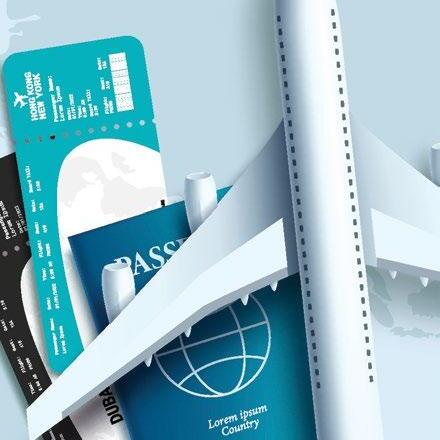COP29:

THE MIDDLE EAST’S

COP29:

THE MIDDLE EAST’S
MEET THE PIONEERS AND VISIONARY LEADERS INVESTING IN SUSTAINABLE INITIATIVES AND INNOVATIONS THAT CAN CHANGE THE WORLD.



6 I Sidelines
Thinking Green
By Claudine Coletti
18 I The World's Most Exclusive Club
From the fabulously rich to the fabulously famous, this remote patch of Montana wilderness has fewer than 900 homeowners, who are worth more than a combined $290 billion.
By Kerry A. Dolan with Stephen Pastis and Alicia Park
SUSTAINABILITY
The 29th edition of the UN’s Climate Change Conference is set to take place this year in Baku, Azerbaijan, from November 11 to 22. Here’s what you should know about this year’s summit.
By Joyce Abaño
I
MENA witnessed a surge in green bonds and sustainability sukuk issuances in the first eight months of 2024, demonstrating the growing global demand for sustainable finance.
By Mohammad Addam
While fast fashion continues to contribute to climate change, fashion weeks around the world are championing sustainable designers.
By Sara Junaid
I MENA’s
These are some of the green energy projects in the region that recently secured and disclosed significant investments.
By Engy Abdal Monem
30
Since COP28, which was held in the U.A.E. in December 2023, MENA has experienced a transformative shift in less than a year, with more businesses advancing their sustainability agendas.
By Rawan Hassan
Coinbase’s BRIAN ARMSTRONG created one of crypto’s central players, a fee-gushing monster that currently holds more than a tenth of all the Bitcoin ever minted. But now, in the cause of “decentralization,” he’s making a risky pivot. It’s easy to be an idealist when you’re a billionaire.
By Javier Paz and Steven Ehrlich


The 400 richest people in America are having a rollicking time in the roaring 2020s. In all, they’re worth a record $5.4 trillion, up nearly $1 trillion from last year. A dozen have $100 billion–plus fortunes, also a record. And admission to this elite club is pricier than ever: A minimum net worth of $3.3 billion is required, up $400 million since 2023.
Omar El Hamamsy, Group CEO of Orascom Development Holding, assumed office in 2020 during a global pandemic and steered the company from loss to annual profitability. Now, he’s focused on developing 60 million square meters of virgin land out of the group’s 101 million-square-meter land bank.
By Hagar Omran

Having already invested $50 billion in renewable energy projects across 70 countries and committed another $50 billion over the next decade, the U.A.E. is determined to be a world leader in sustainability. Amna bint Abdullah Al Dahak, the U.A.E.’s Minister of Climate Change and Environment, is spreading the message globally while moving forward with a national agenda.
By Claudine Coletti

48
For Maywand Jabarkhyl, CEO of FBMI and Tanweer Investments, sustainable investment is more than a positive move for the planet; it’s a life-altering opportunity for some of the world’s most vulnerable and disconnected people.
By Jamila Gandhi
Ibrahim Al Zu’bi, Group Chief Sustainability and ESG Officer at ADNOC, is on a journey to make one of MENA’s biggest energy giants one of the world’s most significant sustainability champions. He’s already had a measurable impact.
By Layan Abo Shkier
Iheb Triki and Mohamed Ali Abid, cofounders of Tunisian water-tech startup Kumulus Water, are revolutionizing access to sustainable clean drinking water by sourcing it from air. With their eyes now set on the Saudi market, they are poised for further expansion across MENA, Europe, and beyond.
By Rawan Hassan Mohammed




A target of 2,000 beds to serve the community of the Holy City of Al Madinah Al Munawwarah.








While the Middle East is admittedly well known for its fossil fuels, it is also in no way shying away from the world’s sustainability agenda. Still, there is no denying that there is work to be done. The region is not only one of the world’s most prolific producers of oil, it is also one of its biggest producers and consumers of natural gas. According to energy think tank Ember, in 2023, 16% of the world’s gas came from the Middle East and 76% of the Middle East’s energy came from gas. Other fossil fuels accounted for 18% of the region’s power. There is some diversity among countries, with Jordan producing 23% of its energy from wind and solar power on the one hand, and Bahrain, Iran, Iraq, Kuwait, Lebanon, Oman, Qatar, and Saudi Arabia including less than 1% of wind and solar power in their energy mixes on the other.
Despite this, the biggest economies in MENA have ambitious plans for the future. Last year concluded with COP28, which was hosted in the U.A.E. and saw world leaders come together to make some bold commitments. These included a $792 million loss and damage fund for vulnerable countries and the creation of a global stocktake that contains every element under negotiation and can be used to develop stronger climate action plans by 2025. While one year later the world may not feel as though it has moved very far, Asia is once again preparing to host the world’s leaders at COP29 in Azerbaijan in November. And as we wait to see what this year’s conference brings, this month we too turn our focus to sustainability and the leaders working to implement green practices in their policies and operations.
Our second annual list of the region’s sustainability leaders covers all of MENA’s major sectors: banking and financial services, environmental services, energy and utilities, food and agriculture, green finance, investment and holding companies, manufacturing and industrials, oil and gas, real estate and construction, technology and telecom, transport and logistics, and travel and tourism. It’s a comprehensive catalogue of the business heads leading initiatives to incorporate renewables, recycle waste, reduce emissions, and inspire sustainable innovation. Recognizing the importance of public and private sector cooperation, we also present a list of the government ministers leading from the top to mandate sustainability in business models.
Alongside this, we speak to a cross-section of leaders to delve into the details of how they’re making a difference. This includes Ibrahim Al Zu’bi, Group Chief Sustainability and ESG Officer at ADNOC, who is tasked with making one of the region’s biggest oil and gas companies also one of its most impactful renewable champions, and Amna bint Abdullah Al Dahak, the U.A.E.’s Minister of Climate Change and Environment, who’s representing the country globally to ensure it remains at the forefront of the sustainability agenda.
It’s a data-packed issue. I hope you enjoy learning more.
—Claudine Coletti, Managing Editor











Dr. Nasser Bin Aqeel Al Tayyar President & Publisher nasser@forbesmiddleeast.com
Khuloud Al Omian
CEO & Editor-in-Chief Forbes Middle East khuloud@forbesmiddleeast.com
Claudine Coletti Managing Editor claudine@forbesmiddleeast.com
Laurice Constantine Digital Managing Editor laurice@forbesmiddleeast.com
Fouzia Azzab Deputy Managing Editor fouzia@forbesmiddleeast.com
Amany Zaher Senior Quality Editor amany@forbesmiddleeast.com
Jamila Gandhi Senior Editor jamila@forbesmiddleeast.com
Rawan Hassan Senior Translator rawan@forbesmiddleeast.com
Samar Khouri Reporter samar@forbesmiddleeast.com
Cherry Aisne Trinidad Senior Online Editor aisne@forbesmiddleeast.com
Jason Lasrado Head of Research jason@forbesmiddleeast.com
Nermeen Abbas Senior Researcher nermeen@forbesmiddleeast.com
Elena Hayek Researcher elena@forbesmiddleeast.com
Layan Abo Shkier Research Reporter layan@forbesmiddleeast.com
Ruth Pulkury Senior Vice President - Business Development ruth@forbesmiddleeast.com
Fiona Pereira fiona@forbesmiddleeast.com
Karl Noujaim karl@forbesmiddleeast.com
Sarah Gadallah Hassan sarah.g@forbesmiddleeast.com
Maher El Zein maher@forbesmiddleeast.com
Upeksha Udayangani Senior Client Relations Executive upeksha@forbesmiddleeast.com
Tayyab Riaz Mohammed Financial Controller riaz@forbesmiddleeast.com
Soumer Al Daas Head of Creative soumer@forbesmiddleeast.com
Julie Gemini Marquez Senior Brand & Creative Content Executive julie@forbesmiddleeast.com
Mohammed Ashkar IT Manager ashkar@forbesmiddleeast.com
Habibullah Qadir Senior Payables and Accounting Manager habib@forbesmiddleeast.com
FORBES US
Chairman and Editor-In-Chief Steve Forbes CEO and President Michael Federle
Copyright© 2023 Arab Publisher House
Copyright @ 2023 Forbes IP (HK) Limited. All rights reserved. This title is protected through a trademark registered with the US Patent & Trademark Office Forbes Middle East is published by Arab Publisher House under a license agreement with Forbes IP (HK) Limited. 499 Washington Blvd, 10th floor, Jersey City, NJ, 07310 Founded in 1917
B.C. Forbes, Editor-in-Chief (1917-54); Malcolm S. Forbes, Editor-in-Chief (1954-90); James W. Michaels, Editor (1961-99) William Baldwin, Editor (1999-2010)
Abu Dhabi Office Office 216, Podium 2, Yas Creative Hub, Yas Island, Abu Dhabi, U.A.E. - P.O. Box 502105, info@forbesmiddleeast.com Dubai Office Forbes Middle East Studio, Warehouse No. 16, Garhoud, Dubai - U.A.E. | P.O. Box 502105, Tel: +9714 3995559 Qatar 14-DD2, Commercial Bank Plaza, West Bay, Doha, Qatar readers@forbesmiddleeast.com subscription@forbesmiddleeast.com
Queries: editorial@forbesmiddleeast.com For Production Queries: production@forbesmiddleeast.com

Check our Sustainability Policy



By Claudine Coletti

Sustainability
Having already invested $50 billion in renewable energy projects across 70 countries and committed another $50 billion over the next decade, the U.A.E. is determined to be a world leader in sustainability. Amna bint Abdullah Al Dahak, the U.A.E.’s Minister of Climate Change and Environment, is spreading the message globally while moving forward with a national agenda.
While the arid climates of the oil-rich Middle East may not seem the most natural habitat for a hub of climate change innovation, some recent moves from the U.A.E. have seen it emerge as a global leader in sustainable development. For example, at the end of February, the President of the U.A.E., His Highness Sheikh Mohamed bin Zayed Al Nahyan, launched the Mohamed bin Zayed Water Initiative to confront the urgent challenge of global water scarcity. According to UNICEF, up to four billion people across the world already experience water scarcity at least once a month, and half of the global population could be under water-stressed conditions by 2025. It plans to target investment, accelerate innovation, and expand international cooperation to create solutions to the problem.
It kicked off these intentions just a few days later when it partnered with the XPRIZE Foundation to launch a five-year global competition, XPRIZE Water Scarcity, which has a $119 million prize fund thanks to a $150 million investment from the Mohamed bin Zayed Water Initiative. The goal? To entice teams of inventors and innovators to generate new seawater desalination technologies that could increase our access to clean water.
“The challenge is to help us understand how we can improve our water security in naturally water-scarce environments without having any negative environmental implications,” explains Amna bint
Abdullah Al Dahak, the U.A.E.’s Minister of Climate Change and Environment. “With that comes another focus to launch grants and research and also attract the small solutions that might need a little bit of push or a little bit of support so that they can prove the concept and result in a scalable solution that can benefit the U.A.E. and worldwide.”
According to the minister, water scarcity and food security are among the most urgent climate-related issues currently facing the Middle East. On August 30 2024, she was among the high-level government representatives of the 10 BRICS countries, who gathered in Moscow this year for the BRICS High-Level Dialogue on Climate Change, where they debated the development of sustainable agriculture and the creation of a BRICS grain exchange, among other topics.
“We had very fruitful discussions, especially with me being the new kid on the block and getting to know everyone in the climate landscape,” Al Dahak shares. “When we talk about climate change, we always say what are the most vulnerable countries to climate events? The U.A.E. is already in a hot climate region. One of the challenges that we have been working with since the very beginning is growing our food in arid environments.”
But food and water security is far from just a Middle East problem. According to a 2024 report by the Food Security Information Network and the Global Network against Food Crises, “in 2023, nearly 282 million people or 21.5% of the analyzed population in 59 countries/ territories faced high levels of acute food insecurity requiring urgent food and livelihood assistance.” And this isn’t the only risk arising from increasingly extreme weather conditions and events being caused by climate change. “Climate crises come with so many other issues. Sometimes [people] are cut from the world for a day or several days, which means that their supplies are affected,” says Al Dahak.
• Minister of Industry and Advanced Technology; COP28 President, U.A.E. Special Envoy for Climate Change
Country: U.A.E.
As the U.A.E’s Minister of Industry and Advanced Technology, Al Jaber signed an MoU to establish the U.A.E.-France Bilateral Climate Investment Platform in February 2024, to accelerate the deployment of joint clean energy projects and investments. He has been at the helm of ADNOC since 2016, leading a $23 billion decarbonization strategy and new lowcarbon solutions business. He has also been the chairman of Masdar since 2014 and has served as the U.A.E.’s special envoy for climate change since November 2020. In December 2023, he became the first CEO to serve as COP President during COP28.
• Minister of State for Foreign Affairs and Climate Envoy
Country: Saudi Arabia
Al-Jubeir has been Saudi Arabia’s Minister of State for Foreign Affairs since 2018 and was appointed climate envoy in May 2022 following a royal decree. In May 2024, Al-Jubeir highlighted Saudi Arabia’s commitment to environmental protection through the allocation of $2.5 billion to the Secretariat of the Middle East Green Initiative. In June 2024, he announced a range of national initiatives to boost ocean sustainability, including an assessment and rehabilitation program for habitats in the Red Sea and the Arabian Gulf. The kingdom plans to plant 200 million mangrove trees by 2030 and 1.4 billion by 2100.
• Minister of Climate Change and Environment
Country: U.A.E.
Al Dahak became the U.A.E.’s Minister of Climate Change & Environment in January 2024. She leads environmental initiatives to achieve the U.A.E.’s Net Zero 2050 Strategy, enhance biodiversity, promote agricultural technologies, and ensure food security. She previously held roles at the Ministry of Education and served as the U.A.E.’s government spokesperson during the Covid-19 pandemic.
Abdulrahman AlFadley
• Minister of Environment, Water and Agriculture
Country: Saudi Arabia
AlFadley has been Saudi Arabia’s Minister of Environment, Water, and Agriculture since January 2015. In April 2024, he highlighted the country’s approach to addressing land degradation and desertification through the Saudi Green Initiative, grazing management, and a cloud seeding program. Saudi Arabia plans to expand vegetation cover, combat desertification, rehabilitate agricultural terraces, and improve water resource management and waste treatment through a circular economy. AlFadley is also chairman of the board for the General Food Security Authority, the Saudi Irrigation Organization, and the Agricultural Development Fund, among others.
Razan Al Mubarak
• Managing Director of the Environment Agency – Abu Dhabi (EAD)
Country: U.A.E.
Al Mubarak plays a key role in guiding the U.A.E. toward a more sustainable future while spearheading environmental protection, species conservation, and climate action across West Asia and globally. She has been serving as the President of the International Union for Conservation of Nature since 2021. She also served as a UN Climate Change High-Level Champion for the leadership team of COP28. In June 2024, she was appointed as Co-Chair of the Taskforce on Nature-related Financial Disclosures. Al Mubarak led Abu Dhabi’s commitment in reducing greenhouse gas emissions by 42% by 2030.
Yasmine Fouad
• Minister of Environment
Country: Egypt
Fouad was appointed as Egypt’s Minister of Environment in 2018 to lead a transformational change by creating a more business-oriented enabling environment. Fouad led the presidential initiative “Live Green” between 20202023. In September 2024, Egypt’s Ministry of Environment, the Global Fund for Coral Reefs, USAID, and UNDP partnered to launch the Egyptian Red Sea Initiative, aiming to protect 99,899 hectares of coral reefs.
The U.A.E. took a significant step in addressing this in December 2023, when it hosted COP28, which saw several landmark agreements, including the creation of a $792 million ‘loss and damage fund,’ which was first noted on the COP agenda in 1991 but was finally signed off in Abu Dhabi on the first day of COP28. The fund—which includes $100 million from the U.A.E.—will be allocated to vulnerable countries and communities to help them deal with the repercussions of climate change and support them in building resilience.
Al Dahak explains that this commitment, while a “dream come true” for vulnerable nations, was also an acknowledgment of the importance of climate financing. “It is very high on the agenda and we know it’s high on the agenda with COP29 as well,” she adds. “That will only drive further focus from the international community on the importance of bridging the gaps we have currently.”
As she continues to find her voice within the life-changing climate conversations among the world’s most influential leaders, Al Dahak is clear that she advocates for nature-based solutions, with her foundations rooted in academia and science. “When I was in fourth grade, whenever anyone asked me what I wanted to do I would always say, I want to be a scientist. In a way, I feel like I accomplished that, and now I’m putting that scientific approach into action in a way that will serve not only the national agenda but also the international agenda,” she says.
Having studied computer science and computer engineering, Al Dahak joined the U.A.E.’s Ministry of Education, working in the care and capacitybuilding sector and innovation and entrepreneurship. During the global Covid-19 pandemic, she became the U.A.E. government’s spokesperson. She was appointed to her current role on January 6, 2024. “I’m a hybrid model,” she laughs. “I’ve got the best out of the science and the best out of the engineering and married them in a way that I don’t think the outcomes could have been better for me.”
Still, her passion for nature and science is very much at the forefront,
which clearly comes across as she highlights some of the areas in which the government is investing heavily. This includes the planting of mangrove trees in the U.A.E. and other countries, which can remove four times more CO2 from the atmosphere per hectare than tropical rainforests.
In May 2024, ground was broken on the Mohamed bin Zayed-Joko Widodo International Mangrove Research Centre on the island of Bali in Indonesia. The U.A.E. has invested $10 million in the initiative as part of a commitment to grow 100 million mangrove trees by 2030. “I believe that in nature there is an abundance of solutions, we just have to understand how they work and how we should work with them,” explains Al Dahak.” “We know that the mangrove system is one of the best nature-based solutions. We have mobilized resources and actions along with other countries to ensure that this system is rehabilitated and restored, across not only the U.A.E. but across all possible environments.”
At the BRICS meeting in August, the minister confirmed that the U.A.E. has so far invested around $50 billion in renewable energy projects across 70 countries and has committed another $50 billion over the next decade. However, while this is a clear and positive step toward a greener future, the country remains one of the world’s largest producers of oil and gas. According to the Energy Institute Statistical Review of World Energy, the U.A.E. produced 4.1% of the world’s oil in 2023, making it the eighth-biggest producer in the world.
In December 2023, COP28 President Sultan Al Jaber noted the importance of continuing to supply fossil fuels as needed while also investing in the move to renewables. “Figuring out a fair, just, equitable, responsible, and wellmanaged energy transition is essential for economic and climate progress,” he said in his closing statement. “We must meet the energy demands of our growing populations while providing access to the 800 million people that don’t have access to energy today. We must rapidly build the clean energy system of the future when we
decarbonize the system of today.”
Al Dahak explains that while the world must transition away from fossil fuels, doing so too quickly could have a detrimental impact. “We need to take into account the fact that we need to ensure that there is energy security for countries across the world. Economic development depends on that. People’s livelihoods depend on that,” she emphasizes. “We have to be practical and we have to be pragmatic, but we also have to be innovative.”
That innovative mindset includes working closely with the private sector, investing in new technology and entrepreneurship, but also incentivizing businesses to implement sustainability into their operations. Regulation plays an important role in this change, as does effective enforcement.
In August 2024, the U.A.E. issued its new Federal Decree-Law on the Reduction of Climate Change Effects, which comes into effect on May 30, 2025. The law mandates reporting and emission reduction obligations for public and private entities. Penalties for violating any provisions listed in the law can be punished by fines of a minimum of $13,600 and a maximum of $545,000.
“I think we are one of the first countries to introduce a law with consequences on businesses and sectors if they don’t implement the regulations that are required,” says Al Dahak. “You must strike a balance between incentive and firm regulations. So instead of compelling businesses to act you should also provide an effective incentive. If we can make that value add for the businesses and industries very clear and we show them the direction of the government then they will come on board by default.”
The mother of six is also keen to emphasize the importance of onboarding the education system to ensure that the next generation continues to lead the way to a greener future. While the commitments made so far have set out the intentions, all stakeholders and communities need to be empowered to take action. “We can never say enough is being done. We can always say what else can we do,” she concludes. “We have a responsibility on our shoulders to continue that leadership and ensure that the world continues moving in that direction.”

• Chairman of the Environment Authority Country: Oman
Al Amri has been the chairman of the Environment Authority in Oman since its establishment in 2020. In February 2024, he highlighted the country’s initiative to plant 10 million trees and the recent inauguration of the 500-megawatt Ibri solar power plant in line with Oman’s Vision 2040, during the UN’s Environment Assembly, held in Nairobi, Kenya. Al Amri oversaw the signing of a five-year cooperation program between the Environment Authority and the Global Green Growth Institute in September 2024 to provide access to nature-based solutions, land reclamation, and green finance.
• Minister of Environment Country: Jordan
Radaideh assumed his current role in 2021. In August 2023, the Ministry of Environment announced that Jordan’s goal to reduce its greenhouse gas emissions by 31% by 2030 requires an estimated $10.6 billion in investments. In July 2024, Jordan secured a $45 million funding grant from the Green Climate Fund for its Integrated Landscape Management Initiative project. Radaideh was previously the manager for environment, energy, and water at the Royal Hashemite Court and CEO at SEE NEXUS in Dubai, which worked on sustainable city projects.
• Minister of State for Foreign Trade Country: U.A.E.
Al Zeyoudi was appointed to his current role in July 2020 where he oversees the development of non-oil foreign trade and global trade partnerships. He is at the forefront of the U.A.E.’s economic diversification and enhancing climate investments through economic agreements with nations, most recently Australia, Chile, and India. In the first half of 2024, the U.A.E.’s non-oil trade reached $379.8 billion, an 11.2% increase compared to H1 2023. Al Zeyoudi was previously the U.A.E.’s Minister of Climate Change and Environment from 2016 to 2020. He also held roles at the Ministry of Foreign Affairs and Masdar.
• Minister of Environment and Climate Change Country: Qatar
Al Subaie was appointed as Qatar’s Minister of Environment and Climate Change in January 2024, before which he had been the Minister of Municipality since 2021. His responsibilities include implementing the National Climate Change Action Plan through climate action initiatives. In June 2024, he pointed out that the ministry has many environmental projects and strategies in place, focusing on biodiversity, and natural and terrestrial environments, along with continuing with the afforestation initiatives. Al Subaie stated that the country has designated 27% of its terrestrial area as natural reserves, along with 2% marine reserves.
Mohamed AbdAllah, CEO of Vodafone Egypt, shares insights into the company’s 25 years of success and looks ahead to a future of meaningful connectivity, digital innovation, and impressive customer experience.

In 1998, Vodafone entered the Egyptian market and began making an impact on ground. A quartercentury on, under the leadership of CEO Mohamed AbdAllah, the company continues to build on its legacy through a customer-centric strategy, technological innovation, and significant investment that enables the telecom giant to boost connectivity and enhance lives across the nation.
To date, Vodafone Egypt has invested more than $9.5 billion to connect over 48 million customers and retain its position at the forefront of technological advancement. Over the years, the company has consistently invested in network infrastructure and played a lead role in the evolution of SMS, 3G, 4G, and paving the way to 5G.
Now, as a telecom front-runner, the company is revolutionizing connectivity by enabling its customers to consume more than two billion gigabytes of data annually. This unprecedented capacity transforms how individuals and businesses connect, communicate, and interact. Furthermore, its investment approach and strategy have driven strong financial performance, with total revenues surpassing $1.5 billion in fiscal year 2024, marking a 37.2% growth year on year.
According to the CEO, Vodafone Egypt’s financial success reflects unwavering customer trust in the company and its commitment to digital innovation. Every employee at the company is part of its mission to use technology to connect for a better future.
“We constantly seek new ways to leverage digital technology to improve the quality of life for those connected and unconnected,” explains AbdAllah. The Vodafone Egypt Foundation alone has invested over $40 million in projects improving the lives of 11 million Egyptians since its establishment in 2003.
Across Vodafone Egypt’s initiatives, AbdAllah’s purpose shines through. “My journey has evolved from focusing on personal development and success to realizing a broader purpose centered around making a positive impact on the lives of those around me,” says the business leader. “Leading an organization of 10,000 employees serving over 48 million Egyptians is a humbling experience. It places me in a unique position where our impact extends beyond our
immediate circle, touching the lives of individuals nationwide.”
Through its projects and investments, Vodafone Egypt strives to uplift all socioeconomic groups by ensuring equal access to essential health and education services. Notable projects include the Universal Health Insurance scheme and collaboration with Egyptian University Hospitals, providing Egypt’s first cloud-based healthcare services. These projects currently serve over six million citizens and aim to impact another 26 million. Meanwhile, Vodafone Egypt’s Foundation offers a free educational platform, Ta3limy, which caters to more than 2.5 million beneficiaries, and its partnership with Magdi Yacoub Heart Foundation has facilitated 365 heart surgeries for children in need.
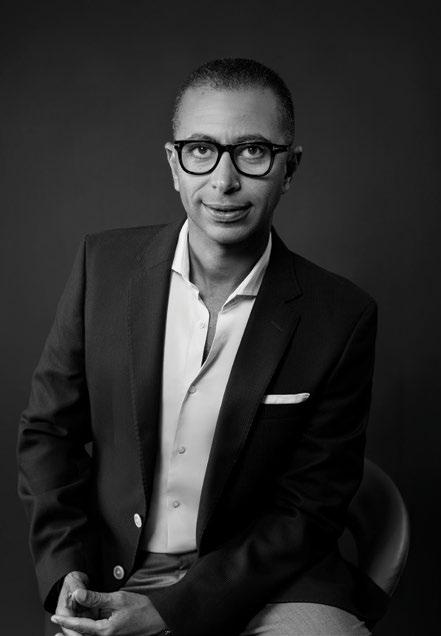
Leading an organization of 10,000 employees serving over 48 million Egyptians is a humbling experience. It places me in a unique position where our impact extends beyond our immediate circle, touching the lives of individuals nationwide.
“We envision a future where every Egyptian, irrespective of background, can thrive in a connected world,” says the chief executive. “Our commitment is to create simple, innovative products and services that make life easier and more connected for everyone.” Indeed, for AbdAllah, connectivity is critical; it facilitates Egypt’s advancement in the digital world and the functional base upon which products, services, experiences, and entire businesses can evolve and grow.
To propel connectivity to a new level, Vodafone Egypt invests in cuttingedge digital services and strives to stay ahead of customer needs, anticipating trends and demands before they arise. With AI advancing rapidly and Gen Z becoming a major customer segment, Vodafone Egypt has pioneered digital services, positioning itself as Egypt’s top entertainment hub. Vodafone Cash was launched in response to the demand for financial inclusion. Today, it is the leading e-wallet in Egypt with over 20 million users. For its part, Ana Vodafone
digital app records around 15 million active users monthly, giving them control over their customer experience.
From a business perspective, especially post-COVID, companies have recognized the need for digital solutions to maintain operations and connectivity. Vodafone Egypt has long been responding to that need by providing digital solutions and a suite of software-as-a-service products through V-Hub, Vodafone’s digital advisory platform, helping businesses, big or small, run efficiently.
As the company has evolved, so too has its CEO. AbdAllah joined Vodafone Egypt at the beginning of its journey and worked his way up to the top. “I started at a company poised to become one of Egypt’s largest, beginning in a small Maadi apartment with just 300 employees,” explains the CEO. “The startup environment offered an incredible learning experience, allowing me to innovate and collaborate with diverse professionals,” he adds. The company
initially aimed to reach 100,000 subscribers within a year but achieved the goal in just eight weeks, drawing significant attention from Vodafone’s U.K. headquarters. “This experience was transformative, helping me learn and grow rapidly,” he recalls.
AbdAllah’s own experience at Vodafone has led to his firm commitment to support colleagues and nurture talent. Vodafone Egypt’s 25 years of success have been driven by dedicated employees – a workforce he describes as a “close-knit family.” The company is inclusive, with women holding over 40% of leadership positions and comprising over 30% of its employees under 30. “This unique culture has made Vodafone Egypt the employer of choice for many prominent leaders,” says the CEO. Looking to the future, AbdAllah continues his mission to evolve Vodafone Egypt from a connectivity provider to an integrated lifestyle partner. “Our new strategy focuses on embedding ourselves into every aspect of our customers’ lives,” explains the chief executive. “We aim to be there when they connect with loved ones, consume content, make payments, and seek education or entertainment.”
For the CEO, innovation is essential for future success and delivering a seamless digital experience.
“Our respect for the needs of our customers, communities, and people guides us forward,” he says. “My goal has always been to drive positive change and inspire through leadership, believing strongly in the power of technology to enrich lives.” https://vodafone.com.eg/


From the fabulously rich to the fabulously famous, this remote patch of Montana wilderness has fewer than 900 homeowners, who are worth more than a combined $290 billion.
NOVEMBER 20–21, 2024
Hockey sticks and techtonic shifts—change happens gradually then all at once. Conventional models of leadership, business and entrepreneurship now face storms of transformations: new administrations and elections worldwide, geopolitical and trade tensions, volatile economic conditions, energy transitions, wildly accelerating tech—the list goes on. Amid this tumult, the 22 nd Forbes Global CEO Conference will gather insights from top CEOs, thought leaders, entrepreneurs and investors as they create new paradigms to move forward, survive and thrive.
For more information, please visit forbesglobalceoconference.com or email info@forbesasia.com.sg
CO-HOST SPONSORS
PRINCIPAL SPONSOR
CORPORATE SPONSORS
SUPPORTING SPONSORS
ive years ago, tech entrepreneur and Shark Tank cohost Robert Herjavec fell in love with the Yellowstone Club. Located about an hour’s drive south of Bozeman, Montana, and some 50 miles north of Yellowstone National Park, the club owns a private mountain with more skiable acres than Killington, Stowe or any other resort on the East Coast. “Amazing place for families and kids,” Herjavec raves, noting that his 6-year-old twins already ski better than his wife, Kym. The couple, who met on Dancing with the Stars, first bought a condo at the club, which is adjacent to the Big Sky ski resort, in 2019 before deciding to build their own place. They spent three years and $28 million (including furnishings) on a 13,500-squarefoot, eightbedroom dream house that features cathedral views of the Rockies. “We have lots of homes. This is our favorite,” Herjavec says. He is not alone. Herjavec is one of 885 members of the ultraswank Yellowstone Club: 15,000 mountainous acres of world-class skiing, golfing, fly fishing and horseback riding. There is a movie theater for kids, a concert venue that has hosted acts including Sting, Norah Jones and James Taylor, and even “sugar shacks” stocked with all sorts of free stuff like candy bars, snacks and hot soups sprinkled across the mountain and greens. The club’s mountain has 21 chairlifts, one gondola, 2,900 skiable acres—and no lift lines. North Carolina real estate billionaire Roy Carroll, who has a house on the same road as Herjavec, says it’s not unusual to be the only person on a run.
“They hit the sweet spot for a multigenerational destination . . . for people aged 8 to 80,” says Carroll, 61, who built a $37 million (assessed value) home there with room for future grandchildren. “I built a house we wouldn’t outgrow for 50 years.”



Perhaps the club’s biggest draw is exclusivity. Applicants need gold-plated references and must submit to a detailed background check. Membership is capped at 914 to prevent over- crowding. Admission requires buying land, a home or a condo. Even the least expensive undeveloped plot will set you back $10 million. Condos start at just under $7 million but average $15.5 million; homes cost $20 million or more. Then there’s a $500,000 refundable deposit and annual dues of $78,000, which cover unlimited skiing and golfing for your immediate family (including parents and grandchildren, but not adult siblings) plus 140 guest days a year. Almost as difficult as getting in is figuring out who else belongs. Justin Timberlake and Jessica Biel are members, as is Mark Zuckerberg. Ditto Tom Brady. Many try to keep their slice of paradise private by owning via LLCs. One knowledgeable local estimates the club has between 50 and 80 billionaire members.





had to file for bankruptcy in 2008. Boston-based real estate investment firm CrossHarbor Capital—alongside about 40 individual Yellowstone Club members—bought it out of bankruptcy in 2009 for $115 million. CrossHarbor managing partner Sam Byrne says they’ve put more than $1 billion into it over the past 15 years, and plan to keep spending more. Why not? Those early backers have already earned 4.5 times their invested capital. Says Byrne, “What we offer is not replicated anywhere.”
FROM RICHEST TO “POOREST,” HERE ARE THE FORTUNES OF 19 BILLIONAIRE MEMBERS OF THE YELLOWSTONE CLUB. THERE ARE UNDOUBTEDLY MANY MORE. Source:



The 29th edition of the UN’s Climate Change Conference is set to take place this year in Baku, Azerbaijan, from November 11 to 22. Here’s what you should know about this year’s summit.
The 29th Conference of Parties (COP29) is a gathering of world leaders, negotiators, climate activists, civil society representatives, youth, and CEOs to jointly address the challenges of climate change, assess the progress in tackling it, and discuss plans and funds for countries to transition towards clean energy. This would include actions from cutting greenhouse gas emissions to financing climate change mitigation in developing countries.
The countries that signed the UN Framework Convention on Climate Change (UNFCCC) treaty agreed in 1994 to attend this event every year, with the presidency and venue rotating among five recognized UN regions. The first UN climate conference was held in Berlin, Germany, in 1995. In 2020, the 26th meeting was postponed due to the COVID-19 outbreak.
The climate conference will kick off with the official opening on November 11, followed by the world leader’s climate action summit for two days, from November 12 to 13. In the following days, the summit will tackle discussions on finance, decarbonization, and adaptation, among many others. The overall tone is to meet the goals of the 2015 Paris Agreement and keep the 1.5°C global warming temperature limitation within reach.

The venue for this year’s conference will be the Baku Stadium. More buildings will be set up around it so that all the plenary sessions of the conference can be held on one site. Mukhtar Babayev, COP29 PresidentDesignate and Azerbaijan’s minister of Ecology and Natural Resources, said at this year’s conference, “previous promises need to be delivered, not re-interpreted and fulfilled, not re-negotiated.”
The UN climate conference will also result in new agreements and treaties, as well as review the contributions of each of the parties. Members who are also party to the Paris Agreement usually submit Nationally Determined Contributions (NDCs) or each country’s plans to reduce emissions and adapt to the impacts of climate change.
Here are some commitments that are expected to be adopted at COP29:
• Climate finance. Building on the $100 billion per year committed in 2009 by developed countries to support climate action in developing nations, a new finance goal, known as the new collective quantified goal, is set to be adopted at COP29.
• Updated NDCs. NDCs, which are submitted every five years to the UNFCCC secretariat, are climate action plans and approaches discussed by more than 50 development and implementing organizations to support countries. The next round of NDCs is due to be communicated between November 2024 and February 2025. The 2025 NDCs, with a time horizon
of 2035, are expected to determine whether the world can get on an emissions trajectory in line with the temperature target of the Paris Agreement and whether countries can build up adequate resilience to climate change.
• Biodiversity and climate. With finances and funding to be tackled in this year’s COP, an alignment of biodiversity and climate is expected. Biennial Transparency Reports (BTR) will also be assessed for publication. Under the Enhanced Transparency Framework, Parties to the Paris Agreement are required to submit BTR every two years, with the first submission due by December 31, 2024.
2023: The COP28 in Dubai, U.A.E., closed with an agreement that signals the “beginning of the end” of the fossil fuel era and the conclusion of the first global stocktake, an assessment of the world’s efforts to address climate change.
2022: The COP27 in Sharm El-Sheikh in Egypt came up with an agreement to create a fund for loss and damage for vulnerable countries dealing with climate disasters, making it a futurestanding agenda item.
2021: The COP26 in Glasgow in the U.K. ended with countries agreeing for the first time to halt the global financing for new fossil fuel projects by the end of 2022 and steer spending into clean energy instead.











MENA witnessed a surge in green bonds and sustainability sukuk issuances in the first eight months of 2024, demonstrating the growing global demand for sustainable finance. The GCC countries and their financial institutions led the charge with several milestone issuances that underlined both regional and international appetites for green and ethical investments.
Qatar’s First Green Bonds: $2.5 billion
In May, Qatar’s Ministry of Finance set a landmark by issuing its first green bonds worth $2.5 billion. Split into two tranches—$1 billion with a five-year maturity and $1.5 billion with a 10-year maturity— the bonds secured spreads of 30 and 40 basis points over U.S. Treasuries, respectively. It achieved the lowest spread ever for any bond issuer in the Middle East, Central and Eastern Europe, or Africa. With a peak subscription demand reaching over $14 billion, and a coverage ratio surpassing 5.6 times.
alrajhi bank
Sustainable Sukuks:
$2 billion
Aiming to boost liquidity for sustainability and social projects under Saudi Arabia’s Vision 2030, alrajhi bank issued the first-ever Sustainable Additional Capital (AT1) Sukuk in U.S. dollars in May, raising $1 billion at a profit rate of 6.375% annually. The issuance was heavily oversubscribed, with demand exceeding $3.5 billion. Also in March 2024, the bank issued a $1 billion U.S. dollar denominated senior unsecured sustainable Sukuk, with a fiveyear maturity and a profit rate of 5.047%.
Abu Dhabi’s clean energy giant, Masdar, raised $1 billion through a dual-tranche

green bond issuance in July, marking its second green bond launch. The $500 million tranches with fiveyear and 10-year maturities were priced at 4.875% and 5.25%, respectively, with strong regional and international demand driving an oversubscription rate of 4.6 times, and a peak subscription demand reaching $4.6 billion. Masdar plans to use the proceeds for greenfield renewable energy projects, underscoring its aggressive growth strategy in raising up to $3 billion in green bonds toward a 100GW renewable energy portfolio by 2030.
DIB’s
In February, Dubai Islamic Bank (DIB), issued its third
Sustainable Sukuk, a $1 billion five-year senior issue with a profit rate of 5.243% per year, and a spread of 95 basis points over five-Year U.S. Treasuries. The issuance oversubscribed 2.5 times, with orders exceeding $2.5 billion. The Sukuk was listed on Euronext Dublin and NASDAQ Dubai.
In March 2024, The Government of Sharjah issued a $750 million 12-year U.S. dollar-denominated 144A/Reg S senior unsecured sustainable bond. The sustainable bond attracted strong investor interest, with an order book exceeding $4 billion and international investors accounted for 67% of total demand. The bond was priced
at a spread of 195 basis points over U.S. Treasuries.
In June, Emirates Islamic, a subsidiary of Emirates NBD, issued its maiden $750 million sustainability Sukuk under its $2.5 billion Certificate Issuance Programme. With a profit rate of 5.431% annually and a spread of 100 basis points over five-year U.S. Treasuries, the Sukuk saw strong demand from global investors, as 44% of the demand came from outside the MENA region, leading to an oversubscription of 2.8 times.
In June, NBK made a groundbreaking debut in green finance with its $500 million green bond, marking Kuwait’s first green issuance. With a six-year maturity and a call date after five years, the bonds drew peak orders of $1.5 billion, reflecting a threetime oversubscription. U.S. investors accounted for 49% of the demand, followed by Middle Eastern (26%), British (18%), European (5%), and Asian investors (2%).
In August, Warba Bank listed $500 million in sustainable
trust certificates on Nasdaq Dubai, marking the first-ever sustainability Sukuk issued in Kuwait as part of the bank’s $2 billion trust certificate issuance program. The Sukuk was oversubscribed 3.6 times with the orders reaching $1.8 billion. The five-year certificates aim to fund eligible sustainable projects, aligning with international sustainability objectives. In September, the bank listed the sustainable sukuk on the London Stock Exchange as well.
AIP, a subsidiary of Aldar Properties, issued a $500 million green Sukuk in May, marking its second foray into green sukuk issuance as part of its $2 billion trust certificate issue program. With a 10-year maturity and a coupon rate of 5.5%, the issuance was oversubscribed four times, reflecting strong demand from both regional and international investors. The funds will be used to refinance existing debt and extend debt maturity.
In January 2024, QIIB became the first institution in Qatar to issue a sustainable Sukuk, raising $500 million through the sustainable “Oryx” Sukuk. The fiveyear Sukuk, part of QIIB’s $2 billion Sukuk program, attracted significant investor interest, with an order book exceeding $4 billion. The Sukuk was priced at a spread of 120 basis points above the five-year U.S. Treasury rate, with a final yield of 5.247% annually, and listed on the London Stock Exchange.
While fast fashion continues to contribute to climate change, fashion weeks around the world are championing sustainable designers.
Concerns about the textile industry as a major pollutant have rapidly entered the mainstream conversation on climate change. Fast fashion, characterized by cheaply made garments that quickly become outdated as trends shift, is often at the center of these discussions. The UN Environment Program reports that the textiles sector as a whole is responsible for nearly 8% of the global greenhouse gases and is responsible for 9% of the microplastic pollution in oceans. In response to this alarming trend, various brands and events are stepping up their efforts toward sustainability.
In Dubai, the Arab Fashion Council is spotlighting several sustainable designers at Dubai Fashion Week. Among them are Dominic Nowell-Barnes’
The Giving Movement, Eric Mathieu Ritter’s Emergency Room, and Thailand’s PIPATCHARA. Launched in Dubai in 2020, The Giving Movement uses recycled polyester, recycled crinkled nylon, waste plastic water bottles, and organic bamboo and cotton in its pieces, with $4 from each purchase given to child welfare and humanitarian aid, raising a total of $7.8 million as of June 2024. Meanwhile, founded in Beirut in 2018, all Emergency Room garments are made of upcycled materials, such as locally sourced vintage or deadstock fabric. In February 2024, Emergency Room partnered with smartphone brand Nothing for their


sustainable collection at the Dubai Fashion Week. Thailand-based accessory brand PIPATCHARA was also founded in 2018, offering 100% handmade designs such as bags crafted using plant-based materials, and recycled bottle caps.
Elsewhere in the world, Paris Fashion Week in March 2024 boasted of its own fair share of sustainable fashion designers. Stella McCartney, daughter of Beatles’ frontman Paul McCartney, showcased her eco-friendly designs at Paris Fashion Week. Her collection was made from 90% ecoresponsible materials, including vegan leather. In the same month, Marine Serre held her showcase of
upcycled clothing at Ground Control, a postal sorting center once owned by railway company SNCF, now transformed into a food hall.
In June 2024, Berlin Fashion Week (BFW) teamed up with Copenhagen Fashion Week (CPHFW) to introduce new sustainability requirements to nearly 35 brands on the official BFW. Developed by CPHFW, these standards aim to encourage fashion brands to adopt more environmentally conscious practices. While minimum standards have been in place at CPHFW for three seasons, BFW’s adoption will involve a phased implementation, with full effect expected by February 2026.
Meanwhile, in August 2024, the Mercedes-Benz Fashion Week Kuala Lumpur (MBFWKL) 2024 was themed “Re:Imagine,” to celebrate innovative designs and sustainable practices. Designers that took part included A-JANE’s and NOIZ’s Alice Chang, Ellie Lim of EL, Justin Yap, and Celest Thoi. In the same month, Amsterdam Fashion Week (AFW) announced a collaboration with Hyundai Motor Europe whereby Hyundai would support MARTAN, a fully circular brand. MARTAN upcycles waste textiles from the luxury hotel industry into ready-to-wear clothing. In turn, Hyundai will release a collection made from its latest EV model, INSTER’s seat material, a fabric created from recycled PET bottles.
Around 15% of the expected energy investments in the Middle East this year are allocated to clean energy projects, and this is expected to more than triple by 2030, according to the International Energy Agency. These are some of the green energy projects in the region that recently secured and disclosed significant investments.

Over $66 billion in agreements for Egypt’s green projects
At the Egypt-EU Investment Conference 2024 in Cairo last June, several agreements were signed for renewable energy production. Among them were four green ammonia agreements signed by the Sovereign Fund of Egypt and the Suez Canal Economic Zone, including an $11 billion deal with German’s DAI Infrastruktur GmbH for a project in East Port Said, a $4.25 billion deal with India’s Ocior Energy at Sokhna Port targeting the European market, a $3.46 billion deal with French’s Voltalia and TAQA Arabia for a project at Sokhna port, and a $14 billion deal signed between a consortium of bp, Masdar, Infinity Power, and Hassan Allam Utilities to develop green ammonia in Sokhna Port. Another agreement was signed between the General Authority for Alexandria Port and Egypt’s New and Renewable Energy Authority and a consortium led by Belgium’s DEME HYPORT
Energy to establish HYPORT Gargoub, a green hydrogen production facility located west of Matrouh. The project, requiring a total investment of $25.7 billion, will be carried out in three stages, with the first phase aiming to produce approximately 320,000 tonnes of green ammonia per year.
The General Authority for Red Sea Ports and the New and Renewable Energy Authority signed an agreement with a consortium of France’s EDF Renewables and the Egyptian-Emirati company, Zero Waste, to produce green hydrogen and its derivatives, as well as green ammonia in Ras Shukeir, Hurghada, with projected total investments of $7.5 billion. These include nearly $2.2 billion for the project’s initial phase, which has an annual production capacity of green ammonia exceeding a million tonnes.
In April 2024, Hydrom signed two green hydrogen
projects in Dhofar worth $11 billion. The first project, in collaboration with a consortium led by Electricité de France S.A., aims to produce approximately 178,000 tonnes of green hydrogen annually by 2030. The second was signed with Actis and Fortescue to produce up to 200,000 tonnes of green hydrogen annually.
In May 2024, Masdar, Infinity Power, and Hassan Allam Utilities signed a land access agreement with the Egyptian Government for a 10 GW onshore wind project valued at over $10 billion. The agreement gives the consortium access to a 3,025 km2 area of land located in West Suhag. The project, which is set to be one of the largest in the world, will generate 47,790 GWh of clean energy annually and cut Egypt’s carbon emissions by around 9% by displacing 23.8 million tonnes of carbon
dioxide each year. The initial agreement of the project was signed at COP27 in late 2022.
In June 2024, the Saudi Power Procurement Company signed power purchase agreements with a consortium of ACWA Power, the Water and Electricity Holding Company (Badeel), and Saudi Aramco Power Company for the development and operation of three new solar photovoltaic projects in Saudi Arabia- Haden, Muwayh and Al Khushaybi, with a combined value of $3.3 billion. The new solar PV facilities are expected to contribute an additional capacity of 5,500 MW of renewable energy to the national power grid once operational in the first half of 2027.
In January 2024, the renewable EPC division of India’s Larsen & Toubro’s Power Transmission & Distribution business secured an engineering, procurement, and construction contract for a 1,800 MWac solar photovoltaic plant in Dubai, with a value ranging from $1.2 billion to $1.8 billion. The plant, part of the sixth phase of the Mohammed bin Rashid Al Maktoum Solar Park, will cut carbon emissions by about 2.4 million tonnes annually.

Since COP28, which was held in the U.A.E. in December 2023, MENA has experienced a transformative shift in less than a year, with more businesses advancing their sustainability agendas.
COP28 in December 2023 marked a pivotal moment, concluding the first global stocktake of climate efforts under the Paris Agreement. Despite ongoing initiatives, global progress had remained slow across key areas, from reducing greenhouse gas emissions to building resilience against climate impacts and allowing more financial support. In response, the MENA region and other global players ramped up their commitment to sustainability.
Reflecting this increased focus, four in five executives in the region report that their companies now have a formal sustainability strategy in place, according to PwC’s Sustainability in the Middle East 2024 survey, with more than half stating that this strategy is fully integrated across their organization. The percentage of respondents citing a lack of leadership buy-in has nearly halved, dropping to just 16% in 2024.
Given that businesses in the region operate in areas increasingly impacted by rising temperatures, and in economies with national agendas focused on diversification and decarbonization, more regional CEOs (15%) identified climate change as a major concern compared to the global average (12%), according to PwC’s 2024 CEO Survey: Middle East findings. Additionally, they were more likely to view it as a key driver for corporate transformation in the next
Eight in ten companies have a formal sustainability strategy (up from 64% in 2023).
Over 50% have fully embedded their sustainability strategy across their organization.
One in two companies now have a CSO or plan to appoint one in the next 12 months.

One in three companies say a lack of internal skills and sustainability expertise remains the biggest challenge.
2.5X more companies plan to access green loans and bonds, up 20% since 2023.
Source: PwC’s Sustainability in the Middle East 2024 Survey
three years (36% versus 30%). A growing trend sees companies establishing top-level sustainability roles, with nearly half (48%) of respondents indicating that their companies now either have a Chief Sustainability Officer or plan to appoint one within the next year. Additionally, CEOs continue to lead sustainability initiatives in about one in six companies.
Another notable progress is the significant rise in the adoption of net-zero greenhouse gas emission targets. Half of the companies surveyed in the region have now committed to net zero, with an additional 26% actively working towards making such a pledge. Leading the charge are airlines like Etihad Airways, oil and gas giants such as Saudi Aramco and
ADNOC, and energy and utilities firms like Saudi’s ACWA Power and stc Group. Logistics leaders like Kuwait’s Agility are also making strides in this critical area of sustainability.
Driven by heightened transparency demands from regulators and investors, there has been a noticeable increase in sustainability reporting, with two-thirds of companies in the Middle East now producing sustainability reports or key metrics. However, 95% of investors covering Middle Eastern companies believe corporate sustainability reports contain unsupported claims, according to PwC’s 2023 Global Investor Survey. Sustainability reporting is largely voluntary in the region, with 66% of companies producing reports in the region following the
Global Reporting Initiative framework. Globally, generative AI is driving innovation and efficiency across industries, but in the Middle East, AI deployment for sustainability is still in its early stages. Most companies are using the technology to enhance capabilities like data analysis and reporting, rather than for deeper operational improvements, such as optimizing supply chains or advancing circular economy models.
A key development over the past year has been the emergence of new funding sources for sustainability efforts. While self-funding remains common, more companies are considering green loans (34%) and capital markets options like green or blue bonds (33%). This reflects broader trends, with the issuance of green bonds and sukuks in the Middle East more than doubling to $24 billion in 2023, according to PwC’s Middle East Economy Watch.
Despite half of the region’s sustainability leaders seeing cost savings as a major driver for sustainability, one in five remains uncertain about the return on investment. This concern is echoed in the PwC 2024 CEO Survey, which shows that 30% of Middle Eastern companies view inadequate returns on climate-friendly investments as a significant challenge, with only 37% willing to accept lower returns for such investments.
Ed
McLaughlin, President
and Chief Technology Officer at Mastercard, explains how technology is powering much more than just payments.
The pace at which technology is evolving all around us remains a modern-day marvel. Even small transformations can enable massive progress, significantly accelerating the rate of change. Take payments as an example. The way we pay for things is vastly different from the status quo just a few years ago.
AI, machine learning, cloud computing, tokenization, and blockchain are driving this shift. And to make sure that technology delivers impact, Mastercard is expanding and applying its vast capabilities to develop, enhance, and co-create solutions to solve a variety of problems in an everchanging environment.
The dynamic nature of the payments industry calls for eggs to be placed in different baskets, and Mastercard is doing exactly that by tapping into new payment flows. That means looking anew at how technology can further enhance acceptance, supply chains, cross-border remittances, businessto-business (B2B) payments, and small and medium enterprise (SME) resilience within multiple sectors.
Retail is one industry where technology is transforming the landscape. AI is enhancing personalization, identifying fraud quicker, and assessing risk to offer appropriate solutions. As just one example, buy now, pay later (BNPL) services offer consumers flexibility and convenience through affordable installments.
Another area where Mastercard sees expanded opportunity is the

transformation of B2B payments. Traditional methods are often slow and inefficient, and Mastercard is modernizing this process by providing digital invoices, automated reconciliation, and swift cross-border payments.
A case in point is the cobranded Dubai Ports World Trade Card launch with ENBD Bank. This Business Credit Mastercard® is designed to transform how SMEs handle their operations. With this card, they can easily access credit lines for port charges associated with container shipments. Meanwhile, the issuance of SME cards in partnership with Boost is making a difference in digital ordering across Nigeria, Kenya, Ghana, Egypt, and South Africa.
In another development, HSBC has deployed the Mastercard Wholesale Program in the Middle
East for the first time. The solution has been designed for and with the travel industry, addressing the lack of visibility, control, and protection associated with manual payment methods. By leveraging virtual cards to digitize the way travel organizations pay each other for each element of a consumer’s trip, the collaboration will boost liquidity and enhance security across the value chain.
Making it simple to send and receive money internationally is one of technology’s greatest feats. As part of a major regionwide partnership, Mastercard is supporting e& as it continues to expand its financial services ecosystem by integrating digital payment services and tools into people’s day-to-day lives. One outcome is providing wallet users with a safe and simple remittance payment option.
There is an inherent thrill in what technology can, or will, be able to do. Yet in equal measure, Mastercard is motivated by the need to encourage investment, talent, compliance, and policies that promote interoperability and inclusion – and to meet the consumer needs unique to each region.

By Javier Paz and Steven Ehrlich
Coinbase’s BRIAN ARMSTRONG created one of crypto’s central players, a fee-gushing monster that currently holds more than a tenth of all the Bitcoin ever minted. But now, in the cause of “decentralization,” he’s making a risky pivot. It’s easy to be an idealist when you’re a billionaire.
W“We’re at a really exciting moment for crypto,” enthuses Brian Armstrong, chief executive and cofounder of Coinbase, the largest publicly traded cryptocurrency exchange in the world. “There is a shift happening from crypto being primarily an asset class that people want to trade to speculate on to it becoming more and more used for daily utility,” he insists. “Four hundred million people or so have used crypto globally.”
That’s debatable. When it comes to crypto, most people care about prices, and those have been on a tear lately. Bitcoin has more than doubled in the last year to around $58,000. More than 20 crypto ETFs holding $54 billion in digital assets are trading in the U.S. Crypto is more widely held than ever and has become an important topic in the presidential election. With Binance CEO Changpeng Zhao and FTX’s Sam Bankman-Fried now both in prison, Armstrong has emerged as the movement’s most prominent spokesperson.
Given that Coinbase’s stock mirrors trading in Bitcoin, Armstrong is a billionaire seven times over at age 41. The cryptocurrency exchange he cofounded 12 years ago to become the “Gmail for
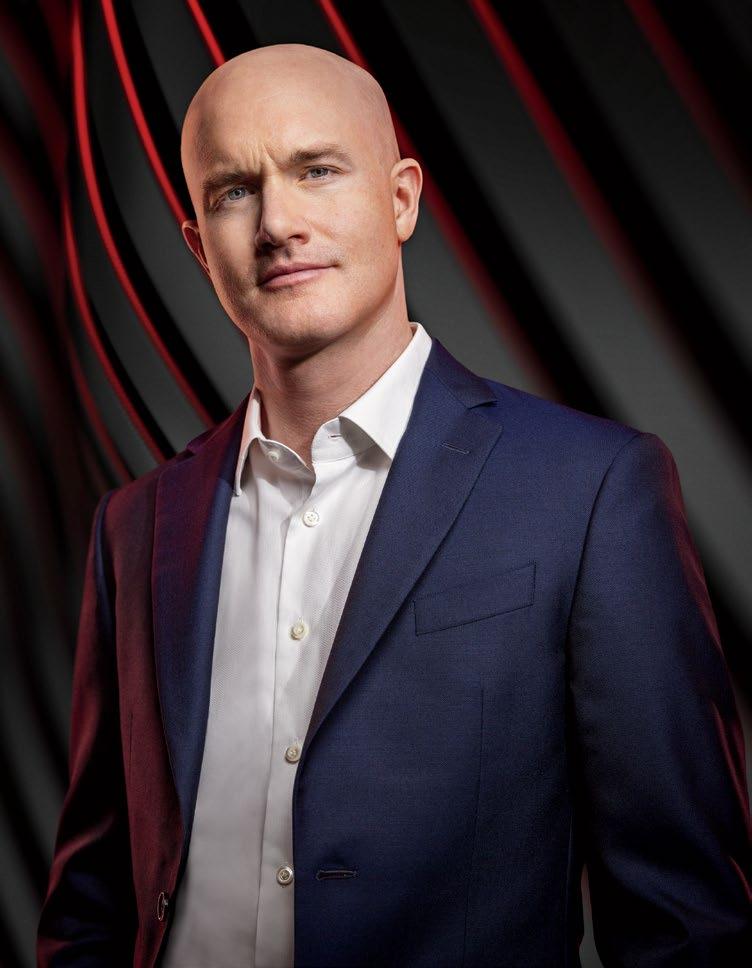
Bitcoin” has a market capitalization of $40 billion and crypto assets under its custody of $270 billion. That includes holding more than $20 billion for BlackRock ($10 trillion in assets under management), now the world’s largest crypto ETF provider. In 2023, the company, which makes around half of its money from trading fees, netted $95 million on revenue of $3.1 billion. This year is on track to be much better: In the first six months of 2024, Coinbase’s revenue amounted to $3.1 billion but net income soared to $1.2 billion.
If there were such a thing as a “Too Big to Fail” institution in the world of digital assets, Coinbase would be it. Just in terms of Bitcoin, Coinbase has custody of 11% of all tokens in existence. For crypto’s second-most important currency, Ether, its share is even larger at an estimated 14% of all tokens. If Coinbase imploded, the consequences could be catastrophic.
Not everyone is a fan. In June 2023, the Securities and Exchange Commission sued Coinbase for acting as an unregistered exchange, broker-dealer and clearing firm—all activities it engages in for more than 14,500 institutions, as well as 8 million active retail customers. The case is likely to go to trial in 2025.
Crypto evangelists hate the idea of centralized power, but operationally, Coinbase is more similar to other command-and-control financial institutions like JPMorgan than it is to something like an employee-owned credit union. Its main businesses are trading, custody and co-managing (with Circle) a huge ($35 billion) stablecoin operation that pegs the value of the USDC token to the U.S. dollar. Coinbase’s dominant position allows it to charge high fees. Purchasing $5,000 of Bitcoin on the exchange will cost you $90. On Kraken it costs $20, and on Robinhood it’s free.
But Armstrong is a crypto idealist, and he isn’t entirely happy with this state of affairs. He wants to disrupt his money machine, creating a whole new infrastructure for rapid-fire transactions, which will not only lower fees but also weaken the control of big tech and financial firms.
“The whole reason I got into this and the mission of Coinbase is around increasing economic freedom in the world,” he says. “The vision here is that crypto is going to power more and more of global GDP. [It will] create sound money, sound financial infrastructure for people all over the world with lower fees, lower friction.”
The key element in Armstrong’s latest corporate push is Base, which launched in August 2023. Base is a so-called Layer 2 platform. Instead of being a self-sufficient
By William Baldwin
Money that folds is going out of style. You can participate in its digital successors by buying into the volatile earnings stream of a crypto exchange or a Bitcoin miner. Or you could settle for a business in a more mundane line of work. Who’s servicing the credit card reader at a shoe store? That might be Global Payments, which trades at 19 times the earnings that Value Line expects this year. Contrast this company with Block, which is, with its Square payment processing, in the same line of work, but which also has an exciting sideline speculating in, and helping consumers speculate in, Bitcoin. Maybe you don’t need the excitement.
William Baldwin is Forbes’ Investment Strategies columnist.
blockchain like Bitcoin, Ethereum and Solana, it is designed to improve upon Ethereum by potentially processing thousands of transactions per second, costing less than a cent each. Ethereum can handle only about a dozen transactions per second, each costing an average of $1. It’s a huge improvement, but still far less than existing financial networks. Visa’s global processing network, VisaNet, can handle 65,000 transactions a second.
Armstrong would like his low-cost Base to be interoperable with other Ethereum-based blockchains and support decentralized versions of Facebook, YouTube, Google, Uber and X. He’s also onboarding merchants ranging from Anheuser-Busch to Wharton business school using his Coinbase Commerce service, taking aim at the likes of PayPal, Mastercard and Visa, which charge fees as high as 3% per transaction. Coinbase Commerce charges only 1%. But consumer adoption has been slow. The network processes fewer than 2,000 transactions daily. Visa does that many every second.
“Some of these businesses might have only 5% margins, and 2% of it is going to the card network,” Armstrong says. “There’s no reason it needs to be this way. It’s an unnecessary tax on the economy.”
According to Oppenheimer analyst Owen Lau, Base’s estimated 1 million active users are expected to contribute $100 million to Coinbase’s revenue in 2024. Most of that is from trading fees (this is crypto, after all).
Ironically, if Coinbase is going to be even more successful with Base, it will have to give up control—and share fees. Coinbase is currently Base’s only “sequencer,” crypto jargon for operator or supervisor. To become decentralized, Base will require more sequencers. If Base had four sequencers, Coinbase might earn only 25% of the total fees.
Talk of lower fees and revenue dilution may not win Coinbase long-term fans on Wall Street. In the short term, shareholders don’t seem to mind. Shares of Coinbase have nearly doubled in the last 12 months. As long as the price of crypto keeps soaring—and the geeks keep trading it— Armstrong can spout as much idealistic claptrap as he wants.
FINAL THOUGHT
“THE REAL TRICK IN HIGHLY RELIABLE SYSTEMS IS SOMEHOW TO ACHIEVE SIMULTANEOUS CENTRALIZATION AND DECENTRALIZATION.”
—Karl E. Weick

THE LIST THE RICHEST PEOPLE IN AMERICA
THE 400 RICHEST PEOPLE IN AMERICA are having a rollicking time in the roaring 2020s. In all, they are worth a record $5.4 trillion, up nearly $1 trillion from last year. A dozen have $100 billion–plus fortunes, also a record. And admission to this elite club is pricier than ever: A minimum net worth of $3.3 billion is required, up $400 million since 2023. Despite the high bar, 23 newcomers managed to break into the ranks, having grown their fortunes in everything from mundane plastic pipes to cutting-edge artificial intelligence.
ILLUSTRATION BY JAYA NICELY FOR FORBES

$244 billion • SELF-MADE SCORE:
SOURCE: Tesla, SpaceX
AGE: 53 • RESIDENCE: Austin, TX
PHILANTHROPY SCORE: ♥
Tesla’s self-proclaimed “technoking” tops The Forbes 400 for the third straight year, despite losing $7 billion as shares of his electric vehicle maker fell 14% and a Delaware judge voided $56 billion of his stock options in January. In May, Musk’s new AI startup, xAI, raised $6 billion at a $24 billion valuation. A month later, his rocket maker, SpaceX, launched a tender offer valuing the company at around $210 billion, up from nearly $180 billion. In an X post seen by 220 million, Musk endorsed Donald Trump within an hour of the assas sination attempt on the former president. Trump now vows to name Musk to a new government efficiency commission if elected.
$197 billion • SELF-MADE SCORE:
SOURCE: Amazon
AGE: 60 • RESIDENCE: Miami, FL
PHILANTHROPY SCORE: ♥♥
Since last summer, Bezos has snapped up three homes on Miami’s “billionaire bunker” island for $234 million. He has the cash: Since moving to tax-friendly Florida last November, the Amazon founder has offloaded more than $8 billion (pretax) of his shares; he still owns 9% of the e-commerce Leviathan, whose stock is up 29%. The Bezos Earth Fund, through which he has given $2 billion of a $10 billion pledge, will hand out up to $100 million to winners of an AI for Climate and Nature challenge beginning later this year.
$181 billion • SELF-MADE SCORE:
SOURCE: Facebook
AGE: 40 • RESIDENCE: Palo Alto, CA
PHILANTHROPY SCORE: ♥♥
No one got richer over the past year, in sheer dollar terms, than Zuck. He’s $75 billion wealthier, and ranks five spots higher, following a 75% runup in Meta Platforms stock. Revenue has been growing more than 20% per quarter, and the social media giant repurchased $31 billion of its shares over the past year. Zuckerberg, who turned 40 in May, has taken on a new look, sporting a gold chain, letting his wavy hair grow out and ditching his uniform hoodie for a shearling jacket. He also surprised his wife, Priscilla, with a seven-foottall statue in her likeness.
13. JIM WALTON & FAMILY
$95.9 billion
• SELF-MADE SCORE:
$175 billion • SELF-MADE SCORE:
SOURCE: Walmart
$47.6 billion
• SELF-MADE SCORE:
SOURCE: Candy, pet food
22. KEN GRIFFIN
$43 billion • SELF-MADE SCORE:
SOURCE: Hedge funds
SOURCE: Oracle
AGE: 76 • RESIDENCE: Bentonville, AR
PHILANTHROPY SCORE: ♥♥
AGE: 80 • RESIDENCE: Woodside, CA
AGE: 84 • RESIDENCE: The Plains, VA
PHILANTHROPY SCORE: N/A
AGE: 55 • RESIDENCE: Miami, FL
PHILANTHROPY SCORE: ♥♥♥
PHILANTHROPY SCORE: ♥
14. ROB WALTON & FAMILY
$94.3 billion
SOURCE: Walmart
• SELF-MADE SCORE:
AGE: 79 • RESIDENCE: Bentonville, AR
PHILANTHROPY SCORE: ♥
15. ALICE WALTON
$89.2 billion
• SELF-MADE SCORE:
SOURCE: Walmart
AGE: 74 • RESIDENCE: Fort Worth, TX
PHILANTHROPY SCORE: ♥♥
It was another banner year for the Oracle cofounder, chief technology officer and more than 40% shareholder, with the software firm’s shares up 12% to record highs. He’s spending accordingly: Ellison splashed out nearly $300 million on a Florida resort in August, adding to his $2 billion–plus real estate portfolio. He also plans to invest a reported $6 billion into the on-again-offagain merger between Paramount Global and Skydance, his son David’s media production company.
$150 billion • SELF-MADE SCORE:
SOURCE: Berkshire Hathaway
AGE: 94 • RESIDENCE: Omaha, NE
PHILANTHROPY SCORE: ♥♥♥♥♥
Rob Walton retired from Walmart’s board in June after more than four decades as a director of the firm his father Sam Walton (d. 1992) cofounded in 1962. He and his siblings’ estimated 35% stake in the retail giant is worth more than ever as shoppers flock to Walmart’s “Every Day Low Price” strategy to escape high inflation, driving both its revenue and shares to all-time highs. Jim still chairs the family’s $26 billion (assets) Arvest Bank Group. Alice, the richest woman in America for the ninth time in 10 years, reclaimed the title of the world’s wealthiest woman in early September from L’Oréal heiress Françoise Bettencourt Meyers of France for the first time since May 2022.
16. JULIA KOCH & FAMILY
$74.2 billion
• SELF-MADE SCORE:
SOURCE: Koch, Inc.
19. JOHN MARS
$47.6 billion
• SELF-MADE SCORE:
SOURCE: Candy, pet food
AGE: 88 • RESIDENCE: Jackson, WY
PHILANTHROPY SCORE: N/A
In August, their Mars Inc. announced it’s gobbling up snack and cereal maker Kellanova (formerly Kellogg’s) for $35.9 billion. The deal will put brands like Pringles, Pop-Tarts and Froot Loops under the Mars umbrella alongside Snickers, M&M’s and Kind bars. It’s the company’s biggest acquisition since it bought Wrigley in 2008 for $23 billion. The Mars siblings own an estimated twothirds of the $50 billion (2023 revenue) business but have no role in daily operations.
21. STEPHEN SCHWARZMAN
$43.6 billion • SELF-MADE SCORE:
SOURCE: Investments
Griffin’s hedge fund, Citadel, the most profitable of all time, raked in $8.1 billion in trading profits last year. Since then, Griffin, never one to leave money idle, has donated $50 million to the University of Miami, dropped $45 million on a Stegosaurus skeleton (a record price in the dinosaur auction business) and shelled out more than $90 million for an estate in Saint-Tropez, France.
23. THOMAS PETERFFY
$40 billion • SELF-MADE SCORE:
SOURCE: Discount brokerage
AGE: 80 • RESIDENCE: Palm Beach, FL
PHILANTHROPY SCORE: ♥
More than seven decades in, the investing legend is staying plenty busy. In August, Berkshire Hathaway became America’s first non-tech company to hit $1 trillion in market capitalization. In June, Buffett—the nation’s greatest philanthropist, with some $60 billion in lifetime giving—donated $5.3 billion of Berkshire stock, with a twist: He clarified that the vast majority of his remaining fortune will go to a charitable trust run by his three children, instead of the Gates Foundation, as was previously assumed.
AGE: 77 • RESIDENCE: New York, NY
PHILANTHROPY SCORE: ♥♥

AGE: 62 • RESIDENCE: New York, NY
PHILANTHROPY SCORE: ♥♥
17. CHARLES KOCH & FAMILY
$67.5 billion
• SELF-MADE SCORE:
$136 billion • SELF-MADE SCORE:
SOURCE: Koch, Inc.
SOURCE: Google
AGE: 88 • RESIDENCE: Wichita, KS
PHILANTHROPY SCORE: ♥♥
AGE: 51 • RESIDENCE: Palo Alto, CA
PHILANTHROPY SCORE: ♥
$130 billion • SELF-MADE SCORE:
SOURCE: Google
AGE: 51 • RESIDENCE: Los Altos, CA
PHILANTHROPY SCORE: ♥♥
In June, Koch Industries became Koch, Inc., as Charles rebranded the increasingly techfocused $125 billion (revenue) conglomerate for the first time since taking over the family firm after his father’s 1967 death. Julia Koch, the widow of his brother David (d. 2019), and her three children paid nearly $700 million that same month for 15% of BSE Global, which owns the NBA’s Brooklyn Nets and the WNBA’s New York Liberty and operates the Barclays Center in Brooklyn.
18. JEFF YASS
$49.6 billion • SELF-MADE SCORE:
SOURCE: Trading, investments
AGE: 66 • RESIDENCE: Haverford, PA
PHILANTHROPY SCORE: ♥
A federal judge ruled in August that Page and Brin’s Google acted illegally to maintain a monopoly in online search, which is responsible for 57% of parent company Alphabet’s sales. (The tech giant reportedly plans to appeal.) Shares hit an all-time high in July thanks to Google’s continued push into generative AI and cloud services, including a partnership with Oracle, before slipping in recent months.
$123 billion • SELF-MADE SCORE:
SOURCE: Microsoft
AGE: 68 • RESIDENCE: Hunts Point, WA
PHILANTHROPY SCORE: ♥♥
“Damn, I’m fired up!” exclaimed Ballmer in August at the grand opening of his Los Angeles Clippers’ new 18,000-seat Intuit Dome stadium, which boasts a 38,000-square-foot circular scoreboard. He bought the Clippers a decade
Yass’ fortune nearly doubled after Forbes revalued his trading firm, Susquehanna International Group—and Yass’ share of profits—based on tax returns leaked to ProPublica. With a potential TikTok ban threatening Susquehanna’s estimated 15% stake in the social media app, Yass has made nearly $70 million of federal political contributions during the 2024 election cycle, including $20.5 million to the Club for Growth Action, a conservative super PAC that has publicly opposed the TikTok ban (but denies having been influenced by Yass).
In August, Schwarzman and his wife announced plans to open their Miramar estate in Newport, Rhode Island, to the public as a museum upon their deaths. They spent $27 million on the Gilded Age mansion in 2021 and have been restoring it ever since. In May, Schwarzman, the cofounder and CEO of $1 trillion (assets) investment firm Blackstone, announced he’s backing Trump for president, two years after vowing to support someone else in 2024.
Peterffy is more than $10 billion richer than last year as shares of Interactive Brokers Group, the electronic trading firm he founded in 1993, rose 30%. The company booked $4.3 billion in revenue last year, a 42% year-over-year increase. Since he failed to persuade Virginia Governor Glenn Youngkin to enter the Republican presidential primary race, Peterffy, a longtime supporter of free-market policies, has kept quiet on Trump’s reelection bid.
ago for a thenrecord $2 billion after running Microsoft as CEO for 14 years, and spent $2 billion of his own money on the new stadium; Forbes now values the team at more than $4.6 billion.
9. BILL GATES
$107 billion
SOURCE:
AGE:
PHILANTHROPY SCORE:
24. PHIL KNIGHT & FAMILY
$36.8 billion • SELF-MADE SCORE:
alma mater, Johns Hopkins, and four historically Black colleges.
SOURCE: Nike
AGE: 86 • RESIDENCE: Hillsboro, OR
11. JENSEN HUANG
PHILANTHROPY SCORE: ♥♥♥
$104 billion • SELF-MADE SCORE:
SOURCE: Semiconductors
AGE: 61 • RESIDENCE: Los Altos, CA
PHILANTHROPY SCORE: ♥
The Microsoft cofounder’s rank is lower than it has been in 34 years, due mostly to a new Forbes estimate of his 2021 divorce settlement. In September, Netflix released a five-episode series called What’s Next? The Future with Bill Gates, which tackles topics including AI and income inequality. In February 2025, he’s set to publish a memoir, Source Code. TerraPower, the nextgeneration nuclear power company he cofounded in 2008, broke ground on a demonstration plant in Wyoming in June. That same month, his exwife, Melinda, resigned as co-chair of the couple’s Bill & Melinda Gates Foundation and walked away with $12.5 billion for her own philanthropy.
10. MICHAEL BLOOMBERG
$105 billion
SOURCE:
AGE:
PHILANTHROPY SCORE:
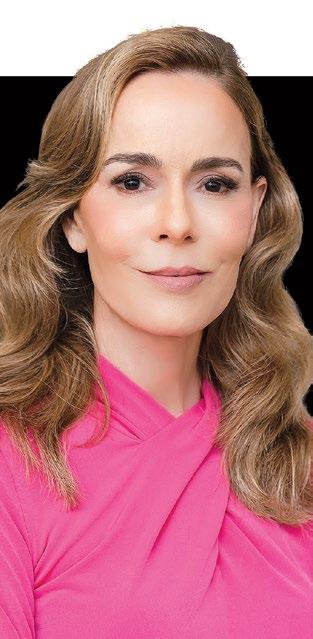
Julia Koch
The former mayor of New York City and cofounder of financial-data and media firm Bloomberg LP was awarded the nation’s highest civilian honor, the Presidential Medal of Freedom, by President Biden in May. Over the next three months, Bloomberg announced $1.6 billion of gifts to the medical schools of his
“On the doorsteps of the Olympic Games,” Knight wrote this summer in a letter to U.S. athletes, whose jerseys Nike designed, “we need to reignite the passion, desire and the want to win.” His sportswear giant could use a pep talk, too. Nike stock is down 15% since last year, making Knight, who created the company with his University of Oregon track coach in 1964, one of just three in the Top 25 to be poorer than in 2023.
25. LUKAS WALTON
$33.9 billion • SELF-MADE SCORE:
SOURCE: Walmart
AGE: 38 • RESIDENCE: Chicago, IL
PHILANTHROPY SCORE: ♥
Huang keeps climbing into rarer air: He has added $63.3 billion to his fortune, pushing him up six more notches on The Forbes 400 (he jumped 31 spots last year), on the back of a 162% rise in Nvidia shares. As his wealth grows, so does his celebrity: Paparazzi followed his every move on a trip to his native Taiwan this summer—a phenomenon termed “Jensanity.” Huang cofounded Nvidia, which designs and sells more chips used for artificial intelligence systems than any other company, in 1993 and has served as CEO and president since.
12. MICHAEL DELL
$101 billion • SELF-MADE SCORE:
SOURCE: Dell Technologies
AGE: 59 • RESIDENCE: Austin, TX
PHILANTHROPY SCORE: ♥♥
Dell scored his biggest payday ever in November, when semiconductor giant Broadcom acquired his cloud computing spinoff VMware; Dell swapped his 39% stake for an estimated $33 billion in cash and Broadcom shares. Around that time, he put $3.6 billion in cash and stock into his family’s charitable foundation and pumped at least $500 million into a donoradvised fund. Dell’s net worth is up 40% this year, thanks to 90% and 64% jumps in Broadcom and Dell Technologies share prices, respectively.
One of Sam Walton’s eight grandchildren, he inherited an estimated 4% stake in Walmart from his father, John Walton, who died in a 2005 plane crash. Lukas, who survived childhood cancer, founded and runs Builders Vision, a sustainability-focused philanthropic and impact-investing platform that has doled out more than $3 billion since launching in 2021. He is one of just two Forbes 400 members under age 40 (the other: VC investor Josh Kushner, No. 347, who is 39). His mother, Christy Walton (No. 48), cosigned a letter urging President Biden to withdraw from the 2024 election in July and has been fundraising for Kamala Harris. Two members of the family’s third generation still sit on Walmart’s board: Jim’s son Steuart Walton (Lukas’ first cousin) and Rob’s son-in-law Greg Penner, who is chairman.
13. JIM WALTON & FAMILY
13. JIM WALTON & FAMILY
19. JACQUELINE MARS
$95.9 billion • SELF-MADE SCORE:
$95.9 billion • SELF-MADE SCORE:
SOURCE: Walmart
SOURCE: Walmart
AGE: 76 • RESIDENCE: Bentonville, AR
AGE: 76 • RESIDENCE: Bentonville, AR
PHILANTHROPY SCORE: ♥♥
PHILANTHROPY SCORE: ♥♥
14. ROB WALTON & FAMILY
$94.3 billion
14. ROB WALTON & FAMILY
SOURCE: Walmart
• SELF-MADE SCORE:
$94.3 billion • SELF-MADE SCORE:
AGE: 79 • RESIDENCE: Bentonville, AR
$47.6 billion • SELF-MADE SCORE:
SOURCE: Candy, pet food
AGE: 84 • RESIDENCE: The Plains, VA
political contributions during the 2024 election cycle, including $20.5 million to the Club for Growth Action, a conservative super PAC that has publicly opposed the TikTok ban (but denies having been influenced by Yass).
PHILANTHROPY SCORE: N/A
22. KEN GRIFFIN
$43 billion • SELF-MADE SCORE:
$43 billion • SELF-MADE SCORE:
SOURCE: Hedge funds
SOURCE: Hedge funds
AGE: 55 • RESIDENCE: Miami, FL
AGE: 55 • RESIDENCE: Miami, FL
PHILANTHROPY SCORE: ♥♥♥
PHILANTHROPY SCORE: ♥♥♥
19. JOHN MARS
$47.6 billion • SELF-MADE SCORE:
$47.6 billion • SELF-MADE SCORE:
SOURCE: Candy, pet food
SOURCE: Candy, pet food
AGE: 88 • RESIDENCE: Jackson, WY
SOURCE: Walmart
PHILANTHROPY SCORE: ♥
AGE: 79 • RESIDENCE: Bentonville, AR
15. ALICE WALTON
$89.2 billion • SELF-MADE SCORE:
PHILANTHROPY SCORE: ♥
SOURCE: Walmart
AGE: 74 • RESIDENCE: Fort Worth, TX
15. ALICE WALTON
PHILANTHROPY SCORE: ♥♥
$89.2 billion • SELF-MADE SCORE:
SOURCE: Walmart
AGE: 74 • RESIDENCE: Fort Worth, TX
PHILANTHROPY SCORE: ♥♥
Rob Walton retired from Walmart’s board in June after more than four decades as a director of the firm his father Sam Walton (d. 1992) cofounded in 1962. He and his siblings’ estimated 35% stake in the retail giant is worth more than ever as shoppers flock to Walmart’s “Every Day Low Price” strategy to escape high inflation, driving both its revenue and shares to all-time highs. Jim still chairs the family’s $26 billion (assets) Arvest Bank Group. Alice, the richest woman in America for the ninth time in 10 years, reclaimed the title of the world’s wealthiest woman in early September from L’Oréal heiress Françoise Bettencourt Meyers of France for the first time since May 2022.
16. JULIA KOCH & FAMILY
$74.2 billion • SELF-MADE SCORE:
Rob Walton retired from Walmart’s board in June after more than four decades as a director of the firm his father Sam Walton (d. 1992) cofounded in 1962. He and his siblings’ estimated 35% stake in the retail giant is worth more than ever as shoppers flock to Walmart’s “Every Day Low Price” strategy to escape high inflation, driving both its revenue and shares to all-time highs. Jim still chairs the family’s $26 billion (assets) Arvest Bank Group. Alice, the richest woman in America for the ninth time in 10 years, reclaimed the title of the world’s wealthiest woman in early September from L’Oréal heiress Françoise Bettencourt Meyers of France for the first time since May 2022.
SOURCE: Koch, Inc.
AGE: 62 • RESIDENCE: New York, NY
16. JULIA KOCH
PHILANTHROPY SCORE: ♥♥
$74.2 billion • SELF-MADE SCORE:
17. CHARLES KOCH & FAMILY
SOURCE: Koch, Inc.
$67.5 billion • SELF-MADE SCORE:
AGE: 62 • RESIDENCE: New York, NY
SOURCE: Koch, Inc.
AGE: 88 • RESIDENCE: Wichita, KS
PHILANTHROPY SCORE: ♥♥
PHILANTHROPY SCORE: ♥♥
$67.5 billion • SELF-MADE SCORE:
SOURCE: Koch, Inc.
AGE: 88 • RESIDENCE: Wichita, KS
PHILANTHROPY SCORE: ♥♥
In June, Koch Industries became Koch, Inc., as Charles rebranded the increasingly techfocused $125 billion (revenue) conglomerate for the first time since taking over the family firm after his father’s 1967 death. Julia Koch, the widow of his brother David (d. 2019), and her three children paid nearly $700 million that same month for 15% of BSE Global, which owns the NBA’s Brooklyn Nets and the WNBA’s New York Liberty and operates the Barclays Center in Brooklyn.
18. JEFF YASS
$49.6 billion • SELF-MADE SCORE:
SOURCE: Trading, investments
AGE: 66 • RESIDENCE: Haverford, PA
In June, Koch Industries became Koch, Inc., as Charles rebranded the increasingly techfocused $125 billion (revenue) conglomerate for the first time since taking over the family firm after his father’s 1967 death. Julia Koch, the widow of his brother David (d. 2019), and her three children paid nearly $700 million that same month for 15% of BSE Global, which owns the NBA’s Brooklyn Nets and the WNBA’s New York Liberty and operates the Barclays Center in Brooklyn.
PHILANTHROPY SCORE: ♥
$49.6 billion • SELF-MADE SCORE:
SOURCE: Trading, investments
AGE: 66 • RESIDENCE: Haverford, PA
PHILANTHROPY SCORE: ♥
Yass’ fortune nearly doubled after Forbes revalued his trading firm, Susquehanna International Group—and Yass’ share of profits— based on tax returns leaked to ProPublica. With a potential TikTok ban threatening Susquehanna’s estimated 15% stake in the social media app, Yass has made nearly $70 million of federal
Yass’ fortune nearly doubled after Forbes revalued his trading firm, Susquehanna International Group—and Yass’ share of profits—based on tax returns leaked to ProPublica. With a potential TikTok ban threatening Susquehanna’s estimated 15% stake in the social media app, Yass has made nearly $70 million of federal political contributions during the 2024 election cycle, including $20.5 million to the Club for Growth Action, a conservative super PAC that has publicly opposed the TikTok ban (but denies having been influenced by Yass).
PHILANTHROPY SCORE: N/A
AGE: 84 • RESIDENCE: The Plains, VA
PHILANTHROPY SCORE: N/A
$47.6 billion • SELF-MADE SCORE:
SOURCE: Candy, pet food
AGE: 88 • RESIDENCE: Jackson, WY
PHILANTHROPY SCORE: N/A
In August, their Mars Inc. announced it’s gobbling up snack and cereal maker Kellanova (formerly Kellogg’s) for $35.9 billion. The deal will put brands like Pringles, Pop-Tarts and Froot Loops under the Mars umbrella alongside Snickers, M&M’s and Kind bars. It’s the company’s biggest acquisition since it bought Wrigley in 2008 for $23 billion. The Mars siblings own an estimated twothirds of the $50 billion (2023 revenue) business but have no role in daily operations.
21. STEPHEN SCHWARZMAN
$43.6 billion • SELF-MADE SCORE:
SOURCE: Investments
AGE: 77 • RESIDENCE: New York, NY
PHILANTHROPY SCORE: ♥♥
In August, their Mars Inc. announced it’s gobbling up snack and cereal maker Kellanova (formerly Kellogg’s) for $35.9 billion. The deal will put brands like Pringles, Pop-Tarts and Froot Loops under the Mars umbrella alongside Snickers, M&M’s and Kind bars. It’s the company’s biggest acquisition since it bought Wrigley in 2008 for $23 billion. The Mars siblings own an estimated twothirds of the $50 billion (2023 revenue) business but have no role in daily operations.
$43.6 billion • SELF-MADE SCORE:
SOURCE: Investments
AGE: 77 • RESIDENCE: New York, NY
PHILANTHROPY SCORE: ♥♥
In August, Schwarzman and his wife announced plans to open their Miramar estate in Newport, Rhode Island, to the public as a museum upon their deaths. They spent $27 million on the Gilded Age mansion in 2021 and have been restoring it ever since. In May, Schwarzman, the cofounder and CEO of $1 trillion (assets) investment firm Blackstone, announced he’s backing Trump for president, two years after vowing to support someone else in 2024.
In August, Schwarzman and his wife announced plans to open their Miramar estate in Newport,
Griffin’s hedge fund, Citadel, the most profitable of all time, raked in $8.1 billion in trading profits last year. Since then, Griffin, never one to leave money idle, has donated $50 million to the University of Miami, dropped $45 million on a Stegosaurus skeleton (a record price in the dinosaur auction business) and shelled out more than $90 million for an estate in Saint-Tropez, France.
Griffin’s hedge fund, Citadel, the most profitable of all time, raked in $8.1 billion in trading profits last year. Since then, Griffin, never one to leave money idle, has donated $50 million to the University of Miami, dropped $45 million on a Stegosaurus skeleton (a record price in the dinosaur auction business) and shelled out more than $90 million for an estate in Saint-Tropez, France.
23. THOMAS PETERFFY
$40 billion • SELF-MADE SCORE:
$40 billion • SELF-MADE SCORE:
SOURCE: Discount brokerage
SOURCE: Discount brokerage
AGE: 80 • RESIDENCE: Palm Beach, FL
PHILANTHROPY SCORE: ♥
AGE: 80 • RESIDENCE: Palm Beach, FL
PHILANTHROPY SCORE: ♥
Peterffy is more than $10 billion richer than last year as shares of Interactive Brokers Group, the electronic trading firm he founded in 1993, rose 30%. The company booked $4.3 billion in revenue last year, a 42% year-over-year increase. Since he failed to persuade Virginia Governor Glenn Youngkin to enter the Republican presidential primary race, Peterffy, a longtime supporter of free-market policies, has kept quiet on Trump’s reelection bid.
Peterffy is more than $10 billion richer than last year as shares of Interactive Brokers Group, the electronic trading firm he founded in 1993, rose 30%. The company booked $4.3 billion in revenue last year, a 42% year-over-year increase. Since he failed to persuade Virginia Governor Glenn Youngkin to enter the Republican presidential primary race, Peterffy, a longtime supporter of free-market policies, has kept quiet on Trump’s reelection bid.
24. PHIL KNIGHT & FAMILY
$36.8 billion • SELF-MADE SCORE:
$36.8 billion • SELF-MADE SCORE:
SOURCE: Nike
SOURCE: Nike
AGE: 86 • RESIDENCE: Hillsboro, OR PHILANTHROPY SCORE: ♥♥♥
AGE: 86 • RESIDENCE: Hillsboro, OR
PHILANTHROPY SCORE: ♥♥♥


Julia Koch
“On the doorsteps of the Olympic Games,” Knight wrote this summer in a letter to U.S. athletes, whose jerseys Nike designed, “we need to reignite the passion, desire and the want to win.” His sportswear giant could use a pep talk, too. Nike stock is down 15% since last year, making Knight, who created the company with his University of Oregon track coach in 1964, one of just three in the Top 25 to be poorer than in 2023.
“On the doorsteps of the Olympic Games,” Knight wrote this summer in a letter to U.S. athletes, whose jerseys Nike designed, “we need to reignite the passion, desire and the want to win.” His sportswear giant could use a pep talk, too. Nike stock is down 15% since last year, making Knight, who created the company with his University of Oregon track coach in 1964, one of just three in the Top 25 to be poorer than in 2023.
$33.9 billion • SELF-MADE SCORE:
SOURCE: Walmart
$33.9 billion • SELF-MADE SCORE:
SOURCE: Walmart
AGE: 38 • RESIDENCE: Chicago, IL
PHILANTHROPY SCORE: ♥
AGE: 38 • RESIDENCE: Chicago, IL
PHILANTHROPY SCORE: ♥
One of Sam Walton’s eight grandchildren, he inherited an estimated 4% stake in Walmart from his father, John Walton, who died in a 2005 plane crash. Lukas, who survived childhood cancer, founded and runs Builders Vision, a sustainability-focused philanthropic and impact-investing platform that has doled out more than $3 billion since launching in 2021. He is one of just two Forbes 400 members under age 40 (the other: VC investor Josh Kushner, No. 347, who is 39). His mother, Christy Walton (No. 48), cosigned a letter urging President Biden to withdraw from the 2024 election in July and has been fundraising for Kamala Harris. Two members of the family’s third generation still sit on Walmart’s board: Jim’s son Steuart Walton (Lukas’ first cousin) and Rob’s son-in-law Greg Penner, who is chairman.
One of Sam Walton’s eight grandchildren, he inherited an estimated 4% stake in Walmart from his father, John Walton, who died in a 2005 plane crash. Lukas, who survived childhood cancer, founded and runs Builders Vision, a sustainability-focused philanthropic and impactinvesting platform that has doled out more than $3 billion since launching in 2021. He is one of just two Forbes 400 members under age 40 (the other: VC investor Josh Kushner, No. 347, who is 39). His mother, Christy Walton (No. 48), cosigned a letter urging President Biden to withdraw from the 2024 election in July and has been fundraising for Kamala Harris. Two members of the family’s third generation still sit on Walmart’s board: Jim’s son Steuart Walton (Lukas’ first cousin) and Rob’s son-in-law Greg Penner, who is chairman.
Sorbonne University Abu Dhabi blends legacy, innovation, and intellectual rigor to offer students an exceptional learning experience in the U.A.E. capital.

Sorbonne University Abu Dhabi (SUAD) offers a prestigious academic experience that merges 750-plus years of academic excellence with cutting-edge innovation. Our diverse schools of Law, Economics & Business, Arts & Humanities, and Data, Science, & Engineering provide a world-class education that prepares students for global leadership.
SUAD offers 25 undergraduate and postgraduate programs delivered in both French and English, ensuring a rich and comprehensive learning experience. The programs are globally recognized and accredited by the Commission for Academic Accreditation (CAA) in the U.A.E. and by the High Council for the Evaluation of Research and Higher Education (HCERES) in France.
Sorbonne University Abu Dhabi is affiliated with Sorbonne Université in Paris and Université Paris Cité and is supported by impressive achievements. In 2019, SUAD was recognized by Forbes Middle East as the top institution for humanities education, while Sorbonne Université
in Paris achieved 41st position in the Shanghai World University Rankings as well as status as the leading communications school in France, according to Le Figaro Étudiant 2024. Specialized programs at the university have also achieved remarkable success, including 4th spot on the Shanghai Ranking for Mathematics and 17th for Physics.
For its part, Université Paris Cité proudly holds France’s top ranking for publication impact and achieved 19th position internationally in the THE Young University Rankings.
Sorbonne University Abu Dhabi demonstrates a dedication to intellectual rigor and innovation, and its commitment to research excellence is embodied in the Research Institute, which drives forward innovative projects.
Research at SUAD focuses on Sorbonne University’s areas of excellence and the fields of expertise of the research professors based in Abu Dhabi. The university’s research is also aligned to the U.A.E. vision for 2030 to support national priorities and implementation of the UN Sustainable Development
Goals. Four research centers have been established to tackle questions of global significance and local relevance: Artificial Intelligence, Heritage Studies, Environmental Studies, and Urban and Global Societies.
As the first French university established in Abu Dhabi, SUAD is home to 3,000 alumni and a vibrant, diverse student body representing over 60 nationalities. The stateof-the-art 93,000 square-meter campus includes comprehensive facilities such as a residence, sports amenities, and the largest Francophone library in the GCC, boasting 114,000 printed books, 49 databases, and 624,000 e-resources.
Excitingly, SUAD invites visitors to join the Cultural Season 2024-2025, a dynamic series of events celebrating art, culture, and intellectual exploration. This season will feature thought-provoking lectures and world-class performances, providing an unparalleled opportunity to expand horizons and engage with a global community.
Meanwhile, prospective students are invited to apply for bachelor and master programs, and step confidently into a future defined by opportunity and distinction at Sorbonne University Abu Dhabi.
*All rankings are for Sorbonne Université or Université Paris Cité
School�of Arts�&�Humanities School�of Data,�Science�& Engineering



Omar El Hamamsy, Group CEO of Orascom Development Holding, assumed office in 2020 during a global pandemic and steered the company from loss to annual profitability. Now, he’s focused on developing 60 million square meters of virgin land out of the group’s 101 million-square-meter land bank.
BY HAGAR OMRAN

TThe MENA region has recently made substantial strides in its sustainability commitments. Hosting COP27 and COP28 in 2022 and 2023, Egypt and the U.A.E. set pivotal benchmarks for regional climate action. This accomplishment has spurred businesses and political leaders to embark on bold sustainability initiatives. ESG may be a recent trend for some regional businesses, but for Orascom Development Holding, it remains an integral component of the group’s journey, which began more than three decades ago with the establishment of its first environmentally conscious town, El Gouna, in Egypt.
Established in 1989 by Samih Sawiris, a scion of Egypt’s wealthiest family, Switzerland-based Orascom Development further solidified its environmental commitments by launching its first ESG report in April 2024. Sustainability is a fundamental pillar of the group’s growth strategy, even amid the current market challenges. “We create vibrant, integrated, and sustainable towns in beautiful locations, that are far from densely populated urban environments. Orascom Development has the first-mover advantage in this area,” says Omar El Hamamsy, Group CEO of Orascom Development Holding.
Orascom Development Holding’s largest subsidiary is Orascom Development Egypt (ODE). The group currently operates in six countries, including Switzerland, England, Montenegro, Egypt, Morocco, and Oman. Across three continents, the group has developed 10 destinations, encompassing El Gouna, O West, Makadi Heights, Byoum, and Taba Heights in Egypt; Hawana Salalah and Jebal Sifah in Oman; Luštica Bay in Montenegro; Andermatt Swiss Alps in Switzerland; and West Carclaze in the U.K.
However, the recent escalation of geopolitical tensions in MENA has compounded existing economic challenges, including the global pandemic and Russia’s war in Ukraine. This has created a
complex environment for businesses, but Orascom Development has successfully navigated through sequential crises over the last four years thanks to its diversified portfolio. Orascom Development’s operations extend from hotels, real estate, and construction to land sales, destination management, and other operations. “The advantage of our business lies in our portfolio approach that provides resilience during challenging periods, as we serve a diverse customer base across different geographies, cultures, and nationalities,” says El Hamamsy.
In Q4 2024, ODE plans to launch new projects such as the Tuban District in El Gouna in Egypt, and AVA, a collection of 11 luxury residences and penthouses in Andermatt Swiss Alps, Switzerland. El Hamamsy is also concentrating on developing 60 million square meters of undeveloped land within Orascom Development’s total land bank of 101 million square meters, with 41 million square meters already developed or under development. The group owns 22 million square meters of virgin land in Egypt, paving the way for numerous potential projects in the pipeline. For example, in 2023, ODE finalized
“We are in a much stronger operational, financial, and human capital position now than we ever were before.”
an agreement with the Egyptian government for a new master plan in El Gouna, securing development rights for 17.4 million square meters. As part of this, the company is obliged to build 1,000 hotel rooms every decade. “Orascom Development aims to lead in destination development globally, transforming land into vibrant centers of life. We achieve this by crafting integrated destinations that host vibrant communities—a place where individuals are inspired to live, play, and work with passion and purpose,” says El Hamamsy.
As of 2023, Orascom Development’s portfolio included about 34 hotels, comprising more than 7,200 rooms, 2,100 residential real estate units, and a plethora of commercial and social amenities. Orascom Development has been listed on the SIX Swiss Exchange since 2008. Its market cap stood at $296.4 million as of September 18, 2024. In May 2022, Naguib succeeded his father, Samih, as Orascom Development’s chairman. Meanwhile, Orascom
Development Egypt’s shares have been traded on the Egyptian Exchange since 2015. Its market cap stood at $325.5 million as of September 18, 2024. Billionaire brothers Nassef and Naguib Sawiris boasted fortunes of $9.4 billion and $3.8 billion, respectively, as of September 20, 2024.
Despite many years of growth, MENA’s real estate sector still appears to have a lot of potential. “MENA’s real estate market is expected to show strong performance in 2024 compared to 2023,” says Faraz Ahmed, Research Director for MENA at JLL. “The market showed resilience and growth prospects, even amidst global economic fluctuations. Markets like Saudi Arabia and the U.A.E. are now seeing an influx of foreign investments and an increasing demand for high-quality commercial, residential, and retail spaces.”
The global real estate market declined by less than 1% to $13.2 trillion in 2023, according to the MSCI 2023 Real Estate Market Size report. It was estimated to be worth $10.5 trillion in 2020. However, Europe, the Middle East, and Africa’s real estate market size, constituting 31.8% of the global market, increased by 3.5% to $4.2 trillion last year, primarily driven by the strengthening of local currencies relative to the U.S. dollar. In 2020, it also grew by 13.4% to $3.6 trillion for the same reason.
While demand grows, trends in sustainability are also impacting the sector. In July 2024, Orascom Development launched its Keys of Life initiative, which actively engaged with more than 25 industry leaders in collaboration with YouGov to survey more than 3,600 people across Europe, MENA, and the U.S., to better understand evolving customer needs when it comes to living, place-making, and well-being. Orascom Development already prioritizes waste management, water conservation, and reducing plastic waste. These initiatives align with customer preferences and contribute to a more sustainable future. The group’s Swiss destination is 100% powered by renewable energy, ensuring a carbon-neutral footprint, according to the group CEO.
around 25% of the town’s total power consumption with the expansion of its solar power plant in El Gouna.
Familiarity with big companies is nothing new for El Hamamsy. Before joining Orascom Development, the group CEO had an extensive 18-year tenure at McKinsey & Company and experience spanning sectors such as telecom, high-tech, private equity, logistics, and transportation. At McKinsey & Company, he worked on multi-year transformations, corporate strategy, mergers and acquisitions, marketing and sales, and operations. Before McKinsey, El Hamamsy managed an engineering team at AT&T’s Bell Labs from 1995 to 2001.
Sustaining profitability in 2024 and beyond is also a key priority for El Hamamsy, who assumed office in September 2020, amidst the backdrop of the global pandemic, with his main goal being to transform the group from annual losses to profits. Financial statements from the past five years demonstrate his success. Orascom Development recorded losses of $32.4 million in 2019 and $43.6 million in 2020. By

As of December 2023, the El Gouna community generated approximately 9% of its energy consumption from solar power.
2021, it was recording net profits of $10.4 million and by 2023 this had risen to $64.7 million.
The group’s business model combines private investment with long-term local government support, creating resilience partnerships for large-scale towns. As of December 2023, the El Gouna community generated approximately 9% of its energy consumption from solar power. Orascom Development aims to increase this to
More recently, Orascom Development’s revenues increased by 20.7% in the first half of 2024 to hit $340.6 million, with its real estate and construction businesses bringing in 54.5% of overall revenues, followed by hotels with 24%. However, the group moved from achieving a net profit of $19.6 million in the first half of 2023 to losses of $27.6 million in the first half of 2024, with its business in Egypt facing macroeconomic hurdles, such as devaluation and inflation. The devaluation of the EGP has caused significant currency losses for the group as it has material net assets in EGP.
The Egyptian pound lost 36.3% of its value against USD since the end of 2023, hitting EGP 48.6 per greenback on September 18, 2024. The Central Bank of Egypt decided on March 5, 2024, to devalue the pound and aggressively hike interest rates by 6%. On March 7, 2024, Moody’s affirmed the long-term foreign and local currency issuer ratings of Egypt at Caa1 and changed the outlook to positive from negative. Elisa Parisi-Capone, Vice President, Senior Analyst at Moody’s Ratings remains positive about Egypt’s outlook, saying, “significant official and bilateral support announced and marked policy steps taken that will, if maintained, support macroeconomic rebalancing.”
“A sustained shift to a managed float and inflation targeting regime that restores confidence in the local currency would support a higher rating,” Parisi-Capone adds. Ahmed Negm Head of Market Research MENA at XS.com agrees. “The Egyptian economy is showing signs of recovery following the pound devaluation in March and the Ras El Hikma announcement, with the latest PMI results for August 2024 providing strong evidence. The Ras El Hikma project is expected to attract significant foreign investment and boost various sectors,” he says. However, challenges remain. “Particularly inflationary pressures due to the weakening Egyptian pound. While demand conditions are stabilizing and export business is rising, careful management of inflation and continued structural reforms could be crucial for sustaining this recovery in the long term,” adds Negm. The CBE data shows that Core CPI inflation slowed down to 25.1% in August 2024, compared with 34.2% in December 2023, after hitting its highest rate this year at 35.1% in February. Despite this, ODE’s revenues surged by 64.9% year-over-year to $212.3 billion in the first half of 2024. This growth was primarily fueled by
increased sales and accelerated construction activities, with real estate and construction revenues climbing by 42.5% to $118.6 million.
Egypt’s tourism sector has shown resilience, welcoming a total of 7.069 million tourists during the first six months of 2024. This figure closely aligns with the previous record of 7.062 million tourists received during the same period in 2023 and surpasses the 6.9 million tourists who visited the Northern African country in the first half of 2010, according to Egypt’s Ministry of Tourism and Antiquities. “This rebound demonstrates the sector's resilience and the effectiveness of government initiatives in mitigating the impact of recent conflicts and attacks,” says Negm. Egypt aims to attract 30 million tourists annually by 2028 but Egypt’s Minister of Tourism and Antiquities, Sherif Fathy, expects that the target can be achieved few years later. To achieve this ambitious plan, El Hamamsy proposes increasing air capacity from the GCC and Europe to local airports such as Hurghada to accommodate more low-cost and full-service carriers. “To grow Egypt’s tourism sector, it is important to attract more airlines and streamline processes. This would enhance the tourist experience while driving growth in the sector,” he stresses.
Aside from external hurdles, Orascom Development is focusing on talent development and efficient processes. Looking ahead to future endeavors, El Hamamsy aims to further boost the institutionalization of the group and retain the best talent in all the countries in which the company operates.

“Orascom Development has made significant progress in transforming our business. We’ve been on a hypergrowth trajectory for the last four years, driven by our comprehensive full transformation,” says El Hamamsy. “We are in a much stronger operational, financial, and human capital position now than we ever were before.”

With deep wealth planning and family advisory expertise, Standard Chartered Private Bank is helping the region’s ultra-high net worth families preserve their legacies.
The economic boom that is sweeping across the Middle East is creating a new generation of ultra-high net worth (UHNW) individuals and families. According to a report by Knight Frank, the number of UHNW individuals in the Middle East grew by 6.2% in 2023.
While the region’s newfound wealth presents incredible opportunities, it also brings a significant challenge: Ensuring a smooth and successful transfer of these fortunes to future generations. Traditionally, it is uncommon to have open discussions around succession and inheritance. However, leaving wealth at risk without a proper succession plan can jeopardize both family harmony and family legacy.
With a longstanding presence in the Middle East, Standard Chartered Private Bank understands the unique needs of UHNW individuals and their families in the region and offers a comprehensive suite of services to help them navigate the complexities of wealth transfer.
According to Mike Tan, Global Head of Wealth Planning and Family Advisory at Standard Chartered, having a succession plan in place helps to pre-empt future disputes or succession setbacks. “With the right professional guidance and financial structures in place, affluent individuals have a better chance to achieve their legacy goals,” he says.

These measures not only minimize the risk of conflict among family members but also ensure that family values and aspirations are instilled in future generations. And with assets often spread across many locations, a well-defined plan can help families navigate the legal and tax requirements in various jurisdictions.
One of the areas that Standard Chartered Private Bank advises its clients on is the family office – a key node that facilitates effective decision-making and fosters open communication. Here, the bank can guide families in establishing appropriate structures for managing their wealth and business interests.
Beyond wealth preservation, Standard Chartered recognizes the growing interest of UHNW families in aligning their investments with environmental and social responsibility. Sustainable investing is no longer a niche concern; it is
a core consideration for families seeking to invest in areas that matter most to them alongside achieving financial goals. To help them in this space, the bank offers a variety of sustainable investment solutions, including green deposits and ESGfocused funds.
“For many affluent individuals and their families, engaging in sustainable investing not only helps to align investments in areas that matter most to them but is also a good diversification for their wealth portfolio,” says Tan.
Many families in the Middle East are also seeking to move from traditional charitable giving to a more strategic and impactful approach to philanthropy. “We see growing interest from our clients to incorporate philanthropy into their legacy planning, and we work closely with them to enable structured and impactful giving that is aligned with their family values,” adds Tan, Standard Chartered’s wealth and family advisory expert.
With its extensive experience and in-depth knowledge of the Middle East wealth market, Standard Chartered is a trusted partner in wealth planning and legacy building for the region’s UHNW families.

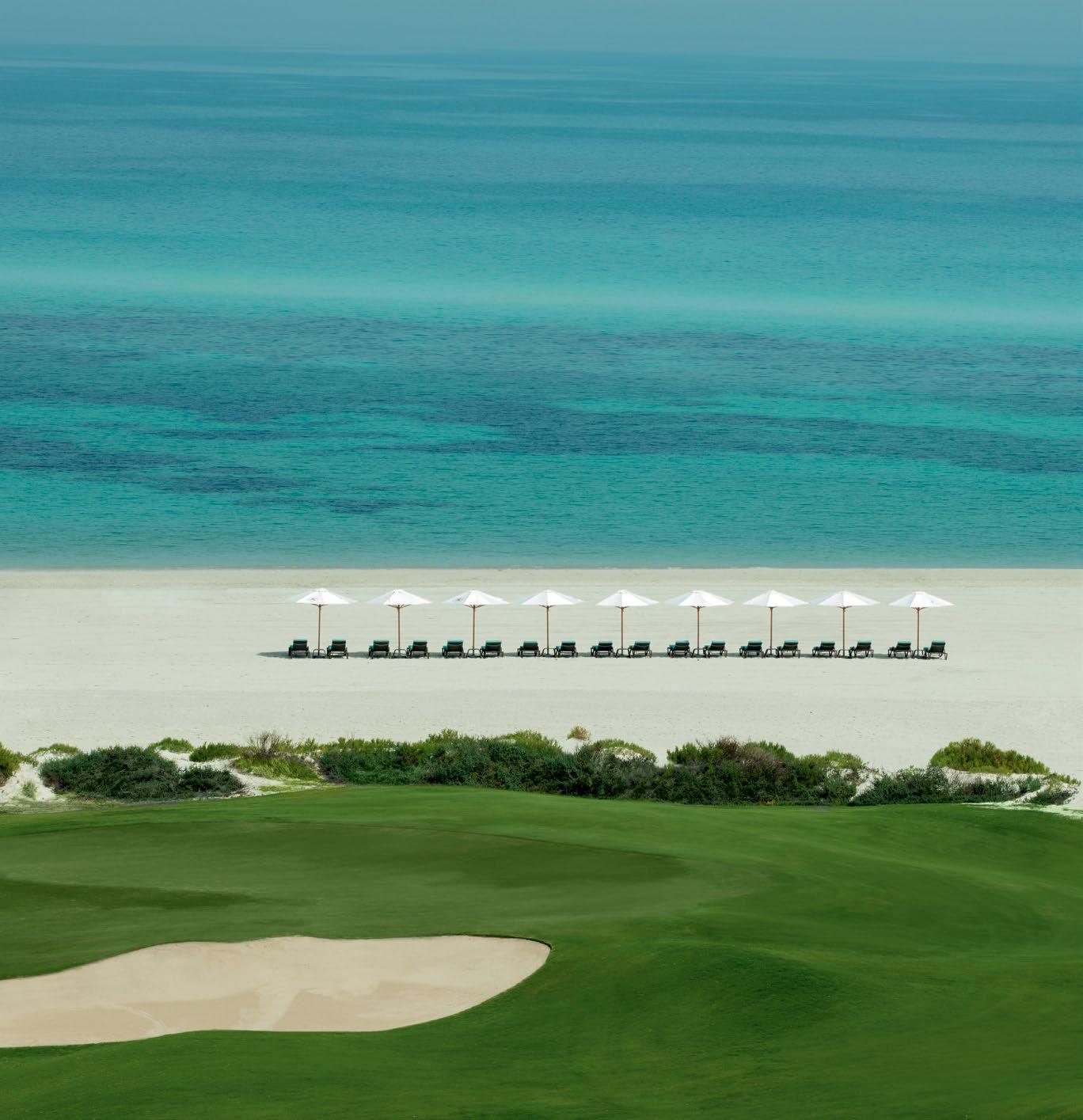

For Maywand Jabarkhyl, CEO of FBMI and Tanweer Investments, sustainable investment is more than a positive move for the planet; it’s a life-altering opportunity for some of the world’s most vulnerable and disconnected people.
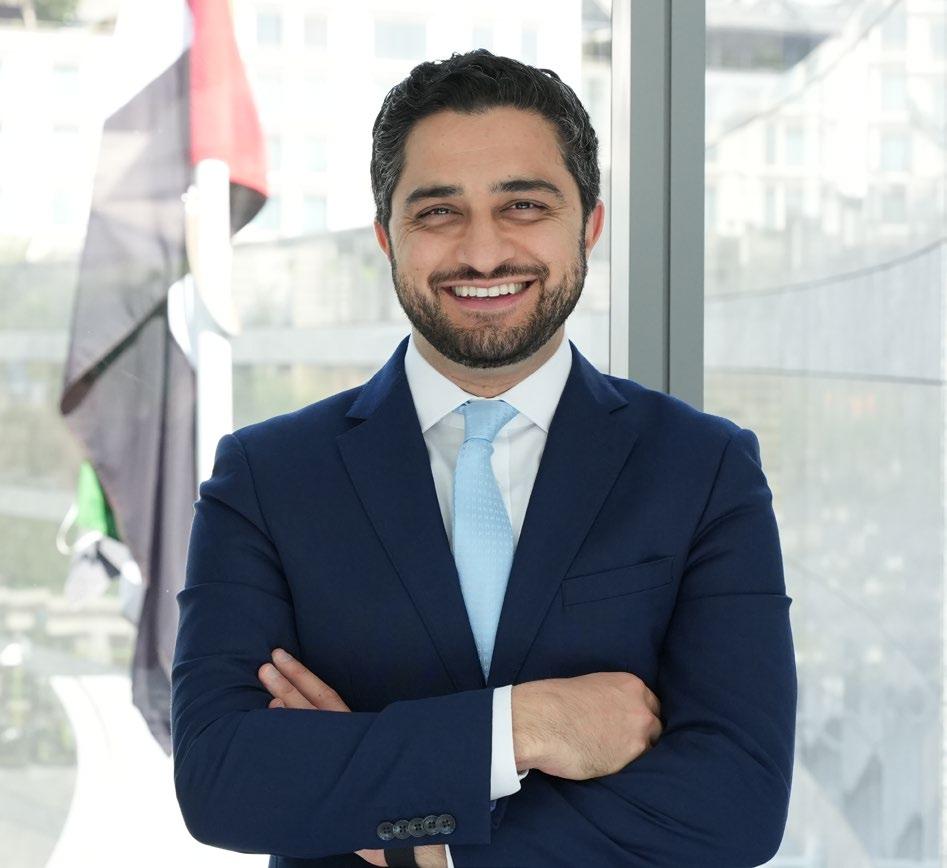
BY JAMILA GANDHI
AAccording to 2024 data from the World Bank, nearly 8.5% of the global population or 692 million people still lives in extreme poverty—or on less than $2.15 a day— with many residing in conflict-affected countries like Afghanistan where almost 85% of the population lives on less than one dollar a day, as reported by the UNDP in 2024. The landlocked Islamic nation has endured over four decades of war, natural disasters, chronic poverty, drought, and the Covid-19 pandemic, making strides toward progress all the more critical. For the Fatima Bint Mohamed Bin Zayed Initiative (FBMI), the priority is empowering women in these challenging landscapes and reframing the narratives of the disadvantaged.
Established in 2010, FBMI is a joint venture between Sheikha Fatima Bint Mohamed Bin Zayed of Abu Dhabi and Tanweer Investments. Built on four pillars—healthcare, education, arts and culture, and strategic advisory—FBMI’s mission is to provide sustainable livelihoods for women and families by offering employment in traditional crafts.
“We’re not just handing out charity; we’re empowering people with the tools to forge lives of dignity and self-sufficiency. It’s about transforming potential into possibility,” emphasizes Maywand Jabarkhyl, CEO of FBMI and Tanweer Investments, highlighting Afghanistan as a land of opportunity. Since its inception, FBMI has improved the lives of over two million individuals and empowered more than 8,000 predominantly female artisans, many of whom are widows, empowering them as the primary breadwinners for their families. Around 70% of FBMI’s employees are women who work from home,
receiving vocational training, medical care, and schooling for their children.
By integrating traditional craftsmanship into a modern social enterprise framework, FBMI is scaling its impact while preserving cultural heritage. The humanitarian organization operates as a selfsustaining initiative, reinvesting profits from its commerce-driven social enterprises to further its mission, creating a cycle of growth without relying on external donations. “Many people in this part of the world are philanthropic and want to give, but we need to guide them toward models that create lasting change, not dependency,” he explains. “This framework allows us to be self-sustaining, which is key to our long-term impact. We’re not just waiting for the next donation—we’re creating value and reinvesting it into the community.”
One of FBMI’s notable social enterprises is Zuleya, a retail brand in the U.A.E.—with a presence in Dubai Design District—that sells 100% organic carpets and handicrafts made by Afghan artisans, mostly women from disadvantaged communities. All profits from sales are reinvested back into the initiative to preserve this ancient craft for future generations and the Afghan women receive competitive wages above United Nations guidelines.
“We’re not just handing out charity; we’re empowering people with the tools to forge lives of dignity and self-sufficiency. It’s about transforming potential into possibility.”
Recognizing the importance of agriculture for millions of Afghans, Jabarkhyl launched Mira Farms in 2020 to strengthen farmers, promote sustainable practices, and expand global exports. The brand produces high-quality saffron, dried and fresh fruits, and nuts. “Through Mira Farms, our mission is to eradicate polio,” he explains. “We source products from villages, collaborate with local women for processing, and refine them in the U.A.E. The more we sell, the more immunizations we can provide.” FBMI’s traditional farming techniques have provided vocational training to over 900 farmers in 2020 alone, with farms located across the country, including some of the most remote and inaccessible areas.
While FBMI provides economic empowerment through sustainable job creation, the initiative goes beyond employment, integrating healthcare, education, and social services into its programs. For instance, through its healthcare initiatives, FBMI’s medical team of 200 staff have delivered mobile and in-house services to 1.8 million people, treated over 300,000 patients for illness and prenatal care, and delivered over 800,00 polio vaccinations since 2020. In 2022, FBMI and the Anwar Gargash Diplomatic Academy launched the region’s first physical diplomacy lab in Dubai, designed to build partnerships and foster open dialogue while promoting innovative diplomatic solutions. More than 20,000 children under the age of 15 have enrolled in FBMI’s educational programs.
Such strides for progress in Afghanistan are crucial, particularly in light of the challenges faced since the Taliban takeover in August 2021. Data published by UNESCO in 2024 reveals that at least 1.4 million girls have been barred from secondary education. While girls under the age of 12 can still attend school, primary enrollment rates have dropped sharply from 6.8 million in 2019 to 5.7 million in 2022 for both girls and boys. Additionally, women have been banned from universities since December 2022, denying over 100,000 young women access to higher education. This prohibition on women working has resulted in Afghanistan ranking 177th out of 177 countries for women’s inclusion in Georgetown University’s 2023 Women Peace and Security Index. Even before the Taliban seized power, the country was grappling with a significant educational crisis, with over 4.2 million children out of school, 60% of whom were girls.
see only conflict and poverty,” explains Jabarkhyl. “What they don’t see are the talent and skills that can drive economic growth.” Growing up in the U.K. as the son of Afghan immigrants, his attachment to humanitarian and economic development work runs deep. Jabarkhyl earned a bachelor’s degree in Business Studies and a master’s in International Studies and Diplomacy from SOAS, University of London. His journey back to Afghanistan in 2003-2004 revealed a stark gap between the influx of funding into the country and the actual on-the-ground impact. “What really struck me was the disconnect between the investment coming in and the actual impact,” he recalls. “The

Established in 2010, FBMI is a joint venture between H.H. Sheikha Fatima Bint Mohamed Bin Zayed of Abu Dhabi and Tanweer Investments.
international community has been working to develop the economy and support women in business, but those benefits weren’t reaching the grassroots level.”
Focusing on grassroots development, particularly in economies reliant on artisans and farmers, he established Tanweer Investments in 2007, a vehicle for ethical investment strategies in energy, agriculture, and real estate.
“As with most third-world countries a lot of people think of Afghanistan and
After engaging in discussions with the family of the U.A.E. President in 2010, Jabarkhyl took on the role of the CEO at the newly established FBMI, where he began building initiatives focused on
creating sustainable job opportunities for women and supporting children in Afghanistan. “We wanted to impact as many people as we could, all in a very cost-effective and sustainable way,” he emphasizes, underscoring that FBMI’s mission balances financial success with social impact.
To achieve this goal, Jabarkhyl emphasizes the importance of strategic partnerships, most notably with the U.A.E. government. Instead of seeking donations, the initiative collaborates with the government, which purchases its products as gifts for global leaders. High-profile figures such as The Pope, Barack Obama, Joe Biden, and Nicolas Sarkozy have received Zuleya’s rugs as gifts, while the products have been displayed in landmark locations like the U.A.E.’s Presidential Palace and luxury boutiques such as Cartier and Vacheron Constantin. FBMI is also collaborating with other organizations to support humanitarian causes, such as its recent partnership with UNHCR to auction handmade carpets. In Ramadan, FBMI partnered with the U.A.E. Red Crescent Authority to sell products from the U.A.E. and olive oil from Palestine, with the proceeds from this initiative sent to Gaza.
On the public front, FBMI, through its social enterprises, is harnessing the growing trend of conscious consumerism in the region. According to PwC’s Voice of the Consumer 2024 report, customer data protection, fair worker treatment, and transparency around sustainable practices are crucial to earning the trust of 95% of consumers in the Middle East, compared to 70% worldwide. “The unwavering focus on sustainability presents a significant opportunity for differentiation and premiumization,” Norma Taki, PwC’s Middle East Deals Partner and Consumer Markets Leader, notes in a statement. “The region’s savvy businesses are investing in sustainable practices to attract and retain this value-conscious, yet

Between 2019 and 2022, primary school enrolment reduced by 18% among boys and 12% among girls.
Economic reasons were cited for primary school absences among 66% of boys and 47% of girls between 2019-2022.
Over 100,000 female university students were banned from education in December 2022.
As of April 2023, 80% of school-aged girls and young women
– 2.5 million people – were out of school, including a cohort of 1.1 million secondary school-aged girls.
In 2023, child marriage data from Afghanistan showed 28.7% of women aged 20-24 were married before age 18.
In 2022, 10% of women were able to cover their basic health needs, compared to 23% of men.
Source: UN Women
environmentally aware consumer base. Businesses cognizant of such macroeconomic nuances influencing consumer behaviors will solidify their position in the Middle East.”
Looking ahead, FBMI has a series of innovative projects in the pipeline. In a bid to share knowledge and empower the local community, FBMI is developing a training institute in Abu Dhabi and Kalba to equip Emirati women with the skills needed to create handmade carpets.
Expanding its global footprint is another key target, with plans to implement the sustainable model in 50 countries by 2050, including Tanzania, Kenya, Rwanda, Uganda, and neighboring Eastern African countries. “We’ve had interest from various governments and organizations wanting to adopt our model in places like Yemen and parts of Africa,” reveals Jabarkhyl. “Our aim is to prove that this isn’t just an Afghan solution—it’s a global solution.” In Africa, FBMI is working to boost local economies by helping farms export finished goods rather than raw products, ensuring higher returns for crops like cashews in Tanzania and avocados in Uganda. Strategic partnerships are key to this expansion, involving collaboration with governments, the UN, and foundations like the Bill and Melinda Gates Foundation.
Stay connected with our latest business news.

Ultimately, at the heart of FBMI’s mission is the preservation of ancient traditions and the support of the people who sustain them. “One of the most important aspects is preserving these ways and supporting people. It all revolves around the people,” emphasizes Jabarkhyl. With plans to expand into new regions, he is optimistic about FBMI’s potential to continue its mission of empowering marginalized communities through sustainable employment. “By investing in their future, we’re not just changing lives; we’re transforming communities.”
Collective action surrounding climate change in the Middle East has gained significant momentum following COP28, as regional leaders, businesses, and communities increasingly prioritize sustainability. This growing commitment to climate action reflects a broader shift toward addressing environmental challenges through collective responsibility and regional cooperation. According to a 2024 report from PwC, 80% of participant companies in the Middle East now have a formal sustainability strategy in place.
In the banking sector, the First Abu Dhabi Bank facilitated $21.2 billion in sustainable and transition projects in the first half of 2024. In 2023, QNB Group made $3.5 billion available in green loans and was a key coordinator in Qatar’s first $2.5 billion green bond issuance in May 2024. Emirates NBD has facilitated over $20.4 billion in green, social, and sustainability-linked transactions since 2021, and Mashreq plans to facilitate $30 billion in sustainable financing by 2030. Saudi Awwal Bank aims to increase its sustainable financing and investments to $9 billion by 2025.
In the renewable energy domain, in July 2024 Saudi Arabia’s Public Investment Fund signed three joint ventures to localize renewable energy. Meanwhile, ACWA Power is leading the development of 70% of Saudi Arabia’s renewable projects, under PIF’s renewables program.
Abu Dhabi’s EWEC plans to provide 60% of the emirate’s total power demand from renewable and clean energy sources by 2035. In March 2024, Masdar acquired a 50% stake in the U.S. renewables power producer Terra-Gen.
In our second list of the Middle East’s Sustainability Leaders, we present 107 leaders across 12 sectors, and 105 companies involved in moving the region closer to achieving its sustainable agenda. The U.A.E. is home to 54 entries, followed by Saudi Arabia with 20, Egypt with 10, Qatar with eight, Bahrain and Kuwait with five each, and Oman with three.
To nominate yourself or someone else for our lists, email: info@forbesmiddleeast.com
• Group CEO
Company: First Abu Dhabi Bank (FAB)
Established in: 2017
Headquarters: U.A.E.
FAB facilitated over $21.2 billion in sustainable and transition projects during the first half of 2024. As of June 2024, FAB had invested a total of $56 billion in these projects, which equates to 41% of its $136 billion commitment to sustainable projects by 2030. In July 2024, it issued a five-year green Formosa bond for $800 million. It also developed emission-reduction net-zero targets for eight high-emitting sectors within its loan portfolio and ceased new financing approvals for thermal coal-fired mining and coal-based power generation. In July 2023, FAB issued the U.A.E.’s first-ever AEDdenominated Green Sukuk for $354 million.
• Group CEO
Company: QNB Group
Established in: 1964
Headquarters: Qatar
The QNB Group’s sustainable finance portfolio includes green, social, and sustainability-linked transactions and investments. In 2023, it invested $9 billion in this portfolio, including $3.5 billion for green loans and $4.5 billion for social loans, with only 1% of its loan book exposed to carbonintensive sectors. The group has achieved a 48% decrease in scope 1 and 2 greenhouse gas emissions since 2017. The bank has issued $1.1 billion in sustainable bonds. In May 2024, the bank was a key coordinator in Qatar’s $2.5 billion first green bond issuance.

• Vice Chairman & Group CEO
Company: National Bank of Kuwait (NBK)
Established in: 1952 Headquarters: Kuwait
In April 2024, NBK joined the Partnership for Carbon Accounting Financials. In May 2024, it partnered with DHL to join the GoGreen Plus service to ensure its international shipments are transported using sustainable aviation fuel. In June 2024, NBK issued its first $500 million green bond under its Sustainable Financing Framework. As of June 2024, the bank had installed 39 out of 41 building energy management systems and achieved an 80% completion rate of solar power systems. In 2023, it also achieved a 6.28% reduction in total greenhouse gas
emissions compared to 2022.
• Group CEO
Company: Emirates NBD
Established in: 1963 Headquarters: U.A.E.
Since 2021, Emirates NBD has facilitated over $20.4 billion in green, social, and sustainability-linked transactions. In June 2024, Emirates Islamic listed its first $750 million sustainability Sukuk on Nasdaq Dubai as part of a $2.5 billion certificate issuance programme. In September 2024, the group signed the UN Principles for Responsible Banking, committing to sustainable finance practices.
• Group CEO
Company: Mashreq
Established in: 1967 Headquarters: U.A.E.
In July 2024, Mashreq led a $3.25 billion sustainability-linked financing for GEMS Education, in line with the bank’s target of facilitating $30 billion in sustainable financing by 2030. In November 2023, Mashreq launched Climb2Change—a sustainability initiative and global awareness campaign—and facilitated a $2.5 billion sustainability-linked loan to Bapco Energies in Bahrain.
• Group CEO
Company: Dubai Islamic Bank (DIB)
Established in: 1975 Headquarters: U.A.E.
In December 2023, DIB allocated 15% of its gross financing towards sustainable finance by 2030. Other initiatives in place include “One Tree for Everyone,” which was launched in September 2023 and focuses on reforestation. It had planted 62,564 trees as of August 2024. The DIB-alt focuses on reducing its operational footprint by consolidating over 135 digital services. This led to a 13% increase in digital registration and mobile and internet banking transactions in 2023 and the first half of 2024. In February 2024, DIB priced its third sustainable sukuk—a $1 billion five year senior issue—at a profit rate of 5.243% per year. In July 2024, the bank led a $3.25 billion sustainability-linked financing for GEMS Education.
• Managing Director & CEO
Company: Saudi Awwal Bank (SAB)
Established in: 1978
Headquarters: Saudi Arabia
By December 2023, SAB had grown its sustainable finance portfolio, including green deposits and green bond investments of $3.4 billion. It aims to increase sustainable financing and investments to $9 billion by 2025. In 2023, the bank recycled 13,200 kilograms of paper and saved 1.7 million kilowatts of energy and 221,884 liters of water. SAB’s new headquarters decreased operational energy consumption by 28.47% and reduced water consumption during landscaping by 59.25%.

• Acting Group CEO
Company: Abu Dhabi Islamic Bank (ADIB)
Established in: 1997 Headquarters: U.A.E. In 2023, ADIB’s sustainable finance portfolio was worth $1.5 billion. In November 2023, the bank issued the world's first green USD sukuk issued by a financial institution, raising $500 million. It also established its net-zero emissions plan, with reduction targets covering six sectors: home finance, auto finance, real estate developers, air transport, utilities, and petroleum manufacturing. During 2023, it reduced its scope 1 emissions by 65% compared to 2022.
• Chief Sustainability Officer at EFG
Holding and CEO of the EFG Foundation
Company: EFG Holding
Established in: 1984 Headquarters: Egypt
In 2023, EFG’s energy transition investment platform, Vortex Energy, invested $80 million in electric vehicle charging solutions company, EO Charging, with Zouk Capital. Its banking arm, Bank NXT formerly Known as aiBANK, also launched a campaign
that enables clients to secure financing of up to $82,000 to purchase ecofriendly electric or hybrid cars, and Valu partnered with solar energy suppliers to offer buy now, pay later solutions for solar panels.
• CEO Company: Alinma Bank
Established in: 2006
Headquarters: Saudi Arabia
In 2023, Alinma Bank launched its sustainability strategy, with six pillars encompassing 15 goals, leading to the implementation of over 120 initiatives. Among those initiatives is supporting local suppliers, reaching 77.4% of total supplier engagements in 2023. The bank also completed digital zones across 108 branches, implemented smart building systems in 76 branches, and installed solar energy systems in 58 branches. In 2023, the bank financed projects focused on green initiatives with a committed exposure of $3.6 billion. In 2023, Alinma Bank reduced its scope 1 and 2 greenhouse gas emissions by 21.3% and water consumption by 8% compared to 2022.
• CEO
Company: Abu Dhabi Future Energy
Company – Masdar
Established in: 2006
Headquarters: U.A.E.
Masdar is active in over 40 countries, with projects worth over $30 billion in total. In March 2024, Masdar acquired a 50% stake in the U.S. renewables power producer Terra-Gen. In July 2024, it partnered with Endesa for 2.5GW of renewable energy assets in Spain by acquiring a 49.99% stake in the company for $890.4 million. In the same month, Masdar raised $1 billion through its second green bond issuance. The company has 83 operational, underconstruction and committed projects, with a gross capacity of 22GW as of March 2024. It also has green bonds worth $1.75 billion outstanding, as well as $225 million in committed corporate green loan facilities.
• Vice Chairman & Group CEO
Company: BEEAH Group
Established in: 2007
Headquarters: U.A.E.
The BEEAH Group operates within eight verticals: BEEAH Tandeef, BEEAH Environment Services, BEEAH Recycling, BEEAH Transport, BEEAH Energy, BEEAH Digital, BEEAH Healthcare, and BEEAH Education. In January 2024, BEEAH and the Sharjah Road and Transport Authority announced a plan to develop and install a network of EV chargers in strategic locations across the emirate. In December 2023, the group and the Administrative Capital for Urban Development formed a joint venture to develop a waste management system in Egypt’s new administrative capital targeting an 80% landfill waste diversion rate. The joint venture started trial operations in the third residential district in July 2024.
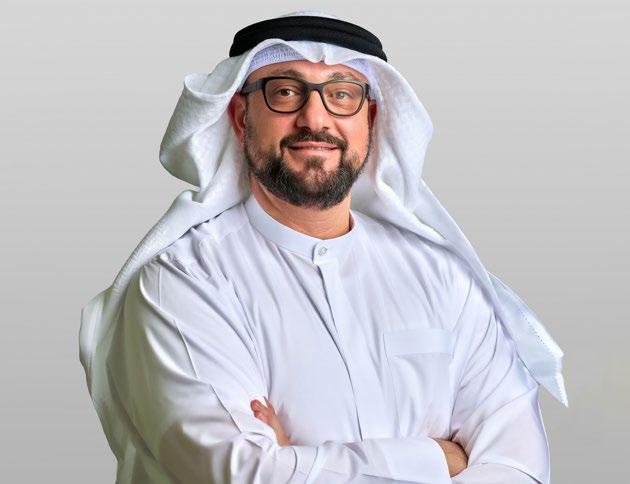
• CEO Company: Oman Environmental Services Holding Company (be’ah)
Established in: 2007
Headquarters: Oman be’ah, which is fully owned by the Oman Investment Authority, manages municipal, industrial, and healthcare waste in Oman, providing waste management services from collection to disposal. In August 2024, be’ah signed an agreement with Tialoc and Al Ramooz National to establish the second phase of an industrial waste treatment facility in the Sohar Free Zone. As of December 2023, it had 11 landfills, 18 transfer stations, three facilities each for industrial and healthcare waste, one materials recovery facility, and 28 construction and demolition waste sites. In 2023, be’ah managed over 2.2 million tonnes of municipal solid waste and more than 4,000 tonnes of healthcare waste.
• Managing Director & CEO
Company: Tadweer Group
Established in: 2008
Headquarters: U.A.E.
In May 2024, Tadweer Group—part of ADQ—and DUBAL Holding signed an agreement to acquire 100% of e-waste specialist Enviroserve. In July 2024, Tadweer Group and its partners
deployed 25 reverse vending machines across Abu Dhabi and launched the Tadweer Rewards app, which is an initiative aimed at encouraging the community to recycle by earning points. In the same month, the group also created four new subsidiaries: Tadweer Environmental Services and Solutions, Tajmee’e, UpCycle, and Tahweel, specializing in the waste management and recycling fields.
• Chairman Company: Infinity Power
Established in: 2019 Headquarters: Egypt
Infinity Power is a joint venture between Egypt’s Infinity and Abu Dhabi’s Masdar. It has an operational portfolio across Egypt, South Africa and Senegal, including 1.3GW of solar power and onshore wind farms, which equates to a reduction of more than three million tons of CO2 emissions per year using conventional power generation. In May 2024, Infinity Power, Hassan Allam Utilities, and Masdar, signed a Land Access Agreement with the Egyptian government for a 10GW capacity onshore wind farm project in Egypt. In August 2024, Infinity Power and Masdar signed a power purchase agreement with the Egyptian Electricity Transmission Company for a 200MW wind farm in Ras Ghareb.

With renewed discussions on pandemic preparedness, international collaboration has become more vital than ever as healthcare issues increasingly cross borders. Hayat Biotech started with a vision to make a global impact through collaboration. Evolving from a start-up into a leading healthcare company, we remain dedicated to tackling complex health challenges. Leveraging my industrial experience in building strategic partnerships, we emphasize how crucial these alliances are in advancing healthcare equity for those in greatest need.
At Hayat Biotech, our global partnerships, especially in Africa, aim to improve medication access and infrastructure. By collaborating with BioVax in Kenya, we address healthcare disparities and enhance local capabilities. Drawing on my experience, I’ve built impactful alliances that drive progress in healthcare and advance our mission to deliver sustainable solutions to underserved regions.
Speaking of underserved communities, addressing global medicine shortages, worsened by manufacturing delays, geopolitical tensions, and rising costs, demands a multifaceted approach that includes data utilization, resource sharing, and artificial intelligence.
Naser Al Yammahi, Deputy CEO of Hayat Biotech, highlights the importance of international collaboration in fostering a healthier, more equitable world.
International collaborations are vital for improving medicine access and supply chain efficiency.
I’m proud to have overseen the establishment of one of the region’s largest biosimilars facilities, which enhances health equity by increasing access to essential medicines. With a production and storage capacity of 200 million vials per year, this facility not only supports the U.A.E.’s self-sufficiency goals but also offers an ideal contract manufacturing solution for international pharmaceutical companies targeting the MENA market. In addition, our global expansion, including a new partnership with Serbia, will add another 30 million vials annually. Our commitment to enhancing medicine access and production capabilities is supported by extensive experience in managing clinical trials across the U.A.E., Egypt, Bahrain, and Jordan. Leveraging this significant expertise positions us as the partner of choice for pharmaceutical multinationals seeking to conduct clinical trials within a robust and seamless regulatory process. Furthermore, the U.A.E.’s diverse population ensures a broad and representative participant base that contributes to comprehensive and impactful clinical trial results.
These international endeavors would not have reached fruition without the support of global pharmaceutical leaders. Notably,
our strategic partnership with Sinopharm—a company with over a century of expertise and a broad, diverse product portfolio—has been crucial in supporting these crossborder initiatives. One outcome was the introduction of Hayat-Vax, the first locally produced COVID-19 vaccine in the MENA region. Hayat Biotech has been pivotal in improving vaccine accessibility, distributing it to 64 countries.
Moreover, I believe that academic collaborations are crucial for advancing healthcare. Our partnerships with Khalifa University and Zayed University drive clinical trials, research, and youth empowerment, fostering new treatments and inspiring future leaders.
Navigating the complexities of international engagement presents both opportunities and challenges. We tackle regulatory and logistical hurdles by forging strong partnerships and leveraging digital solutions to optimize our operations. Looking ahead, Hayat Biotech is committed to supporting the U.A.E.’s vision of transforming Abu Dhabi into a hub for collaboration and innovation in the healthcare sector and to addressing health disparities, contributing to a more equitable future for all.

• Group CEO & Managing Director
Company: TAQA Group
Established in: 2005
Headquarters: U.A.E.
TAQA Group’s generation business operates in seven countries, excluding Masdar projects, with a gross power capacity of 24.15 gigawatts. In 2023, the TAQA Group reduced its scopes 1 and 2, and scope 3 emissions by 11% and 13%, respectively. In November 2023, ahead of COP28, the group, in partnership with Masdar, EDF Renewables, JinkoPower, and the Emirates Water and Electricity Company, inaugurated one of the world’s largest single-site solar power plants in Al Dhafra of 2.1 GW capacity. In January 2024, TAQA Group, Vision Invest, and GIC won a $408.4 million Juranah Independent Strategic Water Reservoir Project in Makkah.
• CEO
Company: ACWA Power
Established in: 2004
Headquarters: Saudi Arabia
ACWA Power entered a strategic agreement with Saudi Arabia’s Public Investment Fund (PIF) in 2023, to lead the development of 70% of Saudi Arabia’s renewable projects, under the PIF Renewable Program. In June 2024, the company signed three power purchase agreements alongside Badeel and SAPCO, with the Saudi Power Procurement Company to develop and operate three major new solar PV projects in Makkah and Qassim, with a combined capacity of 5.5GW for $3.3 billion. In the first half of 2024, the company added 10.5GW of renewable power generation capacity to its portfolio. It is in the process of constructing a 240 MW wind power plant in Azerbaijan at an investment cost of $345 million.

• CEO & Managing Director
Company: Dubai Electricity and Water Authority (DEWA)
Established in: 1992 Headquarters: U.A.E.
DEWA’s gross power generation reached 25.5TWh in the first half of 2024, with 12.9% coming from green energy. In 2023, DEWA reduced its CO₂ emissions by 10.54 million tonnes compared to 2006. As of July 2024, DEWA’s independent power and water producer model had attracted projects worth $11.9 billion over 10 years. DEWA is designing the Mohammed bin Rashid Al Maktoum Solar Park to have a production capacity of 5,000 megawatts by 2030. It is currently at 2,860 megawatts. DEWA is also constructing a $387 million pumped-storage hydroelectric power plant in Hatta, with a production capacity of 250 megawatts, which is expected to be completed in Q1 2025.
• CEO
Company: Emirates Water and Electricity Company (EWEC)
Established in: 2018 Headquarters: U.A.E.
In April 2024, EWEC announced its new 1.5 gigawatt Al Ajban Solar PV Independent Power Project. The development of this utility-scale power plant was awarded to Masdar, EDF Renewables, and the Korea Western Power Company and in September 2024 the consortium secured the finance of the project from six banks. It is set to be operational by Q3 2026, with a projected reduction of 2.4 million metric tons of carbon emissions per year in Abu Dhabi. EWEC and the Tadweer Group signed a concession agreement with a Japan-based consortium in March 2024 to develop the greenfield Abu Dhabi Waste-to-Energy Independent Power Project, which is expected to reduce 1.1 million tons of carbon emissions per year once launched. By 2035, EWEC plans to provide 60% of Abu Dhabi’s total power demand from renewable and clean energy sources.
• CEO Company: Emirates Central Cooling Systems Corporation (Empower)
Established in: 2003 Headquarters: U.A.E.
Empower serves over 1,550 buildings and has 87 district cooling plants. In October 2024, Empower achieved a Guinness World Record for the world’s largest district cooling project in Dubai’s
Business Bay, with an ultimate cooling capacity of 451,540 refrigeration tons. The project consists of nine plants, four of which are currently operational. In September 2024, Empower concluded its ‘Set and Save at 24°C,’ annual summer campaign, which aims to optimize consumption.
• President & CEO—Europe, Middle East, and Africa, Gas Power Company: GE Vernova
Established in: 2024
Headquarters: Global U.S.
Regional: U.A.E.
With nearly 55,000 wind turbines and 7,000 gas turbines, GE Vernova’s technology base helps generate about 25% of the world’s electricity. It is one of the founding members of the Corporate Coalition for Innovation & Technology toward Net Zero. In June 2024, the company secured its single largest order for 7HA.03 gas turbines in the Middle East and Africa, supplying six units and two 7E.03 gas turbines for Saudi Arabia’s Taiba 1 and Qassim 1 power plants, with a 21-year service agreement. A month later, it secured a contract to supply grid equipment for 134 substations in Algeria by 2028, aiming to support the country’s energy transition.
• CEO
Company: National Central Cooling Company (Tabreed)
Established in: 1998
Headquarters: U.A.E.
In December 2023, Tabreed and ADNOC announced the start of operations at the G2COOL plant, harnessing geothermal energy to decarbonize the way buildings are cooled in Abu Dhabi’s Masdar City. It leverages geothermal water as a natural heat sink in district cooling plants, providing a clean and efficient energy source. In 2023, Tabreed decreased its usage of petrol, diesel, natural gas, and electricity to 3.02 MJ/Ton-Hr compared to 3.35 MJ/Ton-Hr in 2022, representing an 11% reduction in energy consumption. It also purchased 116,000 MWh of solar-sourced clean energy certificates from the Emirates Water and Electricity Company as part of its commitment to a diverse energy mix.
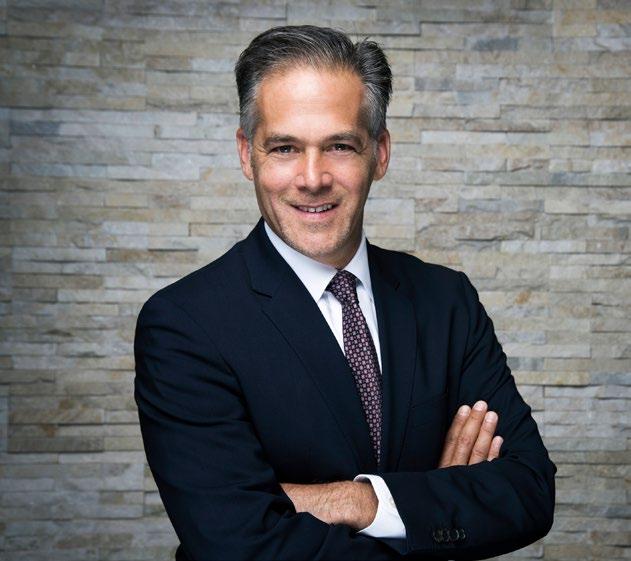
• MEA Zone President
Company: Schneider Electric
Established in: 1836
Headquarters: Global: France
Regional: U.A.E.
In November 2023, Schneider Electric and the Arab Youth Center launched the "UAE Youth Green Challenge" to engage university students in developing innovative solutions for decarbonizing the buildings sector. In December 2023, Schneider Electric and the Clean Energy Business Council launched the “Climate Horizon” report at COP28, outlining decarbonization strategies for the Middle East by 2060, focusing on energy transition and net-zero goals.
In September 2024, the Ducab Group partnered with Schneider Electric to enhance its ESG and decarbonization strategy by providing expertise through a comprehensive climate strategy.
• Chief Sustainability Officer
Company: ENGIE AMEA
Established in: 2015 Headquarters: U.A.E.
In 2023, ENGIE AMEA reduced its scope 1 and 3 emissions to 52 metric tonnes of greenhouse gasses from
energy generation. It consumed 0.274 m3 megawatts per hour of fresh water to produce energy. By the end of 2023, ENGIE had increased its renewable capacities by 3.9 GW, bringing the group’s total renewable installed capacities to 41.4 GW. As of August 2024, ENGIE had planted 500,000 mangrove trees since 2020. It also has an ongoing partnership with the Environment Agency Abu Dhabi, working on the Blue Carbon project.
• Managing Director, Middle East and Africa
Company: Siemens Energy
Established in: 2020
Headquarters: Global: Germany
Regional: U.A.E.
In June 2024, Saudi Arabia signed a $1.5 billion contract with Siemens Energy to supply key power plant technology for two gas-fired power plants being built in the western and central regions of the country, Taiba 2 and Qassim 2. In May 2024, it inaugurated a 1.9 MW Solar PV system at its Egypt Service Center, which aims to cut carbon emissions by about 1,500 metric tons annually and meet over 90% of the center’s electricity needs.
• CEO
Company: Almarai Established in: 1977
Headquarters: Saudi Arabia
Between 2018 and 2023, Almarai recorded a reduction of 4,719 metric tons of plastic and 2,528 metric tons of paper packaging. In 2023, 67% of cardboard packaging had been derived from recycled materials. In the same period, about 7,000 trees were planted across Almarai’s Al Kharj and Hail locations. Its solar PV plant in Al Kharj was estimated to offset 8,100 tons of CO₂ each year. In March 2024, the company revealed its 2024-2028 $4.8 billion investment strategy, a portion of which would also go towards environmental and social sustainability.
• CEO Company: Silal
Established in: 2020 Headquarters: U.A.E.
Since installing IoT sensors across 100 farms, Silal has recorded a 50% reduction in water usage and a 10% decrease in energy consumption. The company signed an agreement with the Khalifa University of Science and Technology in February 2024, to create a joint Center of Excellence in AgriRobotics and Automation. The center will be located at Silal’s Innovation Oasis site in Al Ain with a dedicated autonomous greenhouse. In the same month, the company introduced its Mobile Crop Health Lab to provide farmers with real-time data, and enhance sustainable agricultural practices.
• Cofounder & CEO
Company: Pure Harvest
Established in: 2016
Headquarters: U.A.E.
Pure Harvest uses smart farming and green technologies to offer affordable, local produce. In December 2023, Pure Harvest and RedSea signed a

letter of intent for Pure Harvest to take over RedSea’s six-hectare controlledenvironment agriculture production facility in Saudi Arabia. It also has four farms in the U.A.E. and Saudi Arabia, two of which are in partnership with Al Dahra, and the other with NADEC. Five new farms are under development. It also works with over 300 farmers to transform desert into greenhouses.
• Group CEO
Company: Savola Group
Established in: 1979
Headquarters: Saudi Arabia
In 2023, the Savola Group’s Savola Foods Company recycled up to 27,737 tons of oil waste into soap, biofuels, and chemical and poultry feed, and reduced its scope 1 and 2 greenhouse gas emissions by 15% compared to 2019. Its subsidiary, Panda, recycled 38,797 tons of wood and 18,084 tons of general material, or around 10% of the material it uses. The group
also expanded its Negaderha Food Waste Management and Reduction Program, launching a year-long national awareness program ‘Recycle Food, Don’t Waste It,’ in partnership with the National Transformation Program, Saudi Arabia’s Ministry of Environment, Water & Agriculture, and the General Food Security Authority.
• CEO
Company: Agthia Group
Established in: 2004
Headquarters: U.A.E.
In November 2023, Agthia Group announced the establishment of solar power plants at the production facilities of Al Ain Water and Al Foah, two of its key subsidiaries. This solar lease agreement was signed with Yellow Door Energy. With this, Agthia aims to offset almost 20% of the factories’ energy consumption per year. In the first half of 2024, Agthia reduced its CO2 emissions by 7.6% in seven countries and 22
manufacturing site compared to 2023. In 2023, the group recycled 67.14% of its generated waste and transitioned from traditional wooden pellets to 100% recycled plastic pellets, making 96% of packaging reusable.
• CEO Company: Saudia Dairy and Foodstuff Company (SADAFCO)
Established in: 1976
Headquarters: Saudi Arabia
In the first half of 2024, SADAFCO reduced its Water Conversion Ratio by 30%, saving 48 million liters since 2022. In 2023, SADAFCO recorded a 94% recycling rate, reducing 97% of waste disposal trips, and saving 122 million liters of water. It has announced plans to install solar panels on the roofs of an additional seven sites by 2025, which are expected to generate 5.8 million kilowatts per hour of energy and reduce 2,600 metric tons of carbon emissions per year. By the end of 2024, it aims to offset over 40% of its grid-based electricity consumption with solar power in Saudi Arabia.
• Group Head of Sustainability
Company: IFFCO
Established in: 1975
Headquarters: U.A.E.
IFFCO sells its products in over 100 countries worldwide. In October 2023, the IFFCO board signed its 2030 Climate Roadmap, which includes reducing scope 1, 2, and 3 greenhouse gas emissions by 55% by 2030 from a 2021 baseline. In March 2023, it launched the first 100% plant-based meat factory in the U.A.E. By December 2023, IFFCO had installed solar panel plants across seven facilities, with a total generating capacity of 7,200 MWh. In 2023, Rahma EVOO & EVOO Organic, two of its olive oil brands, achieved carbon neutrality.
• CEO & Deputy Chairman
Company: Juhayna Food Industries
Established in: 1983 Headquarters: Egypt
In January 2024, Juhayna Food Industries signed a sustainability linked

loan agreement with HSBC tied to key performance indicators, including the reduction of direct and indirect emissions by 18.7% each by 2025 compared to 2021. It also aims to reduce 42% of carbon emissions by 2030 and make its products 100% recyclable.
• Managing Director
Company: Baladna
Established in: 2014 Headquarters: Qatar
In April 2024, Baladna signed a $3.5 billion agreement with the Algerian Ministry of Agriculture and Rural Development to produce powdered milk. This project takes into consideration
Algeria's environment, climate, and soil type to minimize negative environmental impacts and water consumption.
• Managing Director
Company: Barakat Group of Companies
Established in: 1976
Headquarters: U.A.E.
Barakat is currently a part of the U.A.E.’s National Food Security Strategy (2051), Waste Management Strategy, National Food Loss and Waste Initiative, Circular Economy Policy, Dubai Clean Strategy (2050), Water Security Strategy (2036), and Dubai Integrated Energy Strategy (2030).
• Group CEO & Managing Director
Company: Contact Financial Holding
Established in: 2001 Headquarters: Egypt
In January 2024, Contact Financial Holding launched a new financing program to finance electric vehicles. This is in addition to a green finance product launched at the end of 2022. A key area of focus for the company’s investment is in agriculture, which includes providing financial support for solar energy units, in developing irrigation systems and greenhouses, managing aquatic resources, constructing poultry and livestock houses for responsible animal husbandry, and purchasing agricultural equipment and machinery.
• Group CEO & Managing Director
Company: Beltone Holding
Established in: 2002 Headquarters: Egypt
In August 2024, Beltone Securities Brokerage, a subsidiary of Beltone Holding, acted as the sole executor of Egypt’s first carbon credit trade between the Egyptian Biodynamic Association and Isis for Food Manufacturing. In September 2024, Beltone Venture Capital made an equity investment in VelyVelo, an optimized e-bike fleet management provider that offers green, efficient, and affordable mobility solutions in France and Morocco, with upcoming launches in Spain and Belgium.
• CEO Company: Valu
Established in: 2017 Headquarters: Egypt
In August 2024, Valu collaborated with KarmSolar to install an EV charging network across East Cairo’s District 5 residential community. KarmSolar will integrate its recently launched “Karm.” app while implementing Valu’s payment

solutions to charge vehicles on-site. In October 2024, it partnered with Flash, a cashless payments company, to offer QR code-based payment solutions in Egypt.
• Managing Director
Company: Waha Capital
Established in: 1997 Headquarters: U.A.E.
In September 2023, Waha Capital became a signatory to the Abu Dhabi Sustainable Finance Agenda Declaration. Through this, it will work with ADGM to promote sustainability and climate finance in Abu Dhabi, the U.A.E., and the wider region. In 2023, the company recorded 145,000kWH in energy consumption. The energy mix
supplied by the building was divided between approximately 10% solar, 60% gas, and 30% nuclear.
• Group CEO Company: GFH Financial Group
Established in: 1999
Headquarters: Bahrain
In 2023, GFH recorded a 32% reduction in petrol consumption. It also participated in the 58th Avenue treeplanting project in the Seef district on World Environment Day. In September 2024, GFH Financial Group and the FII Institute announced a three-year extension of their strategic partnership to foster global innovation and sustainable development.
Rofayda Maternity embodies the essence of what it means to be a true community health provider, with a stellar reputation in maternity care.
The journey of Egypt’s Rofayda Maternity is not just one of bricks and mortar; it is a testament to the dedication of countless healthcare professionals who have poured their hearts into serving patients. Each success story within its walls reflects the unwavering commitment to improving lives, demonstrating how quality care can transform not only individual health but also entire communities.
Established in 2016, Rofayda Hospital houses an exemplary medical campus located in the heart of Al Sheikh Zayed City, covering a vast land area of 15,000 square meters with a total builtup area of 43,000 square meters. The facility comprises two main buildings: the clinics building and a semi-attached structure that houses both Dar el Oyoun (Ophthalmology) and maternity services. This strategic design allows for seamless patient care across various medical specialties.
Additionally, the campus offers a wide array of medical services, including specialized clinics and centers that cater to diverse health needs. Key facilities include the renowned Dar el Oyoun for ophthalmology patients, as well as an advanced laboratory, an on-site pharmacy, and a fully equipped blood bank, ensuring that patients receive holistic care under one roof.
The name “Rofayda” pays homage to Rofayda Bint Sa’ad who was born around 620 AD and is recognized

as the first professional nurse in the Arab world. Trained by her physician father, she dedicated her life to caring for patients in her tent during times of conflict and led volunteer groups to assist those wounded on the battlefield. This legacy inspires Rofayda Hospital’s commitment to compassionate healthcare.
Today, women’s empowerment is deeply rooted in Rofayda’s core values as the hospital is proudly led by women for women. Its remarkable team includes the renowned Dr. Omaima Idris (Obstetrics, Gynecology, MD, PHD) and Dr. Amira Edris (Neonatology Pediatrics MD, PHD) as key figures on the board of directors. This woman-empowered leadership is also reflected in the hospital’s workforce, where 70% of the employees are women.
In addition, Rofayda Maternity has ambitious expansion plans
to meet the growing healthcare needs of the community. From its initial capacity of 40 beds in 2016, the hospital plans to expand to 175 beds by 2027. The workforce is also set to grow significantly, from 450 employees currently to 1,300 by 2027. Over the past eight years, Rofayda has handled 7,500 deliveries, 26,000 in-patients, 8,000 babies born, and 170,000 ER patients, showcasing its solid commitment to providing comprehensive and high-quality healthcare services.
Having already established itself within the maternity healthcare department, Rofayda is actively planning to incorporate even more medical specialties. This strategic move aims to serve an even broader patient base, ensuring that comprehensive healthcare solutions are available under one roof.
By adding new specialties, Rofayda is not only enhancing its service offerings but also reinforcing its dedication to meeting the diverse health needs of the community it serves while upholding the highest standards of quality healthcare that Rofayda is known for.
• Governor
Company: Public Investment Fund (PIF)
Established in: 1971
Headquarters: Saudi Arabia
PIF has $925 billion in assets under management, and 95 companies across 13 strategic sectors. In July 2024, PIF signed three joint ventures to localize renewable energy in Saudi Arabia. These ventures aim to manufacture wind turbines and components, photovoltaic cells, and modules, and ingots and wafers for solar power. These agreements have been entered into by the Renewable Energy Localization Company, which is fully owned by PIF. As of 2023, PIF had raised $8.5 billion by issuing two green bonds, of which $1.3 billion had been deployed and invested in 35 green projects, as of June 2023.
• Managing Director & Group CEO
Company: Mubadala Investment Company (Mubadala)
Established in: 2002
Headquarters: U.A.E.
Mubadala is a sovereign investor managing a diverse portfolio of assets in the U.A.E. and globally, with over $302 billion in assets under management in 2023. In May 2024, Mubadala made its first renewable investment in Japan in PAG’s Asia Pacific renewable energy platform, PAG REN I, primarily focused on supplying solar power to corporations across Japan. In December 2023, Mubadala announced its investment in Zenobē, a key player in fleet electrification and battery storage solutions, to power 4,000 electric buses, trucks, and commercial vehicles by 2026. In October 2023, Mubadala issued its firstever green bond, for $750 million.

• CEO & Managing Director
Company: International Holding Company (IHC)
Established in: 1998
Headquarters: U.A.E.
In September 2023, IHC launched a new subsidiary, Lunate—a global alternative investment manager with $105 billion in assets under management as of March 2024. In December 2023, the COP28 Presidency announced ALTÉRRA, which was established by Lunate to drive significant investments into scalable climate solutions. With an initial commitment of $30 billion in catalytic capital from the U.A.E., it will aim to mobilize $250 billion globally by 2030. The group also created Sirius International Holding to consolidate IHC’s green assets. In the same year, it
launched S3, a new company that will manage $5 billion in Climate Financing towards Methane, Carbon, Circular Economy, and Water Efficiency.
• Managing Director & Group CEO
Company: ADQ Established in: 2018
Headquarters: U.A.E.
ADQ’s sustainable manufacturing portfolio includes TA’ZIZ, the Al Gharbia Pipe Company, and Ducab, among others. In December 2023, The Environment Agency – Abu Dhabi, and ADQ announced their partnership with Dendra to leverage advanced seeding drones and AI technologies to assess and restore terrestrial and coastal ecosystems across Abu Dhabi.
• Director General
Company: Abu Dhabi Fund for Development (ADFD)
Established in: 1971 Headquarters: U.A.E.
Since Al Suwaidi became DirectorGeneral in 2009, ADFD has supported sustainable development projects in 106 countries with over $58.8 billion in funding. In July 2024, ADFD became the first organization in MENA to receive the United Nations Small Island Developing States Partnerships Award on behalf of the U.A.E., following the allocation of $100 million to fund solar energy projects in developing countries. ADFD is administering $50 million in the second phase of the U.A.E.’s Lives and Livelihoods Fund 2.0, which was announced in April 2024.
• Executive Chairman
Company: Investcorp
Established in: 1982 Headquarters: Bahrain
In 2023, Investcorp launched Climate Solutions Investment Platform at COP28, a growth equity fund with a target size of $750 million, anchored by Mumtalakat. In December 2023, Investcorp’s infrastructure platform joined a consortium developing ADNOC’s large-scale $2.2 billion sustainable water project. In April 2024, Investcorp joined the Sustainable Markets Initiative Private Equity Task Force, which identifies ways the industry can progress towards a more sustainable future, focusing on climate change, nature, and sustainability-related metrics for private markets. In the 2023 financial year ended June, the company derived approximately 29% of its energy consumption from renewable or low-carbon sources.
• Vice Chairman & CEO
Company: Dubai Investments
Established in: 1995 Headquarters: U.A.E.
Dubai Investments achieved a 12% reduction in electricity consumption and recorded a decrease in overall

greenhouse gas emissions by 9.5% in 2023, compared to 2022. In 2023, Emirates Glass, a wholly owned subsidiary of Dubai Investments, introduced rooftop solar panels across facilities that generate 2,800 megawatt-hours of energy annually, providing over 30% of the facilities’ energy needs. In August 2024, Dubai Investment Real Estate, Al Mujama, Yellow Door Energy, and Clyde Engineering inaugurated a 1.2MW solar power system in Ritaj, generating 1.9 million kWh of clean electricity annually and reduces carbon emissions by 756,000kg per year.
• Group CEO
Company: Kuwait Projects
Company (Holding) – KIPCO
Established in: 1975
Headquarters: Kuwait
In 2023, KIPCO established its ESG Committee and made efforts to localize procurement, with local expenditure accounting for 77%.
In 2023, KIPCO achieved a 53% reduction in water consumption and total greenhouse gas emissions associated with plastic waste were zero.
• CEO Company: Rawabi Holding Established in: 1980
Headquarters: Saudi Arabia
In December 2023, Rawabi Holding signed an agreement with World Wide Generation at COP28 to streamline and standardize sustainability reporting across its global operations, companies, and projects. The company reduced its water consumption in Rawabi Holding Tower by 40% in 2023. This was an outcome of installing water pressure control devices on all tabs. The company’s subsidiary Rawabi Vallianz Offshore Services converted its fleet of vessels to a twin battery system, reducing carbon and harmful gas emissions by 25%. The project also reduced its operational costs from fuel consumption.
• Founder & Chairman
Company: Qalaa Holdings
Established in: 2004 Headquarters: Egypt
In July 2023, Qalaa Holdings and its waste management and recycling subsidiary, ECARU, signed an MoU with French licensing company, Axens, to carry out technical and economic studies for a second-generation biofuel (advanced bioethanol) and sustainable aviation fuel production project. In 2023, 20% of the company’s energy consumption came from renewable sources.
• Group CEO
Company: NMDC Group
Established in: 1976 Headquarters: U.A.E.
In 2023, the NMDC Group achieved a 49.2% reduction in greenhouse gas emissions and a 49.3% reduction in water consumption. It also recycled over 115,958 metric tons of waste materials, focusing on concrete, metal scrap, and other recyclables. In January 2023, it launched its “Electrification of the Yard” initiative to increase energy efficiency. In June 2024, the NMDC Group partnered with the Environment Agency – Abu Dhabi to launch an innovative beach cleaning initiative that aims to tackle plastic pollution and safeguard marine ecosystems along Abu Dhabi’s coastline.
• CEO
Company: SABIC Established in: 1976
Headquarters: Saudi Arabia
SABIC unveiled its new thermoplastic solutions for batteries, EV technologies, and energy storage at the Battery Show Europe in June 2024. In December 2023, SABIC, alongside PepsiCo and AstroLabs, announced the launch of the Mega Green Accelerator at COP28, which would invest in MENAbased startups to develop sustainable solutions for the region and globally. In 2023, SABIC reduced its scope 1 and 2 greenhouse gas emissions by 12.47% compared to the 2018 baseline, while greenhouse gas intensity reduced by 25% and water intensity declined by 19.5% compared to the 2010 baseline.
• Group CEO
Company: EMSTEEL
Established in: 1998 Headquarters: U.A.E.
In 2023, EMSTEEL, formerly known

as Emirates Steel Arkan, reported a 13% reduction in the greenhouse gas intensity of total scope 1 and 2 emissions compared to 2022. It increased its renewable energy consumption by 45%, recorded a 15% reduction in total generated waste. The company planted 5,391 trees and conducted 44 environmental inspections. In November 2023, it partnered with Masdar to develop a green hydrogen pilot plant. In February 2024, EMSTEEL announced a collaboration with MAGSORT to reduce the CO2 footprint reduction at its Al Ain Cement plant by up to 15%.
• CEO
Company: Emirates Global Aluminium (EGA)
Established in: 1975
Headquarters: U.A.E.
In November 2023, EGA began the construction of the U.A.E.’s largest aluminum recycling plant, next to
its existing smelter in Al Taweelah. It unveiled its Green Finance Framework in June 2024, following its acquisition of Leichtmetall in May, fully funded with its green loan facility. In August 2024, EGA announced plans to acquire an 80% stake in U.S. recycling firm Spectro Alloys to accelerate its global expansion in aluminum recycling.
• CEO
Company: Aluminium Bahrain (Alba)
Established in: 1968
Headquarters: Bahrain
In August 2024, Alba signed an MoU with Japan’s Daiki Aluminium Industry Company to establish a sustainable aluminium dross processing business in Bahrain. In July 2024, Capral Aluminium became the company’s first customer for its EternAl low-carbon aluminum primary billet, which is produced using 30% and 15% recycled content.
• CEO Company: Fertiglobe
Established in: 2019 Headquarters: U.A.E.
Fertiglobe’s production capacity comprises 6.6 million tons of urea and merchant ammonia, produced at four subsidiaries in the U.A.E., Egypt, and Algeria, making it the largest producer of nitrogen fertilizers in MENA. It owns and operates integrated green hydrogen plant Egypt Green with Scatec ASA, Orascom Construction, and the Sovereign Fund of Egypt. The facility is set to deliver up to 15,000 tons of renewable hydrogen as feedstock to produce up to 90,000 tons of renewable ammonia per year across Fertiglobe’s existing ammonia plants. In July 2024, Fertiglobe was selected to supply renewable ammonia to the E.U. in a pilot auction held by the German-led H2Global initiative. It is expected to supply renewable ammonia starting at 19,500 tons from 2027.
• CEO Company: Tasnee
Established in: 1985 Headquarters: Saudi Arabia
In 2023, Tasnee reduced its overall greenhouse gas emissions intensity by 4% and energy intensity by 3%, despite increased production. Petchem, Tasnee’s petrochemicals business unit, reduced total waste disposal by 18%, increased recycled waste by 24%, and recycled 57% of all generated waste. Overall plastic waste in 2023 fell to 1.1%, compared with 4.3% in 2022. In June 2024, Tasnee signed an agreement with the Olayan Energy Company to develop solar photovoltaic power plants at the Tasnee Technology and Innovation Center.
• Chief Sustainability Officer
Company: Elsewedy Electric
Established in: 1938
Headquarters: Egypt
In 2023, Elsewedy Electric achieved a 44% decrease in scope 1 and 2 carbon emissions intensity compared to 2022. The company’s 21 facilities reported a 44% reduction in water intensity and

a 32% reduction in energy intensity. Iskraemeco Slovenia, a subsidiary of Elsewedy Electric, began using solar PV panels with a capacity of 870 kW. During its first month, the plant generated 1,500 kWh. The company has integrated a climate risk assessment into its decisionmaking process, with product design and raw material sourcing guided by life cycle assessment results and optimization.
• Managing Director—3M Gulf & 3M
Arabia
Company: 3M
Established in: 1978
Headquarters: Global: U.S.
Regional: U.A.E.
In December 2023, 56.2% of 3M’s total electricity usage came from renewable energy. The company is working on new products and packaging solutions that use less virgin fossil-based plastic and increase the use of recycled or biobased plastic. The company is working
towards reducing manufacturing waste by 10.7%, indexed to sales, by 2025. In 2023, the company introduced 3M Forward, an initiative to drive the delivery of differentiated solutions in areas like automotive electrification and climate tech to address climate change, demographic shifts, and social change. It also invested $1.8 billion in research and development.
• Group CEO
Company: EFS Facilities Services Group
Established in: 2006
Headquarters: U.A.E.
EFS implements emerging technologies to deliver sustainable and smart buildings and relies on IoT and AI to achieve efficient management. EFS Greens offers landscaping and horticultural solutions, focusing on environmental preservation and proper waste management. In the first half of 2024, EFSIM reduced its energy consumption by 5.5%.
• President & CEO
Company: Saudi Aramco
Established in: 1933
Headquarters: Saudi Arabia
In 2023, Aramco recorded a 5.1% reduction in upstream methane emissions and maintained its upstream methane intensity at 0.05%. Aramco’s energy efficiency initiatives resulted in an avoidance of 0.73 million metric tonnes of carbon dioxide equivalent. In June 2024, the Saudi Aramco Power Company, ACWA Power, and PIF’s Badeel signed power purchase agreements with the Saudi Power Procurement Company for three new solar photovoltaic projects in Saudi Arabia, with a combined capacity of 5,500 megawatts, for $3.3 billion. In July 2024, Aramco signed definitive agreements to acquire a 50% stake in Air Products Qudra’s Blue Hydrogen Industrial Gases Company to expand lower-carbon hydrogen production in Saudi Arabia.
• Deputy Chairman, President & CEO
Company: QatarEnergy
Established in: 1974 Headquarters: Qatar
In September 2024, QatarEnergy announced its plans to build a 2,000-megawatt new solar power project in Dukhan aiming to double Qatar’s solar energy production. Since 2023, QatarEnergy LNG has been using the services of a satellite-based methane monitoring provider, for its onshore and offshore facilities. Methane intensity remains below 0.01%, indicating that its assets are already near zero. Its ongoing Flare Reduction Project across all of its LNG assets at Ras Laffan Industrial City redirected approximately 2.4 million standard cubic feet per day of flared gas to operational trains, helping to reduce the flaring intensity of its LNG operations by around 0.02%.
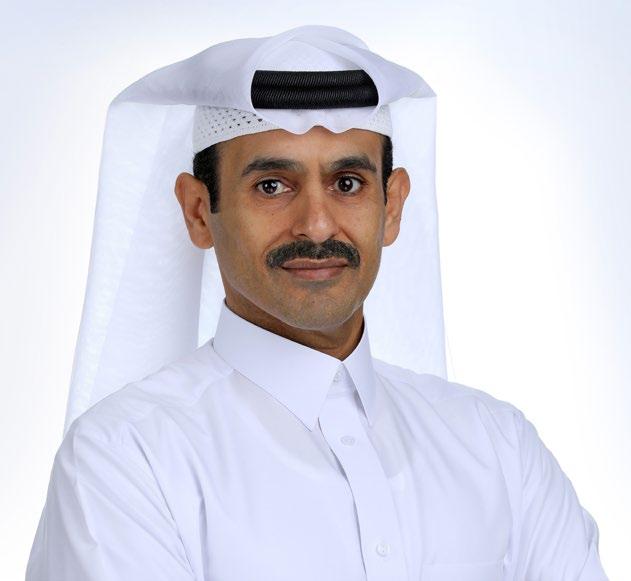
Saad Sherida Al-Kaabi
• Group Chief Sustainability & ESG Officer
Company: ADNOC Group
Established in: 1971 Headquarters: U.A.E. ADNOC’s allocation for decarbonization projects, including carbon capture, electrification, new CO2 absorption technology, hydrogen, and renewables increased from $15 billion to $23 billion in early 2024. The company also increased its carbon capture capacity target to 10 million tonnes per year by 2030, up from the previous target of five million tonnes. It also finalized its take on two major carbon capture, utilization, and storage projects with a combined capacity to capture and permanently store 2.9 million tonnes per annum of CO2. In July 2024, ADNOC signed a $3 billion green financing agreement with the Japan Bank for International Cooperation (JBIC).
• CEO
Company: Crescent Petroleum
Established in: 1971 Headquarters: U.A.E.
In November 2023, Crescent Petroleum became a signatory for the “Aiming
for Zero Methane Emissions” initiative, pledging to achieve near-zero methane emissions by 2030. The initiative was launched by the Oil and Gas Climate Initiative. Crescent Petroleum has developed a new sustainability maturity model to manage future material sustainability areas, including energy and water use, biodiversity, green procurement and value chain, archaeology and heritage, and sustainability-related governance. In 2022, it recycled 90% of its hazardous waste and reduced total flared hydrocarbons by 31% compared to 2021.
• Group CEO
Company: ENOC Group
Established in: 1993
Headquarters: U.A.E.
In December 2023, the ENOC Group signed an MoU with the Marubeni Corporation in a bid to provide all clients in MENA with sustainable aviation fuel by 2030. ENOC achieved a 17% reduction in its greenhouse gas emission intensity between 2014 and 2023. The group has also nearly tripled its renewable energy generation capacity from 2,660 MWh to 8,568 MWh in the last five years, saving a total of 29,919 MWh.

Riyadh International Convention & Exhibition Center
Riyadh, K.S.A.
• December 18th & 19th, 2024 •
• CEO Company: NEOM
Established in: 2019
Headquarters: Saudi Arabia
In February 2024, NEOM established a joint venture with the Tabuk Fisheries Company. Topian Aquaculture will produce 600,000 tons of fish products per year by 2030. It will include a hatchery with a planned capacity of 42 million fingerlings per year and marine pen production facilities. In April 2024, scientists at the King Abdullah University of Science and Technology (KAUST) began work on the KAUST Coral Restoration Initiative’s first nursery. The nursery is set to have a production capacity of 40,000 corals per year. A secondary facility with a capacity of 400,000 corals per year is anticipated to be completed by December 2025.
• Group CEO
Company: Aldar Properties
Established in: 2005 Headquarters: U.A.E.
In 2023, Aldar Properties joined the global coalition of corporations in the Race to Zero, with the launch of its own 2050 Net Zero Plan. In the same year, it avoided 13% of embodied carbon emissions across 27 projects, recycled 87.5% of its construction waste, and neutralized 100% of its Scope 2 emissions through clean energy certificates. In May 2024, Aldar Investment Properties, a subsidiary of Aldar Properties, issued its second $500 million green sukuk as part of its $2 billion Trust Certificate Issue Programme.
• Managing Director
Company: DAMAC Group
Established in: 1982 Headquarters: U.A.E.
DAMAC’S official ESG strategy encompasses five core pillars:

environment, social, governance, integration and implementation, and continuous improvement. DAMAC aims to minimize environmental impacts by enhancing energy efficiency and conservation and promoting environmental consciousness. In December 2023, DAMAC Properties announced DAMAC Lagoons, the U.A.E.’s first pre-certified LEED Platinum community development themed around eight key sustainability principles.
• Chairman & CEO
Company: SEE Holding
Established in: 2003
Headquarters: U.A.E.
SEE Holding operates through three divisions: SEE Solutions, SEE Developers, and SEE Engineering. Its portfolio includes The Sustainable City, Diamond Developers, Tadweer, and City Solar. In December 2023, SEE Holding and EnerTech announced plans to develop a sustainable city in Kuwait with a
16MWp solar energy system generating 100% of the city’s energy requirements, and 20% surplus. In 2023, SEE Holding collaborated with Biosphere 3, a Chinese service and solution platform to offer comprehensive low-carbon solutions for buildings, parks, and communities.
• Acting Group CEO
Company: ROSHN Group
Established in: 2020
Headquarters: Saudi Arabia
In April 2024, ROSHN Group, a PIFowned giga-project, signed a pledge at the World Economic Forum. The initiative, which is led by the Ministry of Economy and Planning, aims to accelerate Saudi Arabia’s business sector adoption of sustainability. In the same month, ROSHN signed an MoU with Cisco to explore IoT technology for smart buildings. In January 2024, ROSHN signed an MoU with EVIQ to develop EV infrastructure, launching Riyadh’s first public high-speed EV chargers at the ROSHN Front.
• Group Chief Environment & Sustainability Officer
Company: Red Sea Global
Established in: 2018
Headquarters: Saudi Arabia
In 2023, Red Sea Global installed 760,500 solar panels across five solar farms which generated 71,600 MWh. It also avoided 46,350 tons of CO2 emissions and enabled the potential reach of 3,000 local farms through its TAMALA project. In the same year, it entered into a 25-year concession agreement with Électricité de France and Masdar on a multi-utilities infrastructure facility that will service AMAALA. The company also has an offgrid charging infrastructure operator, with 150 electric vehicle charging stations and 82 electric vehicles. In January 2024, Red Sea Global became the first Saudi company to use only sustainable fuels in all its supply chain vehicles.
• Founder & Chairman
Company: Sobha Realty
Established in: 1976 Headquarters: U.A.E.
Sobha Realty has several sustainability strategies in play, such as net zero programs, green building certification programs, renewable energy adoption, waste management, and low-carbon materials. The group recently installed 376 KWp of solar PV in its car park to reduce about 6,500 tons of CO2 emissions across its operations. The company aims to reach net zero by 2050.
• Cofounder & Chairman
Company: BINGHATTI
Established in: 2008 Headquarters: U.A.E.
Binghatti Developers has been implementing its In-House Green Building Certification Policy since 2014, which focuses on achieving certifications for all their projects in the U.A.E. Between January 2023 and October 2024, the company reduced its annual energy cost by 20%. Among the measures that the company adopts to ensure sustainability
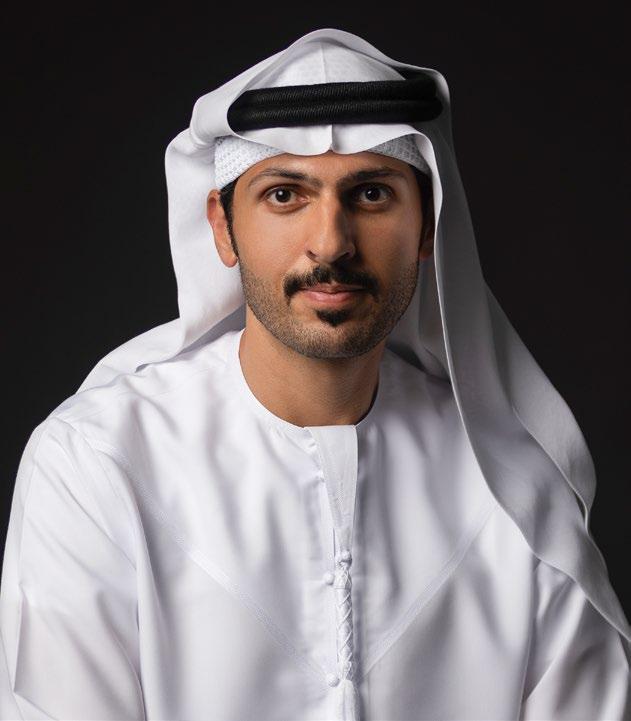
in its projects are the use of high albedo materials for roofing to reduce heat effect, eco-friendly and low-emitting materials for construction, efficient HVAC and lighting controls and systems, and recycling.
• CEO; Co-CEO
Company: Hassan Allam Holding
Established in: 1936 Headquarters: Egypt
In May 2024, Hassan Allam Utilities signed a land access agreement with Infinity Power, and Masdar, for a 10 GW mega wind project with the Egyptian Government valued at over $10 billion. The agreement gives the companies access to a 3,025 km2 area, allowing them to conduct development studies to progress the project. The project will cut carbon emissions by 23.8 million tonnes a year—equivalent to 9% of Egypt’s current carbon footprint. In July 2024, Hassan Allam Utilities, bp,
Masdar, and Infinity Power signed a joint development agreement to commence studies for a multi-phase green hydrogen project in Egypt.
• CEO
Company: El Gouna
Established in: 1989 Headquarters: Egypt
Since November 2021, El Gouna has planted 2000 mangrove trees in the city. It has seven sewage treatment plants, each producing up to 3,000 cubic meters of irrigation water. Its recycling plant achieves a 96% efficiency in handling various waste types, including solid waste, and recycles plastic to create new plastic bags. In 2023, El Gouna’s total energy consumption was 161.7 million kilowatts hours, 9% of which was powered by solar energy. In 2022, El Gouna also introduced the BRITA water filtration system across its hotels to reduce the use of single-use plastics, which saves 115,000 plastic bottles per year.
• Group CEO
Company: e&
Established in: 1976
Headquarters: U.A.E.
In December 2023, e& unveiled its Innovation Hub for Power Solutions in collaboration with the GCC Sustainability Alliance. This involves the participation of 39 telecom operators from 30 countries and aims to aid in the decarbonization of the telecom industry. e& enterprise launched Sustainability as a Service in 2023 and partnered with fintech platform Fils in January 2024 to provide customers with information on carbon emissions per transaction, and to give them the option to offset their carbon footprint. In 2023, e& recycled 27% of the 1,016.7 tonnes of non-hazardous waste it produced, and reduced its water usage by 3% compared to 2022.
• Group CEO
Company: stc Group
Established in: 1998
Headquarters: Saudi Arabia
In 2023, the stc Group implemented power-saving technologies using AI, leading to a 13% recorded decrease in energy consumption across its 4G and 5G networks. Its Renewable Energy Pilot Project has been ongoing since 2021. It aims to install solar PV systems on existing infrastructure across 18 sites to reduce over 8,000 metric tons of CO₂ emissions per year and is scheduled to be completed in 2024. In April 2024, the stc Group joined the “KSA Sustainability Champions” program, a knowledge transfer and partnership initiative by Saudi Arabia’s Ministry of Economy and Planning launched at the World Economic Forum Special Meeting in Riyadh, where the group signed a pledge that commits to net-zero by 2060 or earlier.

• Vice Chairman & Group CEO
Company: Zain Group
Established in: 1983 Headquarters: Kuwait
In 2023, Zain Bahrain began deploying solar and hybrid technologies. In February 2023, Zain Jordan completed the transition to decarbonized grids for 75% of its sites, resulting in a 74% decrease in CO₂ emissions year on year, with a target of 84% for 2024. In August 2023, Zain KSA, alongside Red Sea Global, unveiled a zero-carbon 5G network at the Six Senses Southern Dunes resort. This will be powered by 100% renewable energy from 760,000 solar panels.
• Group CEO
Company: Ooredoo Group
Established in: 1987 Headquarters: Qatar
In 2023, the Ooredoo Group’s direct and indirect greenhouse gas emissions totaled 712,380 tons of carbon dioxide equivalent, a 4.5% decrease compared
to 2022. In the same year, Ooredoo Qatar launched a smart waste management solution in collaboration with Seashore. In September 2023, the group opened its new headquarters in the Maldives incorporating several environmentally sustainable features to minimize heat transmission and reduce power consumption. In March 2024, Ooredoo signed an MoU with Nokia to upgrade industry standards in ESG, energy efficiency, and circular economy.
• CEO
Company: Beyon
Established in: 1981 Headquarters: Bahrain
In May 2023, Beyon completed and activated phase 2 of the solar park at Beyon Data Oasis, which generates 1.8GWh of clean energy every year. The data center at Beyon Data Oasis runs entirely on clean solar power. Beyon’s Solar Park Phase 1 and 2 will generate 3.6GWh of clean energy leading to a carbon footprint saving of over 2,000 tonnes annually. It plans to implement the third phase of this project, which will be located in Hamala, to reach a total clean energy production of 6GWh per year.
• CEO Company: du
Established in: 2005 Headquarters: U.A.E.
In 2023, du launched the Solar on Tower initiative, installing solar panels on network towers across 60 sites in its network. Each site saves 26.6 MWh of energy per year (a total carbon footprint reduction of 11 tCO2 per year). The company plans to expand this to 270 sites by the end of 2024. By the end of 2023, du had 138 sites running completely on solar panels, helping save 445tCO2 per year and diesel savings of approximately 1.4 million liters per year. This equates to a total carbon footprint reduction of 3,714 tCO2 per year). du plans to install an additional 100 solar sites planned in 2024.
• CEO Company: Omantel
Established in: 1970
Headquarters: Oman
In 2023, Omantel introduced its sustainable finance framework. It also decreased its scope 1 emissions by 31% and scope 2 emissions by 26% compared to 2022 following the sale of 2,519 of its tower sites. The company generated over a million kw/hr of solar energy in 2023 compared to 962,780 kw/ hr in 2022. Its reliance on non-renewable energy for electricity has decreased by 27.1% since 2022.
• Regional President, Central and Eastern Europe, Middle East and Africa Company: Visa
Established in: 1958
Headquarters: Global: U.S.
Regional: U.A.E.
Visa unveiled the results of its ‘2023 Sustainable Commerce’ study, in partnership with Emirates NatureWWF, during COP28. In November 2023, Visa, Ecolytiq, and Mashreq launched the Eco Benefits Bundle, a climate banking platform. Emirates Nature-WWF also received a $250,000 grant from the Visa Foundation in May

2023, to support climate action, green economy and market research, and food and water security in the U.A.E., as well as investing in intercropping and traditional farming methods.
• Chairman of Board of Trustees; Founder of Humansoft Holding
Company: American University of Middle East (AUM)
Established in: 1991
Headquarters: Kuwait
In October 2023, The American University of the Middle East (AUM), a subsidiary of HUMANSOFT, celebrated World Sustainability Day by hosting a tree-planting event, expanding their existing green space of over 700 trees. The campus, which follows a car-free policy and offers electric shuttles, also completed the Laserfiche cloud project in September 2023, advancing
Patrick Johansson
their zero-paper strategy through the automation of forms.
• Senior Vice President and Head of Market Area Middle East & Africa
Company: Ericsson Established in: 1876
Headquarters: Global: Sweden
Regional: Saudi Arabia
Ericsson has recycled over 10,000 metric tons across more than 30 countries in the Middle East and Africa since 2012. Ericsson and du signed a partnership agreement in 2023 to offer the Ericsson Connected Recycling platform in the U.A.E. In April 2023, Ericsson teamed up with e& Egypt to enhance its network’s remote management system by implementing the Ericsson Smart Connected Site solution. This helped diesel generators run more efficiently, saving up to 40% on fuel and reducing carbon emissions.
• Group Chairman & CEO
Company: DP World
Established in: 2005 Headquarters: U.A.E.
As of 2023, 60% of DP World’s electricity consumption came from renewable sources. It aims to increase this to 70% by 2030 and 100% by 2040. In February 2024, DP World signed a partnership agreement with Masdar, to implement the widespread adoption of renewable energy and battery energy storage systems across its global supply chain and operations in the Middle East and Africa. In April 2024, DP World became the first company globally to adopt and disclose a Sustainable Development Impact Disclosure. In August 2024, it secured validation from the Science Based Targets Initiative for its commitment to reduce its carbon footprint. DP World has committed to reducing its scope 1 greenhouse gas emissions by 42%, scope 2 emissions by 62.2%, and scope 3 emissions by 28% by 2030 from a 2022 base year.
• Acting Chief Sustainability Officer; CEO
Company: AD Ports Group; Abu Dhabi Maritime
Established in: 2006; 2020 Headquarters: U.A.E.
In 2023, the AD Ports Group partnered with environmental technology producer Archireef to test and install Eco Seawall Panels along 75 square meters of quay walls at the Al Aliah Ferry Terminal, Saadiyat Marina and Ferry Terminal in Abu Dhabi. The group also has five solar photovoltaic projects in the pipeline to mitigate up to 5,000 metric tonnes of CO2 annually. In 2023, the group expanded its seawater quality monitoring program by adding four monitoring stations near port facilities in the U.A.E. to reach a total of seven. The
Saif Al Mheiri
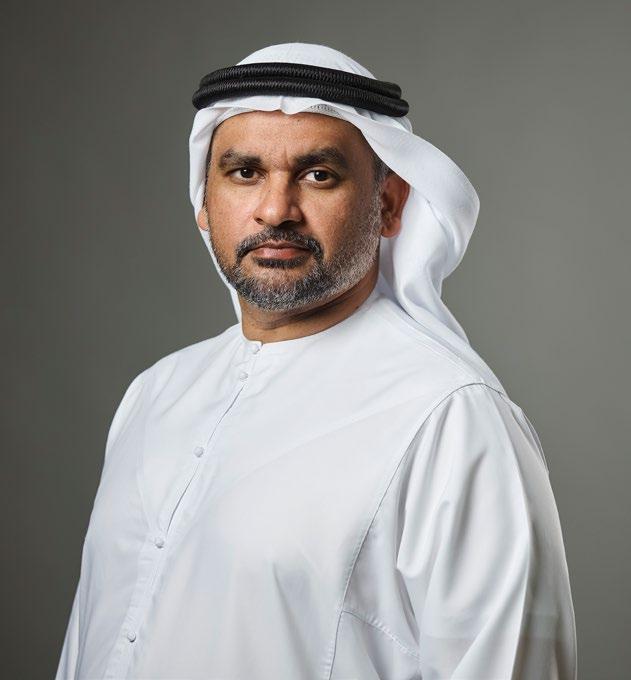
stations can assess water quality every 15 minutes and record 100% compliance with standards for water pH, turbidity, and dissolved oxygen levels.
• Vice Chairman
Company: Agility
Established in: 1979
Headquarters: Kuwait
Two of Agility’s three largest businesses—Menzies Aviation and Tristar— account for roughly 74% of Agility’s 2023 revenue and are committed to net zero by 2045 and 2050, respectively. Menzies, which provides in-plane fueling and other ground services for commercial aviation, aims to convert 25% of its global motorized ground support equipment to electric power by 2025. Fuel logistics provider Tristar has expanded its investment in solar energy at its Dubai headquarters, boosting capacity to nearly onemegawatt hour and eliminating emissions of approximately 650 tons of
CO2 equivalent annually. Tristar also commissioned the first hybrid bunker barge in the U.A.E.
• Group CEO
Company: Asyad Group
Established in: 2016
Headquarters: Oman
In 2023, the Asyad Group achieved a 6% emission reduction in its maritime and ferry operations. It also continued the use of biofuel in its bus services. The company also installed measures and tracking tools for the complexity of its operations in its arm Asyad Shipping. These will be used to measure greenhouse gas emissions and biodiversity solutions under the sea by installing emission sensors and water ballast systems. In May 2024, the group signed a collaboration program with wave energy technology company HAVKRAFT to harness Oman’s marine landscapes for wave power.
• CEO
Company: Nakilat
Established in: 2004 Headquarters: Qatar
In January 2024, Nakilat announced a strategic shipping expansion with Hyundai Samho Heavy Industries for the construction of six gas vessels. The new LNG carriers and LPG carriers will embody the latest technologies, showcasing advanced environmentally friendly and efficient propulsion systems through fuel-saving devices. In 2023, Nakilat reduced its greenhouse gas emissions intensity, recording 1.03 TCO₂/ Nm3 compared to 1.07 TCO₂/Nm3 in 2022.
• CEO
Company: National Shipping Company of Saudi Arabia (Bahri)
Established in: 1978
Headquarters: Saudi Arabia
In 2023, the intensity of Bahri’s direct scope 1 greenhouse gas emissions declined by 7.2% compared to 2022. It also installed and commissioned SMARTShip systems on 16 additional vessels, taking the total to 58 vessels. Bahri had a fleet of 88 owned vessels, 16 vessels under a lease contract, and one floating desalination barge, as of June 2024.
• CEO
Company: Etihad Rail
Established in: 2009 Headquarters: U.A.E.
In March 2024, Etihad Rail announced an agreement with BEEAH Tandeef, a subsidiary of the BEEAH Group, to manage Etihad Rail’s sites in an environmentally responsible manner. In August 2024, Etihad Rail launched its Sustainable Finance Framework in relation to clean transportation, green buildings, and pollution prevention and control.
• Group CEO
Company: Milaha Established in: 1957 Headquarters: Qatar
In 2023, Milaha undertook several energy efficiency projects, including cleaning

the hulls of its fleet and coating them with anti-fouling paint to reduce fuel consumption, installing real-time greenhouse gas emissions tracking of container ships, and changing its waste management practices. In 2023, Milaha also signed MoUs and deals with Oracle and Google Cloud to accelerate its digital transformation strategy, enhance its data, and optimize its use of cloud technologies.
• Group CEO
Company: GWC
Established in: 2004
Headquarters: Qatar
In April 2024, GWC launched a food waste composting initiative to reduce the overall waste generated by its operations. In 2023, the company reduced its greenhouse gas emissions by 1%, compared to 2022. It has a sewage treatment plant at the 500,000 sqm Bu Sulba Warehousing Park, which generated 156,773 m3 of water for irrigation and saved 20% of water consumption in 2023 compared to 2022. In September 2024, GWC joined the UN Global Compact (UNGC) to promote responsible
business practices and Sustainable Development Goals.
• Managing Director - IMEA
• Managing Director, APM Terminals
Bahrain
Company: A.P. Moller-Maersk
Established in: 1904
Headquarters: Global: Denmark
Regional: Bahrain
In September 2023, on a global level, the company launched Laura Maersk, the world’s first container vessel capable of sailing on green methanol. In July 2024, an MoU was signed between the Bahraini Ministry of Transportation and Telecommunications, the Ministry of Industry and Commerce, and A.P. MollerMaersk to evaluate and establish a ship recycling initiative. In May 2023, Maersk’s APM Terminals Bahrain launched a $10 million solar power project to make the Khalifa Bin Salman Port the first in the region to be fully powered by clean renewable energy. As of September 2024, two zones out of six are completed and commissioned, generating around 1GWh per year.
• Chairman & Chief Executive
Company: Emirates Group
Established in: 1985 Headquarters: U.A.E.
In May 2024, the Emirates Group became an industrial partner of the Aviation Impact Accelerator, based at the University of Cambridge. The partnership marks Emirates’ first $200 million sustainability fund investment for R&D projects focused on reducing the impact of fossil fuels in commercial aviation. In the same month, the group took delivery of sustainable aviation fuel from Shell Aviation to power some of its flights at London Heathrow Airport In the 2023/24 financial year, the airline’s green operating procedures and other initiatives helped reduce fuel burn by more than 48,000 tonnes and carbon emissions by over 151,000 tonnes.
• Group CEO
Company: Etihad Aviation Group
Established in: 2003 Headquarters: U.A.E.
In February 2024, Etihad Airways expanded its Dreamliner fleet to 43 aircraft, after adding three Boeing 787-9 Dreamliners, which are up to 25% more fuel efficient than many other aircraft of their size.
• COO—Middle East, Egypt, & Türkiye
Company: Marriott International
Established in: 1927
Headquarters: Global: U.S. Regional: U.A.E.
In 2023, Marriott International collaborated with Etihad Airways to plant 12,000 mangroves in Jubail Island and plans to reach 24,000 mangroves across the U.A.E. by the end of 2024. In 2023, more than 20 hotels reduced their total food waste by over 130 tonnes by
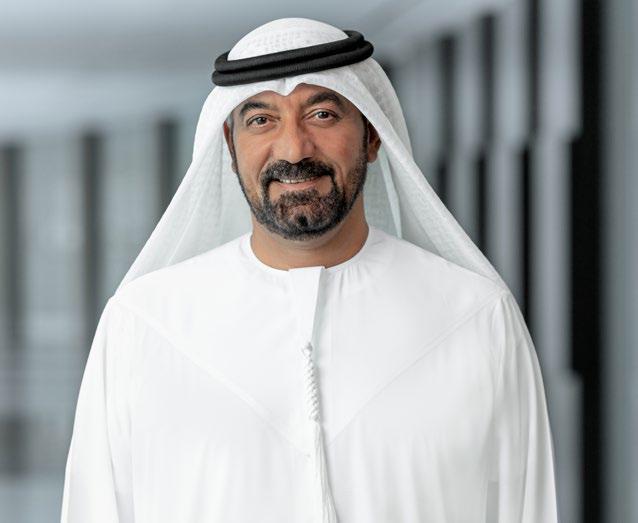
using Winnow AI technology to measure and track food waste for kitchen teams.
• Group CEO
Company: Diriyah Company
Established in: 2022
Headquarters: Saudi Arabia
In May 2024, the Diriyah Company and Hewlett Packard Enterprise signed an MoU to enhance Diriyah’s digital infrastructure to promote sustainability and contribute to developing, restoring, and preserving Diriyah’s heritage sites. The Diriyah Company is regreening Wadi Hanifah and the entire Diriyah development with over 6.5 million trees, plants, and shrubs indigenous to the area. In November 2023, the Diriyah Gate Development Authority also signed an MoU with the Saudi Investment Recycling Company for the handling and processing of all waste within the authority’s jurisdiction.
• Group CEO
Company: Miral
Established in: 2011 Headquarters: U.A.E. As of 2023, Miral’s three hotels on Yas
Island featured nearly 150 rooftop solar panels and 45 electric car chargers. They also use air-to-water technology to produce over 148,200 liters of drinkable water daily. In 2023, Miral and Emerge—a joint venture between Masdar and EDF—signed a 524-kilowatt peak solar photovoltaic project on Yas Bay Waterfront, with 920 solar modules designed to offset 450 tonnes of annual CO2 emissions at the destination.
In the same year, Miral and Emerge inaugurated a seven-megawatt peak solar photovoltaic rooftop project at Warner Bros. World in Abu Dhabi, incorporating 16,000 solar modules, generating up to 64% of its electricity needs.
• Group CEO
Company: Qatar Airways Group
Established in: 1993 Headquarters: Qatar
The Qatar Airways Group pledged to use at least 10% sustainable aviation fuel in its overall jet fuel consumption by 2030. In 2023, the group completed the uptake of 3.9 million liters of sustainable aviation fuel, representing more than 5% of the total fuel uplifted by Qatar Airways for its operations in Amsterdam in the 2023/24 fiscal year. The airline recently joined the First Movers Coalition of the World Economic Forum.
• Vice President of Organizational Culture and Impact
Company: Dubai Holding Entertainment
Established in: 2020
Headquarters: U.A.E.
In December 2023, Dubai Holding Entertainment, alongside its parent company Dubai Holding, collaborated with the Arabian Radio Network and Dubai Eye to launch a Climate Conversations campaign to enhance awareness towards sustainable consumption and production practices, reaching nearly 387,000 listeners. In the same month, the company initiated its Bioplastics Pilot Project to reduce the use of single-use plastics. As part of this initiative, Dubai Holding Entertainment replaced a total of 7,000 single-use plastic cutlery sets at Roxy Cinemas at Dubai Hills Mall and The Green Planet Dubai with bioplastics made from waste materials sourced from palm trees.
• CEO
Company: Ras Al Khaimah Tourism Development Authority (RAKTDA)
Established in: 2011
Headquarters: U.A.E.
In May 2024, RAKTDA, the Ras Al Khaimah Transport Authority, and Skyports signed an MoU to collaboratively design, develop, and operate Ras Al Khaimah’s first electric vertical take-off and landing air taxi ecosystem, with commercial operations set to commence by 2027.
In January 2024, RAKTDA supported the Barjeel Green Building Regulations, launched by RAK Municipality, a flagship initiative under the RAK Energy Efficiency and Renewable Energy Strategy 2040, which aims to save electricity consumption and water consumption by at least 30% and 20%, respectively. Ras Al Khaimah achieved a 29% reduction in greenhouse gas emissions in 2023 compared to 2022.
• Chairman & Founder
Company: FIVE Holdings
Established in: 2013 Headquarters: U.A.E.
In 2022, the FIVE Palm Jumeirah and FIVE Jumeirah Village sourced 100%

renewable electricity and In July 2023 they became the first hotels in the U.A.E. to obtain International Renewable Energy Certificates. In October 2023, FIVE Holdings issued a $350 million green bond on Nasdaq Dubai.
• CEO
Company: Rotana
Established in: 1998 Headquarters: U.A.E.
In 2023, Rotana reduced general waste by 6%, and increased recyclables by 20%. Rotana recycled 60,615 liters of cooking oil across its U.A.E. properties, locally converting it into 57,584 liters of neutral fuels biodiesel. This practice contributed to a reduction of 173,484 kg of CO2. In 2023, Rotana entered into a partnership with Chef’s Eye to help reduce its carbon footprint, which it implemented across its properties in the U.A.E. This resulted in the reduction of 41,246kgs of carbon emissions by the end of Q1 2024.
Methodology: To compile this list, we analyzed questionnaires and sustainability or ESG reports. The ranking was applied separately for every sector. Initiatives were horizontally compared and assessed while giving special weight to some sector-specific initiatives. We only included initiatives by Middle Eastern companies across the globe. We looked at:
• Sustainability or ESG reporting and the degree of transparency and clarity in reporting.
• Reductions or increases in greenhouse gas emissions, waste, water, energy, and other resources.
• Reliance on renewable energy and energy-efficient technology.
• Overall impact of sustainability initiatives both regionally and globally.
For this list, we allowed the companies to nominate either their most senior leader, such as the CEO or Chairman, or their Chief Sustainability Officer.
• SUSTAINABILITY / ENERGY •
Ibrahim Al Zu’bi, Group Chief Sustainability and ESG Officer at ADNOC, is on a journey to make one of MENA’s biggest energy giants one of the world’s most significant sustainability champions. He’s already had a measurable impact.

BY LAYAN ABO SHKIER
WWhile you may think that sustainability is strictly related to preserving the environment and reducing the impact of climate change, the new sustainability equation goes beyond environmental responsibility, integrating economic growth and social impact to create a future where businesses thrive while contributing positively to society and the environment. As the global landscape shifts, organizations are embracing this holistic approach, proving that true sustainability is the key to enduring progress.
Many organizations have set goals to achieve this and have gone the extra mile, hiring chief sustainability officers to help guide them toward this new objective. One of these is the U.A.E.’s ADNOC, whose sustainability goals’ are now the responsibility of Ibrahim Al Zu’bi, the Group Chief Sustainability and ESG Officer at ADNOC.
Describing ADNOC, Al Zu’bi says: “It’s a company that looks at sustainability in a triple bottom line approach—planet, profit, and people—which is the proper definition of sustainability for me.” He explains that when looking at sustainability, one should keep in mind that it’s a “social, economic, and environmental” goal, which aligns perfectly with Al Zu’bi’s “true north.” “It’s a passion,” he says.
Al Zu’bi’s passion for sustainability began very early in his life. “It began in fifth grade, influenced by my late mother, who was a science teacher.” As he grew older, this drive grew further into a “deep concern, passion, and love for the environment and society, as well as the desire to make a positive difference and impact for people, for the planet, and the economy.” In 1997, he graduated from the Jordan University of Science and Technology as a civil engineer in environment and water resources. “I started my professional journey in the late 1990s. My career was
focused on the environmental sustainability issues, even before they became mainstream,” he recalls.
Between 2007 and 2011, Al Zu’bi worked with the government of Dubai as the head of sustainability and special projects at the Knowledge and Human Development Authority. His job was focused on environmental education policies in public and private schools, K-12, and higher education, as well as the educational system-built environment.
In 2011, Al Zu’bi became the chief sustainability officer at Majid Al Futtaim, one of the U.A.E.’s largest conglomerates. In 2017, under Al Zu’bi’s leadership, Majid Al Futtaim committed to becoming net positive in energy and water by 2040, making it the first organization in MENA with such an ambition. In 2019, he also led the company’s ringing the marketopening bell at Nasdaq Dubai to mark the listing of the world’s first benchmark corporate green sukuk and the first green sukuk issued by a corporation in the region, valued at $600 million and with a tenor of ten years. In 2021, Al Zu-bi helped the company achieve the first LEED Platinum Certification for a mall in the region and globally.
“In sustainability in general, the biggest challenge has been navigating the complexities of integrating sustainability into traditional business models.”
Al Zu’bi assumed his current role at ADNOC in October 2022. “It was a turning point in my career,” he recalls. “Even before I joined, sustainability has always been in ADNOC’s DNA,” says Al Zu’bi. “The commitment to sustainability flows from the vision of the founding father of the U.A.E., the late Sheikh Zayed bin Sultan Al Nahyan, who pioneered the protection of the country’s natural ecosystem.”
The ADNOC Group is wholly owned by the Abu Dhabi government and was founded in 1971 by the late Sheikh Zayed bin Sultan Al Nahyan to ensure the responsible use of Abu Dhabi’s oil and gas resources and drive the U.A.E.’s economic development. Today, it is led by Sultan Ahmed Al Jaber, Minister of Industry and Advanced Technology and U.A.E. Special Envoy for Climate, Group MD and CEO of ADNOC, and Chairman of Masdar. It has 16 subsidiaries operating in different sectors, such as
ADNOC Drilling, ADNOC Sour Gas, Borouge, and Fertiglobe.
Throughout the 1970s, ADNOC was capturing associated gas to produce liquefied natural gas and reduce methane emissions. In the 2000s, it began a journey to eliminate flaring and reduce methane emissions through the establishment of its zero routine flaring policy. In 2016, ADNOC established the region’s first commercial-scale carbon capture and storage facility, Al Reyadah, with a capacity to capture up to 800,000 tonnes of CO2 per year. In 2018, it launched the ICV Program focused on building manufacturing capabilities within the U.A.E. to support job creation and socioeconomic development. It launched the $600 million Al Ruwais Waste Heat Recovery project to produce up to 230MW of electricity per day.
In 2020, ADNOC launched its 2030 Sustainability Goals. These goals have been developed since 2020 to include environmental, social, and economic goals, including reducing operational emissions intensity by 25% (against the 2019 baseline), achieving near zero methane emissions in operations, targeting to capture 10 million tonnes of CO2 per year by 2030, which is equivalent to taking over two million internal combustion vehicles off the road. This would make ADNOC one of the largest implementers of carbon capture, utilization, and storage technology in the oil and gas industry in the region. QatarEnergy has plans to capture up to nine million tons of CO2 annually by 2030. Saudi Aramco, ADNOC’s largest regional competitor, also plans to capture 11 million tons of CO2 annually by 2035. Other 2030 goals of ADNOC include planting 10 million mangroves to increase capacity to absorb CO2 and other greenhouse gases to support biodiversity and provide marine life habitat.
In November 2022, ADNOC announced its 2050 net zero ambitions . This plan has since been brought forward to be achieved by 2045. Al Zu’bi says that ADNOC is “very serious” about reaching this “true north.” According to the Climate Action Tracker, as of May 2024, around 145 countries had announced or were considering net zero targets, covering around 90% of global emissions.
To address this challenge, in January 2023 ADNOC allocated $15 billion to invest in decarbonization projects, including carbon capture, electrification, new CO2 absorption technology, hydrogen, and renewables. In September 2023, it took a final investment decision to proceed with a 1.5 million tonnes per year carbon capture, utilization, and storage project, one of the largest carbon capture projects in MENA. This project is forecast to triple its installed carbon capture capacity to 2.3 mtpa. Its initial allocation of $15 billion was increased to $23 billion in January 2024 to further accelerate these plans.

In September 2022, ADNOC closed a $3.8 billion transaction with TAQA , which will help enable the electrification and decarbonization of ADNOC’s offshore production operations. In October 2022— the month when Al Zu’bi joined ADNOC—it set a new upstream methane intensity target of 0.15% by 2025. “Methane is 80 times more harmful than CO2 emissions over 20 years, and we are the second industry responsible for this after the agriculture and food industry,” Al Zu’bi explains.
“As a company, we had different options, but we’ve decided that it’s part of our transformative steps to ensure and make today’s energy cleaner by decarbonizing our operations,” says Al Zu’bi. He explains that ADNOC is decarbonizing its operations through two main pillars, including investing in technological innovation to ensure that its barrel of oil equivalent is one of the lowest carbon intensities in the world. ADNOC’s carbon intensity is approximately seven kilograms of CO2 per barrel of oil equivalent, according to ADNOC’s 2023 Sustainability Report. “While the industry average may be between 14 and
16 KG CO2e/boe, and in some other countries, it’s even higher,” says Al Zu’bi. Backed by its $23 billion allocation to Low Carbon Solutions and International Growth, ADNOC’s international growth strategy focuses on chemicals, gas, LNG, and renewables. “Decarbonizing the energy of today while investing in the energy of tomorrow,” Al Zu’bi stresses.
In December 2022, ADNOC became a shareholder in Masdar, Abu Dhabi’s Future Energy Company, as the company works to boost renewable energy capacity to more than 100GW by 2030 and produce a million tonnes per annum of low-carbon hydrogen. “The U.A.E. in particular is committed to diversifying its energy sources and reducing carbon emissions, which has been driven by both environmental concerns and the desire to secure a sustainable energy future. The country’s leadership has set ambitious goals for renewable energy capacity and carbon reduction, making it a key player in the transition to cleaner energy sources in the Middle East region,” says Dr. Vian Ahmed, Researcher and Professor in the industrial engineering department at the American University of Sharjah.
On October 4, 2024, Masdar announced that it grew its clean energy portfolio and advanced pipeline of clean energy capacity to 31.5GW in 2023, generated more than 26,700GWh of clean energy, and avoided 14 million tonnes of CO2 equivalent, up from 10 million tonnes the previous year. This is the equivalent of removing almost 870,000 cars from the road. “As Masdar’s latest sustainability report highlights, 2023 was a pivotal year as we continued on a path of unprecedented growth, increasing our global clean energy capacity by more than 50%. Leveraging the power of our shareholders, we entered new markets, pioneered clean energy solutions, and played a vital role in supporting the U.A.E.’s climate action leadership,” says Mohamed Jameel Al Ramahi, CEO of Masdar. In May 2023, ADNOC and TAQA announced a project for sustainable water supply to onshore
These are the top five leaders heading the sustainable agenda in oil and gas in MENA.
Amin H. Nasser
Title: President & CEO
Company: Saudi Aramco Headquarters: Saudi Arabia

Saad Sherida Al-Kaabi
Title: Deputy Chairman, President & CEO
Company: QatarEnergy Headquarters: Qatar
Ibrahim Al Zu’bi
Title: Group Chief Sustainability and ESG Officer
Company: ADNOC Group Headquarters: U.A.E
Majid Jafar
Title: CEO
Company: Crescent Petroleum Headquarters: U.A.E
Saif Humaid Al Falasi
Title: Group CEO
Company: ENOC Group Headquarters: U.A.E.
operations worth up to $2.4 billion. Al Zu’bi also highlights the importance of investing in hydrogen, which is an energy carrier that creates no carbon dioxide when used. In November 2021, Sheikh Mohammed Bin Zayed mandated ADNOC to explore potential opportunities in hydrogen to position the U.A.E. as a hydrogen leader. Today, ADNOC is already a producer of over 300 kt per year of hydrogen in its downstream facilities, which is largely used for industrial purposes. It has existing plans to increase hydrogen production to 500 kt per annum, and by 2030, it aims to capture 5% of the global low-carbon hydrogen market.
One of its latest steps in that regard is in September 2024, when it signed a strategic partnership with ExxonMobil Corporation, in which ADNOC will acquire a 35% equity stake in ExxonMobil’s proposed low-carbon hydrogen and ammonia production facility in Baytown, Texas, U.S. The facility, which is anticipated to begin operations in 2029, is expected to be the world’s largest of its kind, capable of producing up to a billion cubic feet daily of low-carbon hydrogen.
Despite all these achievements, Al Zu-bi says there has always been one key challenge. “In sustainability in general, the biggest challenge has been navigating the complexities of integrating sustainability into traditional business models.” He explains that it has been a challenge to convince others that “you can do well by doing good.” However, Al Zu’bi looks at this challenge as an opportunity.
“I think one of the biggest achievements in my career has been successfully embedding sustainability to the core strategies of major organizations.”
Stay connected with our latest business news.

Looking ahead, Al Zu’bi says: “The true north for me doesn’t change. My biggest goal is to drive meaningful change in the way businesses in our region approach sustainability.
“I love my region,” he adds. “I love what I do, and I feel I am responsible for driving the meaningful change.”
Iheb Triki and Mohamed Ali Abid, cofounders of Tunisian water-tech startup Kumulus Water, are revolutionizing access to sustainable clean drinking water by sourcing it from air. With their eyes now set on the Saudi market, they are poised for further expansion across MENA, Europe, and beyond.
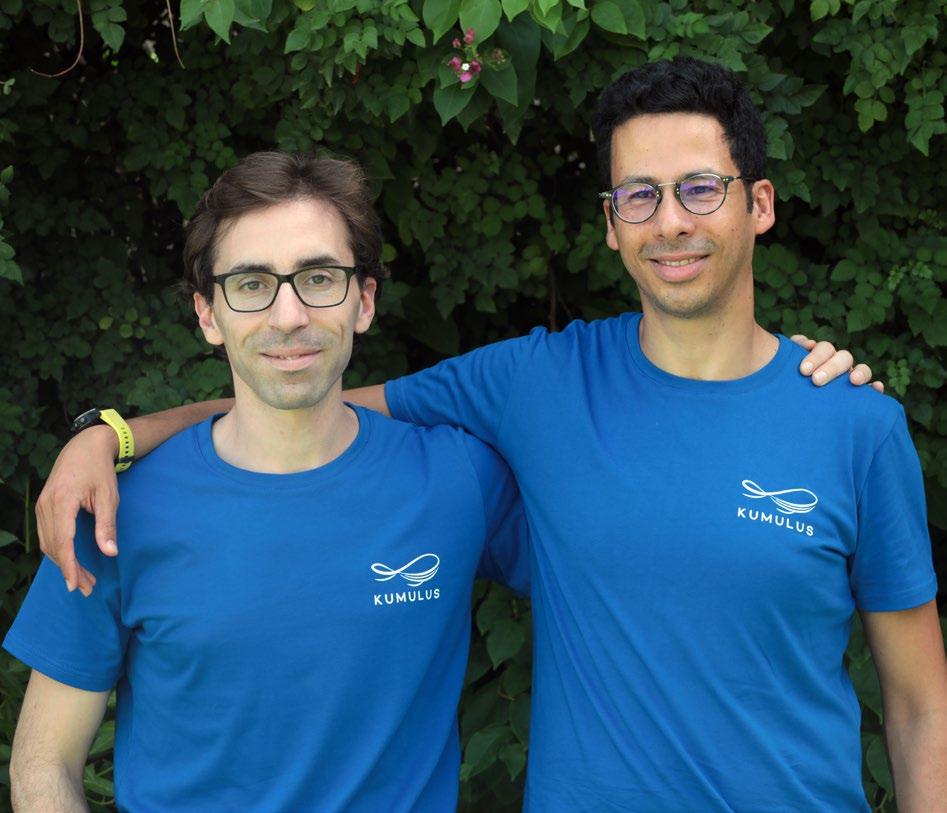
BY RAWAN HASSAN MOHAMMED
BBy 2030, global demand for freshwater is expected to outstrip supply by 40%, and an estimated 1.6 billion people will lack safely managed drinking water, according to the World Economic Forum. In Tunisia alone, there’s an alarming water shortage. According to Project Information Tunisia Water 2024 by the Federal Ministry for Economic Cooperation and Development, there are only 420 cubic meters of water per capita available per year, making it one of the countries with the scarcest water availability in the world.
It was during a trip to the Tunisian desert that Iheb Triki, a private equity investor in renewable energy at the time, noticed the morning dew that covered his car and tent and thought maybe this could be the solution.
“There was water in the air, enough to cover my tent in the deep desert. So I thought, why not harness this in an industrialized way?” he explains.
Between 2015 and 2021, Triki—now CEO of Kumulus Water—worked for Swicorp, a private equity company focused on renewable energy, water, and waste. During this time, he was surprised by two things about the water sector. First, it’s highly centralized, meaning you rely on large water sources (aquifers or desalination plants) followed by distribution systems. “This led me to wonder if a distributed water production model could also be feasible, allowing for water autonomy,” says Triki. The second was the stark contrast between the price and the true value of water.
“A liter of bottled mineral water usually costs 15 or 20 cents, but if you were without drinking water for just three days, you’d be willing to pay hundreds of dollars for it. This discrepancy between value and price is significant,” he adds.
He shared his idea with close friend Mohamed Ali Abid, an alumnus of Ecole Polytechnique (France), who he had known since 2015. “As an engineer and
technology expert, particularly in thermodynamics and motor cooling systems, he was very familiar with these concepts. He immediately said, ‘Yeah, it’s super easy. We can make it happen,’” Triki remembers. They began working on the first proof of concept, building their prototype, and founded Kumulus Water in September 2021, focusing on business-to-business clients. Today, Abid is CTO of Kumulus Water.
In 2020, the total volume of water withdrawals per capita in MENA reached 6.73 cubic meters per inhabitant per year, according to Statista. Despite efforts to provide access to fresh water in the region, there aren’t many hardware companies. “When you’re focused on impact and trying to raise money, it’s much harder if you’re working on hardware compared to software or software as a service. That’s why there are fewer hardware companies,” explains Triki. “One of our strengths at Kumulus is that we’re both Tunisian and French, with Western education but deep roots in MENA.”
“One of our strengths at Kumulus is that we’re both Tunisian and French, with Western education but deep roots in MENA.”
Initially bootstrapped, with the cofounders investing less than $20,000, they established the company in France, with the first affiliate in Tunisia, leveraging the strengths of both regions—large labs, deeper funding pools, and highly skilled experts in Europe.
“The strength of North Africa for us has been the ability to test our technology earlier than in regions like Europe, which are heavily regulated,” adds Triki. This allowed Kumulus to build and CE certify its prototype in just 18 months, achieving this with significantly lower and optimized funding compared to global hardware firms. The first Kumulus was installed in an elementary school in Bazma in June 2023, a rural hamlet in the south of Tunisia where access to drinking water remains limited.
After receiving early support from accelerators, they raised $1 million through a pre-seed round, dilutive, and non-dilutive funding. Both the French and Tunisian governments played a significant role through their grant programs. “In 2023, we completed another seed round, bringing our total funding
to approximately $4 million across both rounds. Our investor base is diverse, with family offices and business angels from the U.S., Egypt, France, Switzerland, Tunisia, Morocco, and the U.A.E.,” says Triki. The cofounders are currently in the process of raising around $5 million in a pre-Series A round to scale up production and sales efforts across Southern Europe and MENA.
Kumulus Water’s flagship machine produces 30 liters of fresh water per day from the air. It is primarily aimed at regions with a higher need for drinking water, particularly in dry climates, including MENA and parts of southern Europe where water scarcity is a pressing issue.
“We’ve seen firsthand how climate change has intensified the water crisis, especially in North Africa. The situation is dire, and the need for innovative solutions is more critical than ever. This is where companies like Kumulus Water come in—they represent a beacon of hope,” says Ghita Zniber, Kalys Ventures Cofounding Partner and VC Investor, “Kumulus’ innovative atmospheric water generation technology provides a sustainable solution, essential in regions with unreliable water sources. Their dual impact reduces water consumption and plastic waste by minimizing reliance on bottled water. This addresses both water scarcity and environmental sustainability challenges.”
maintenance, ensuring better upkeep and performance.”
Relying on IoT and data technologies, the Kumulus machine is connected to a cloud to allow remote monitoring, enabling them to gather data in real time and ensure a smooth operation, according to Abid, allowing them to reduce unnecessary pre-emptive maintenance and extend the lifespan of water filters. “Imagine hundreds of thousands of these machines across MENA—Kuwait, the U.A.E., Saudi Arabia, Morocco—each gathering data every 10 minutes. All this data is then collected and processed by a central system,” says Triki. “For instance, if a specific weather condition in Saudi Arabia produces

Initially receiving positive reactions in the region, Kumulus Water’s technology uses a thermal approach, whereby they cool the air below the dew point to collect humidity. “Collecting water is just the first step—most of our work focuses on ensuring the water is drinkable and complies with French, Tunisian, and European regulations. We’ve also invested in improving the taste and mineralization of the water, as users in these regions are accustomed to bottled mineral water,” explains Abid. “Additionally, we’ve developed the machine to be autonomous and connected, which enables predictive

optimal results, the system will replicate this solution when the same condition arises in Morocco. This is where big data and artificial intelligence come into play, and we’ve already submitted patents related to this technology.”
“Morocco and Tunisia are emerging as significant hubs for deep tech and innovation, providing fertile ground for solutions addressing the Arab world’s most urgent issues, from water scarcity to energy efficiency. Investing in companies like Kumulus isn’t just about addressing the current crisis; it’s about building resilient systems for future generations. For us, investing in water innovation is a commitment to the future of humanity,” adds Ghita Zniber.
Kumulus is currently part of two major accelerators: the Mega Green Accelerator, sponsored by PepsiCo and SABIC, and the Saudi Water Innovation Center, which is linked to the Saudi Water Authority. “We’re very serious about expanding in the Middle East. We’re in the third month of acceleration and in discussions regarding the necessary authorizations and certifications,” says Triki. “Since this is deep tech—new technology that doesn’t rely on seawater or wells—it’s essential to have the right certifications in place.” In addition to the CE marking, Kumulus has achieved this in Spain, and Tunisia, which makes the process smoother when engaging with authorities in Saudi Arabia.
“We approach things from an energy perspective and see a significant demand for such technologies across industries, including larger hotels, real estate projects, and even cities. That’s the direction we’re headed,” says Triki, stressing the strength of computers on the deep tech side. “What sets us apart from many startups is that we don’t rely on purchasing existing technology or subcontracting it. We control our own technology. We’ve written the code for the embedded systems and designed the machines ourselves.”
The hotter and more humid the air, the higher the water production rate the Kumulus has. “Based on our experience, we’ve successfully used our product in the Tunisian desert, where the air is extremely dry. While the production rate is lower in such conditions, it’s not zero,” explains Abid. “What we’re doing with our product is capturing the water that already exists in the air rather than creating it from scratch.”
In 2023, with a focus on long-term sustainability, Kumulus produced 260,000 liters of water, removed 8,000kg of CO2, and eliminated 5,000kg of plastic waste. As part of its social responsibility efforts in underserved areas, the startup has partnered with key organizations, including Sanofi, the Emirates Red Crescent, and the UK Embassy, to distribute water machines to schools. This initiative has provided over 2,000 students across eight schools in Tunisia with access to clean drinking water.
As they expand into Saudi Arabia, the cofounders are aiming to partner with universities to co-develop their intellectual property. “We want to create engineering programs because we have the expertise and we’re eager to collaborate with leading laboratories,” explains Triki. With a focus on local manufacturing, they aim to drive job creation and foster value. “By developing local IP, we’re positioning this as a strategic advantage for the future.”
“Our goal for 2025 is to secure the necessary certifications and establish a presence in Saudi
Arabia. We’re also in advanced discussions with the King Abdullah University of Science and Technology (KAUST), where beyond the acceleration program, we aim to collaborate on joint projects,” adds Triki. Kumulus began generating revenue in 2023 and has reached a strong level of contractual value by selling machines and securing five-year maintenance contracts. “As of September 2024, after about a year of sales, we have around 1,000 to 1,500 people drinking our water daily,” revealed Triki. “In less than a year, we’re approaching $1 million in contractual value. The year isn’t over yet, but we’re already nearing that milestone.”
With no plans for an IPO for at least three to four years, the cofounders aim to continue building momentum in the region. “There are many aspects to success. I always hesitate to call ourselves ‘successful’ outright, as I view it more as a journey marked by key milestones,” says Triki. “ Today, we’re competing with international companies from the U.S., Spain, and India, with a product that was entirely developed in-house. That, in itself, is a success. We’re staying focused on the path ahead.”
“This would stand as a powerful testament to how technology can serve humanity and how human ingenuity can help us overcome natural challenges.”
Looking ahead, the cofounders don’t foresee much improvement in the region’s water resources. MENA ranks among the most water-scarce regions globally, with 12 of the 17 most water-stressed countries in the world located in MENA. “With global warming, it’s only going to get worse, and the current solutions are, sadly, more polluting,” stresses Triki. “In North Africa, I foresee more frequent water cuts and the gap between the value of water and its price will increase. As resources dwindle, the cost of drinking water will increase.”
“We envision that over the next decade, air-towater generators will become widespread—installed in homes, schools, factories, and hotels, much like PV panels are today,” adds the CEO. “This would stand as a powerful testament to how technology can serve humanity and how human ingenuity can help us overcome natural challenges.”

The extensive agenda delved into pioneering the longevity agenda and healthcare in the digital age.
Under the theme ‘Beyond Boundaries: Advancing Health Towards Longevity,’ the third annual Forbes Middle East Healthcare Leaders Summit, in partnership with PureHealth, the largest healthcare platform in the Middle East, was held from September 19-20 at the St Regis Saadiyat in Abu Dhabi. The event convened over 3,000 leaders, policymakers, and wellness experts to envision a more sustainable and inclusive future in healthcare.
His Excellency Sheikh Nahyan bin Mubarak Al Nahyan, the U.A.E.’s Minister of Tolerance and Coexistence attended the summit, giving a moving speech and handing out awards at a recognition ceremony on day two. Other notable attendees included prominent leaders such
as H.E. Mansoor AlMansoori, Chairman of the Department of Health – Abu Dhabi, H.E. Dr. Noura Khamis Al Ghaithi, Undersecretary of the Department of Health –Abu Dhabi, and H.E. Mubaraka Mubarak Ibrahim, CEO for Artificial Intelligence at Emirates Health Services, along with leaders from globally recognized institutions such as Cleveland Clinic Abu Dhabi, Philips, and Hayat Biotech.
Across two days of discussions, panels, and presentations, participants addressed key healthcare challenges, focusing on public health policy, disease prevention, and the integration of AI and digital health solutions. Topics being discussed include future-ready public health policies, redefining longevity, the potential of stem cells and regenerative medicine,
advancing family and child care, paths to personalized care and disease prevention, achieving new frontiers in precision medicine and drug discovery, fortifying investments for a sustainable healthcare landscape, and cultivating mental, physical, and nutritional harmony.
“This platform is more than just an event—it is a powerful gathering of visionaries, innovators, and decision-makers who are reshaping the landscape of healthcare in the Middle East and beyond. Together, we form a collective force driving change, promoting cooperation, and ensuring that healthcare systems evolve to meet the challenges of tomorrow,” said Khuloud Al Omian, CEO and Editor-in-Chief of Forbes Middle East. “AI, technology, innovations, and more are driving swift changes that won’t wait for us



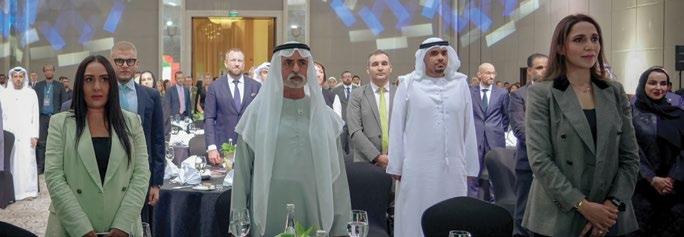






to catch up. Today, we stand at a critical moment in healthcare—one that demands not only innovation but also the awareness and foresight of the leaders gathered here.”
Shaista Asif, Group CEO of PureHealth, said, “At PureHealth, we have long been committed to redefining healthcare; spearheading collaboration and innovation as key drivers of change. We’re happy to have worked with Forbes to deliver this summit for the third year, convening leaders across the healthcare sector to discuss the most critical priorities to achieve a more equitable and sustainable healthcare of the future. We are committed to ongoing partnerships to drive further
action towards Longevity, as we strive for longer, happier, fuller lives for communities in Abu Dhabi, and across the world.”
The summit featured a Healthcare Leaders Arena, a dedicated Insightful Area, and a Zen Zone. A series of engaging workshops offered attendees hands-on experiences on a range of wellness topics, including meditation breathing, the art of incense, and the immersive healing power of sound, while the Health Talks stage showcased emerging voices in the healthcare industry.
Forbes Middle East collaborated with many distinguished partners to bring this important event to life,
including strategic partners, the Abu Dhabi Chamber, the Department of Health – Abu Dhabi, and Emirates Health Services; event partners, Jamjoom Pharma, Hayat Biotech, Magrabi Hospitals & Centers, Viatris, and Hayat National Hospitals; wellness partner, Holistified; gift partners, Innara, Maison Etherique, Wellbeings Holistic Healing, Daima, Touch of Oud, Organic Foods & Café, and No More Bottles UAE; food partners, Amazonas4u, House of Pops, and Barakat; activities partner; Dubai Drums; experience partner, Eventum; entertainment partner, DREAM Dubai; and furniture partners, Fern Event Rentals and Electra.







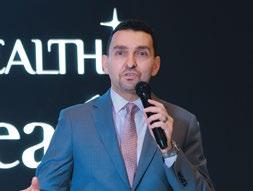



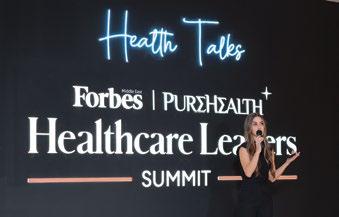















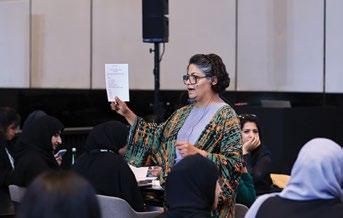
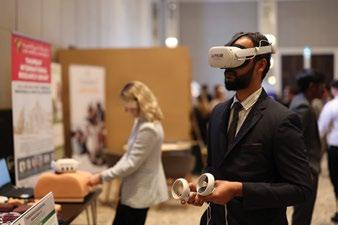
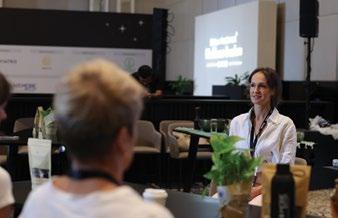



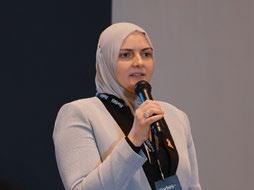


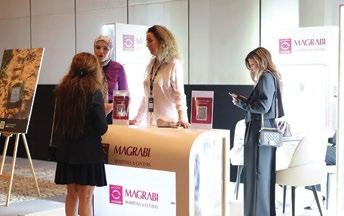

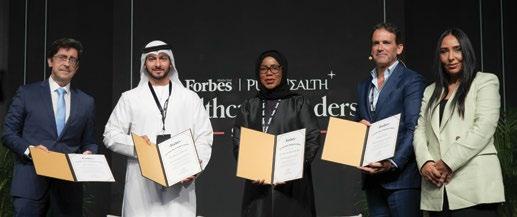





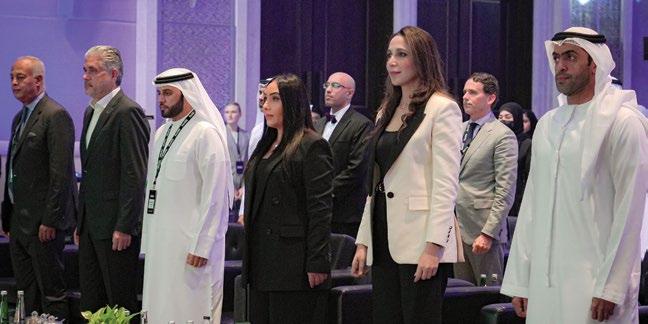

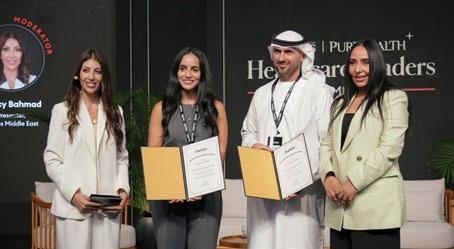




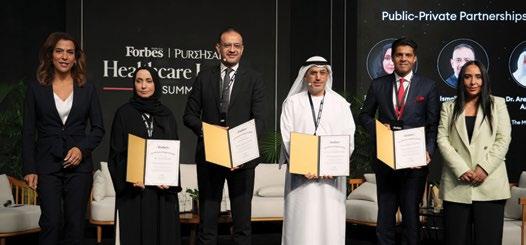
Moderator Ramia Farrage, Senior Producer and Presenter, Forbes Middle East; Dr. Nawal Al Kaabi, Senior Advisor and Head of Research & Development, Hayat Biotech; Ismail Shehada, CEO, Tabuk Pharmaceuticals; Dr Aref Ali Abdulla Al Shehhi, CEO, The Medical Office; Akbar Moideen Thumbay, Vice President, Thumbay Healthcare

“You become responsible, forever, for what you have tamed. You are responsible for your rose.”
—Antoine de St.-Exupéry
“Character—the willingness to accept responsibility for one’s own life—is the source from which selfrespect springs.”
—Joan Didion
“Our remedies oft in ourselves do lie / Which we ascribe to heaven.”
—William Shakespeare
“The man who passes the sentence should swing the sword.”
—George R.R. Martin
“Loss of that privilege, to blame others, unexpectedly stung.”
—Megan Whalen Turner
“A body of men holding themselves accountable to nobody ought not to be trusted by anybody.”
—Thomas Paine
“A person may cause evil to others not only by his actions but by his inaction, and in either case he is justly accountable to them for the injury.”
—John Stuart Mill

“We are indeed formed by traumas that happen to us. But then you must take charge, you must take over.”
—Camille Paglia
“If you are not acting rightly, shun the action itself; if you are, why fear those who wrongly censure you?”
—Epictetus
“Action springs not from thought, but from a readiness for responsibility.”
—Dietrich Bonhoffer
“We think of ourselves now as eaters of the pie instead of makers of the pie. So who makes the pie?”
—David Foster Wallace
“Being responsible sometimes means pissing people off.”
—Colin Powell
“I don’t have a side. I’m responsible for what I say and nothing else.”
—Glenn Greenwald
“Freedom makes a huge requirement of every human being. With freedom comes responsibility. For the person who is unwilling to grow up, the person who does not want to carry his own weight, this is a frightening prospect.”
—Eleanor Roosevelt
“Know the state of your flocks, and put your heart into caring for your herds.”
—Proverbs 27:23

“Each of us has the responsibility of doing our best to bring about human brotherhood.”
—B.C. Forbes


We offer booking services for domestic and international flights to over 2,500 destinations worldwide. Our accommodation offering includes some of the finest hotels, resorts, and hotel apartments in countries across the globe.


In partnership with global providers, we offer private car rental services, available with or without a personal driver.


Our dedicated team specializes in crafting exceptional travel experiences, including honeymoon packages and cruise itineraries, tailored to your preferences. We facilitate the issuance of tourist and medical visas to a variety of soughtafter international destinations.
At Tarteeb Travel & Tourism, we leverage advanced tools to deliver top-notch services and a diverse array of travel packages to distinguished destinations worldwide. We provide comprehensive travel and tourism solutions, including airline tickets, organized tour groups, accommodation, educational and medical tourism, cruises, domestic travel, and visa processing. With our extensive network of relationships and agents across the globe, we make your travel experience both seamless and enjoyable.







